[UPDATED IN NOVEMBER 2024]
Marrakech is a city like no other—chaotic, vibrant, and bursting with life. From its bustling souks and grand palaces to peaceful gardens, this city offers a unique blend of history, culture, and adventure.
Whether you’re already planning a trip to Marrakech or just starting to dream about it, this guide will help you make the most of your visit.
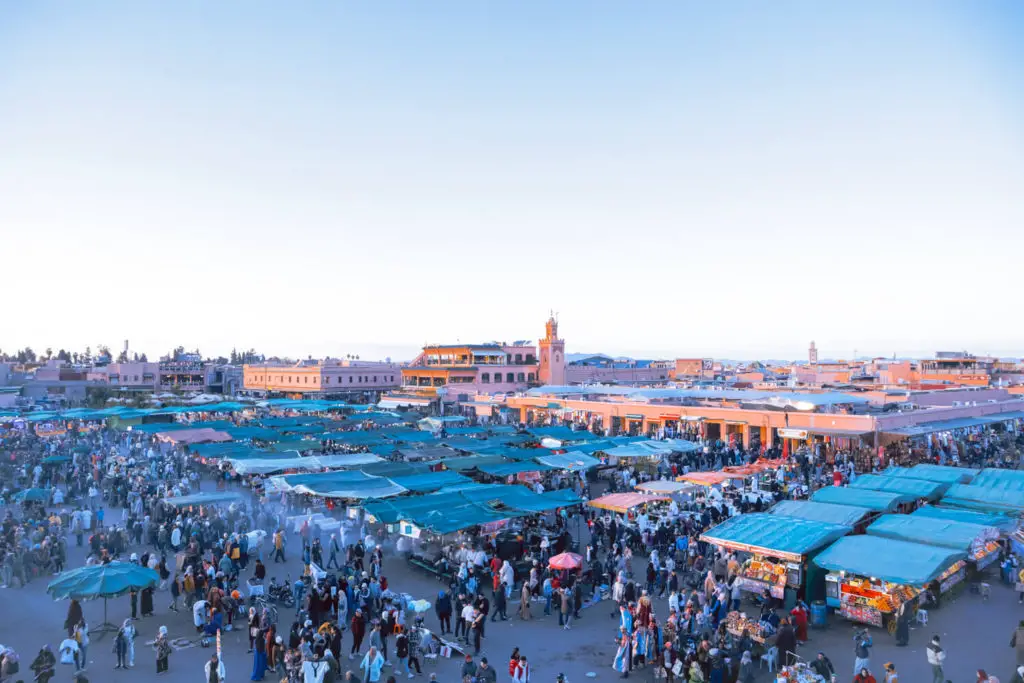
This Marrakech 2 days itinerary covers everything you need to know about the city. You’ll find tips on how to explore the city’s top attractions, navigate its lively streets, and soak in its enchanting atmosphere.
Here’s a more detailed version of what you’ll discover in this guide:
- The best time of year to visit Marrakech.
- How to get to Marrakech and from the airport to the city centre.
- Essential tips for staying safe and getting around.
- Where to stay for a truly authentic Moroccan experience.
- A detailed day-by-day itinerary of what to do in Marrakech in 2 days, including must-see attractions like the Bahia Palace, Jemaa el-Fna, and Jardin Majorelle.
- Suggestions for restaurants, shopping in the souks, and even day trips for those with extra time.
Get ready to dive into the vibrant energy of Marrakech! This guide has everything you need to ensure an unforgettable trip in just two days.
For more tips to plan a stress-free trip, check out +20 things you should know before visiting Marrakech.
Accommodation in Marrakech
You have a lot of accommodation to choose from in Marrakech🥰. In my opinion, the experience of visiting Marrakech is not complete without sleeping in a riad.
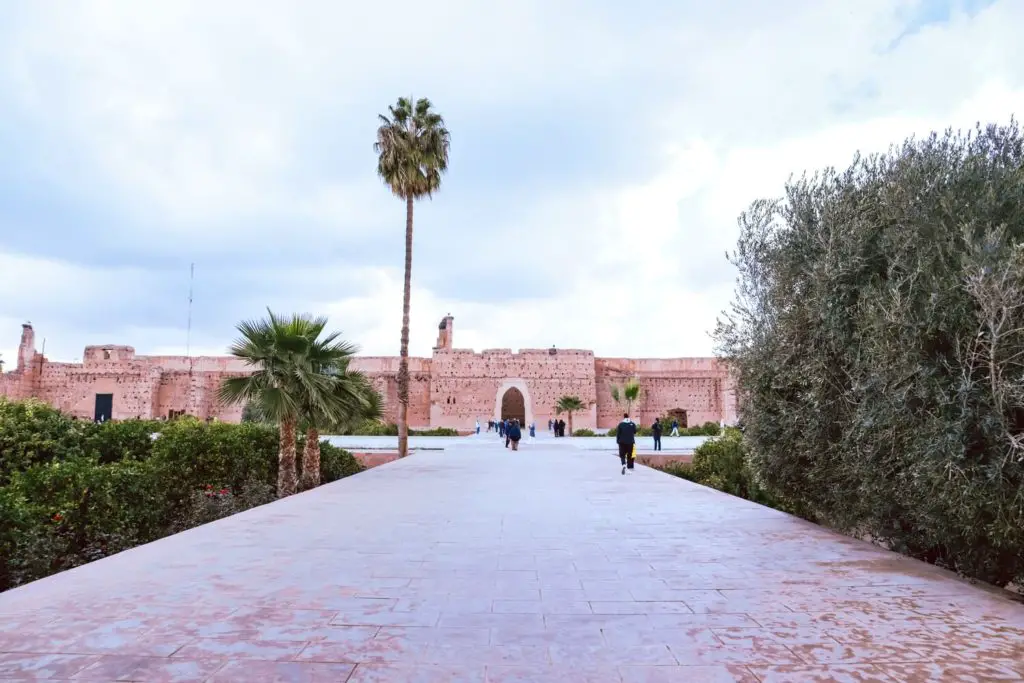
Riads are typical houses that usually have an open inner courtyard. Often, these courtyards even have a pool or a fountain at their centre.
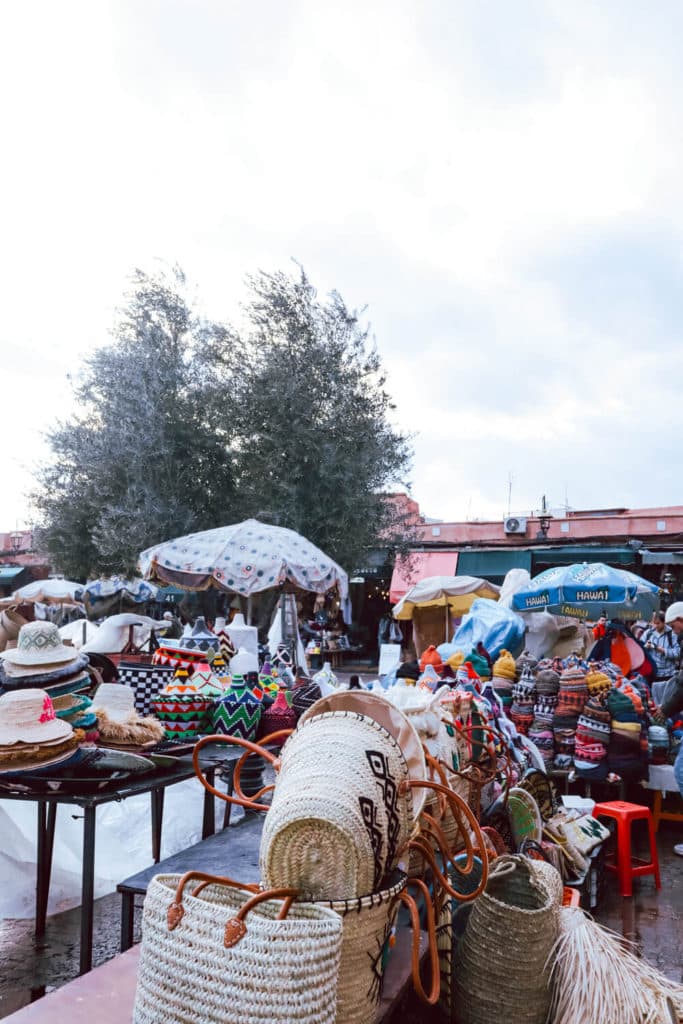
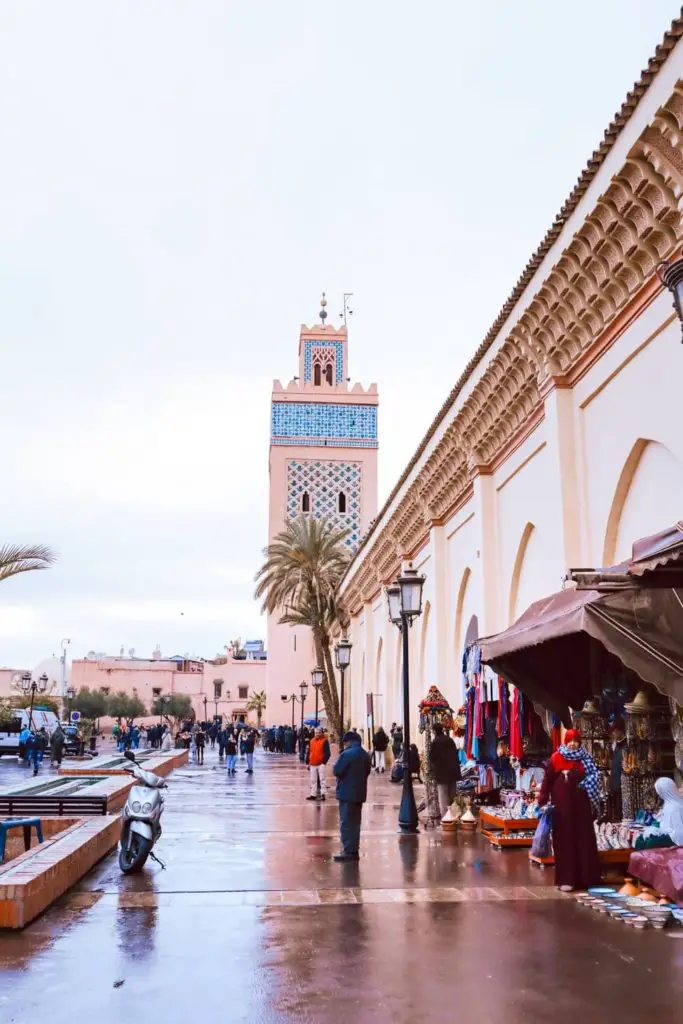
Most of these riads are located inside the medina (the most chaotic part of the city) and there are hundreds of options. I warn, however, that some of these riads may be located in dark alleyways and narrow streets and may not appeal to everyone.
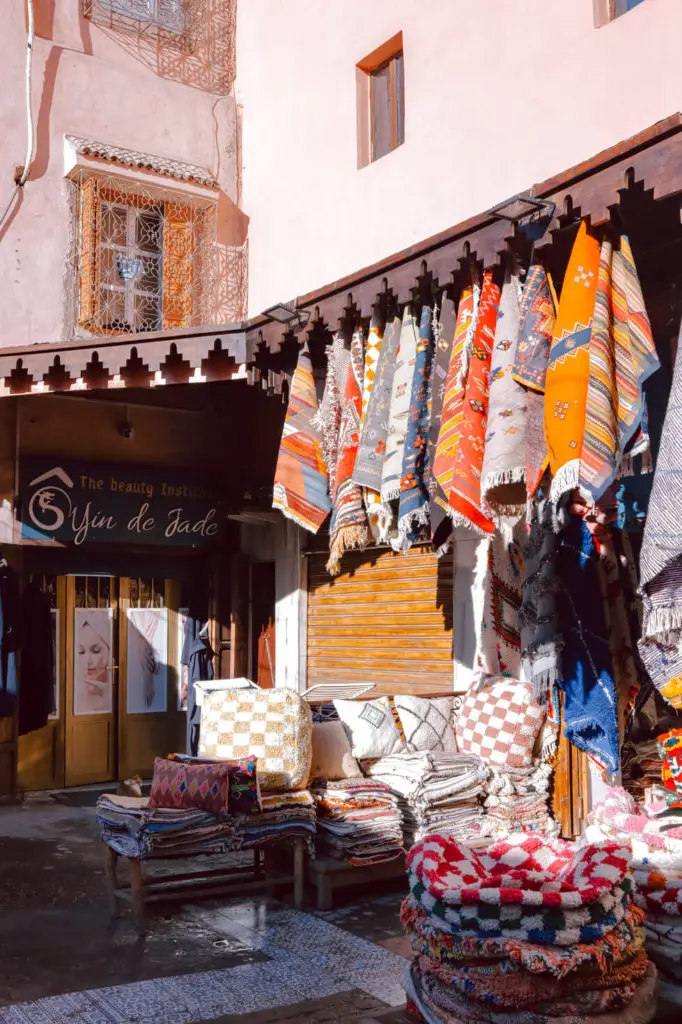
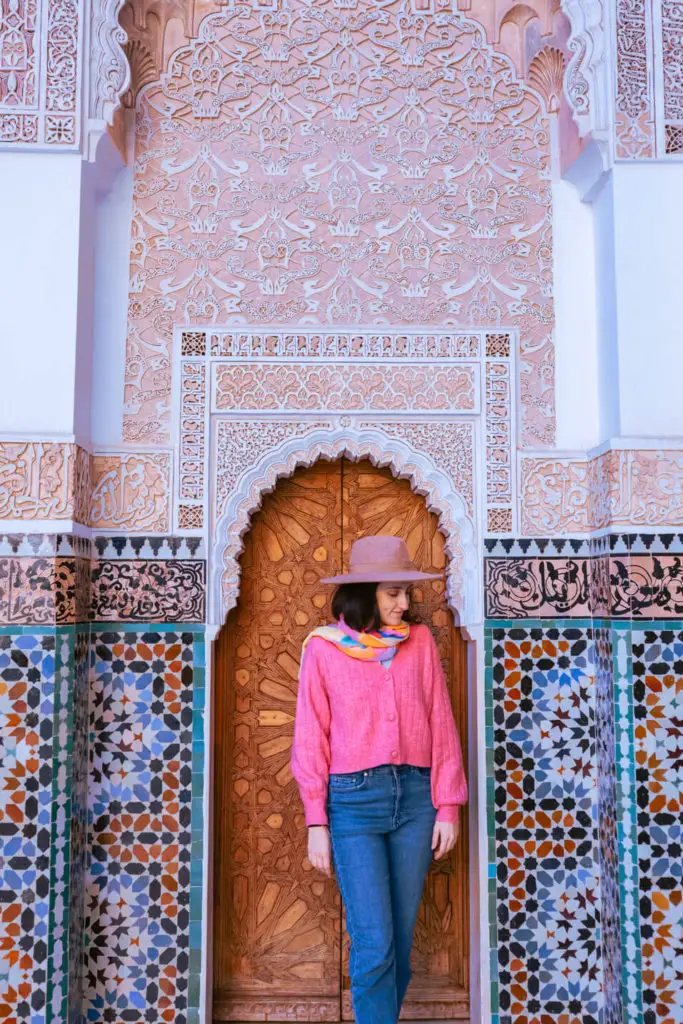
I recommend that when looking for a riad, always take a look at comments from previous guests, especially regarding the location. Also, some are on streets not accessible by car, meaning you will never be able to reach the riad by taxi.
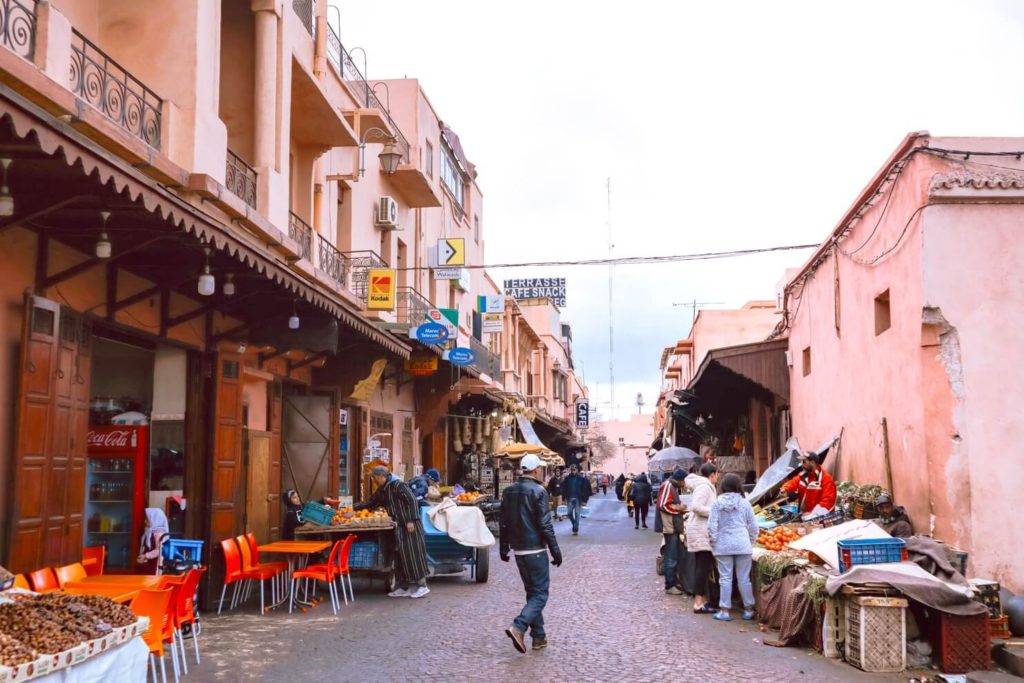
I chose to stay in a riad (L’Emeraude de la Médina) about a 15-minute walk from El Fna square and although it was located in the medina, it was in a quieter part.
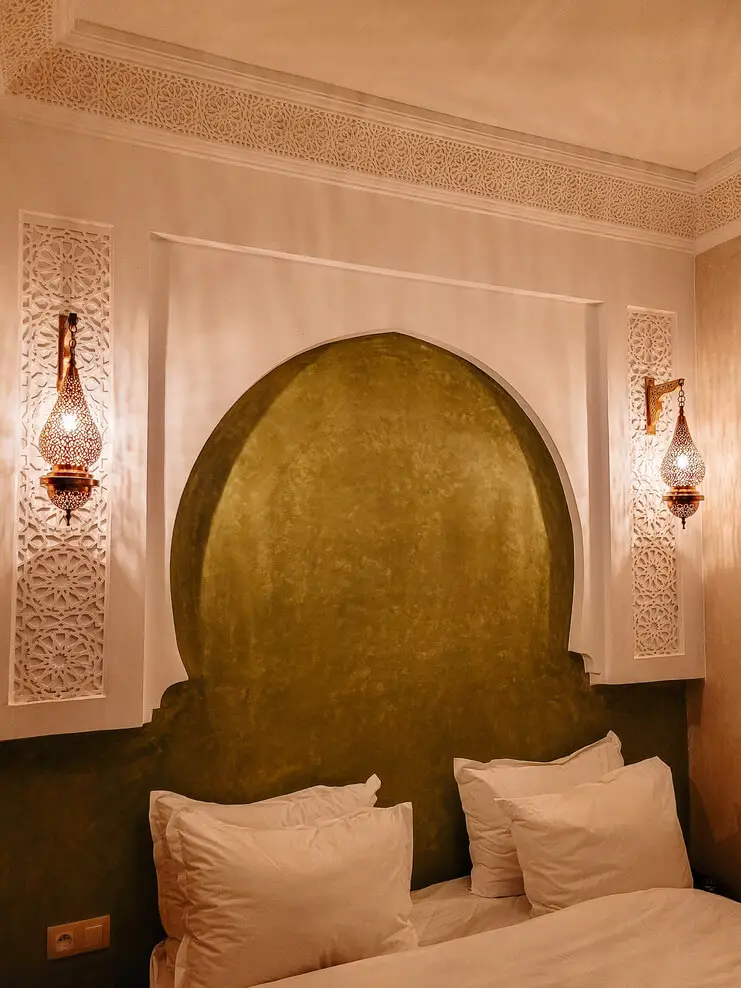
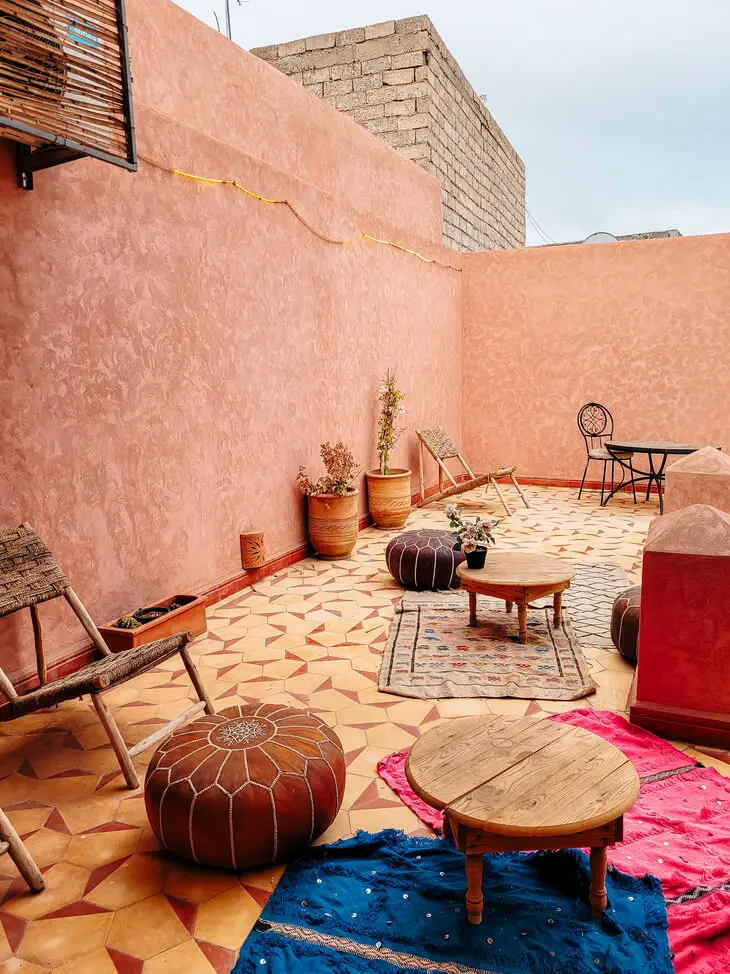
The accommodation was modest and with some opportunities for improvement, but it served perfectly for the 3 nights we spent there. Moreover, the price was very nice (125€ for 3 nights for 2 people) and included breakfast.
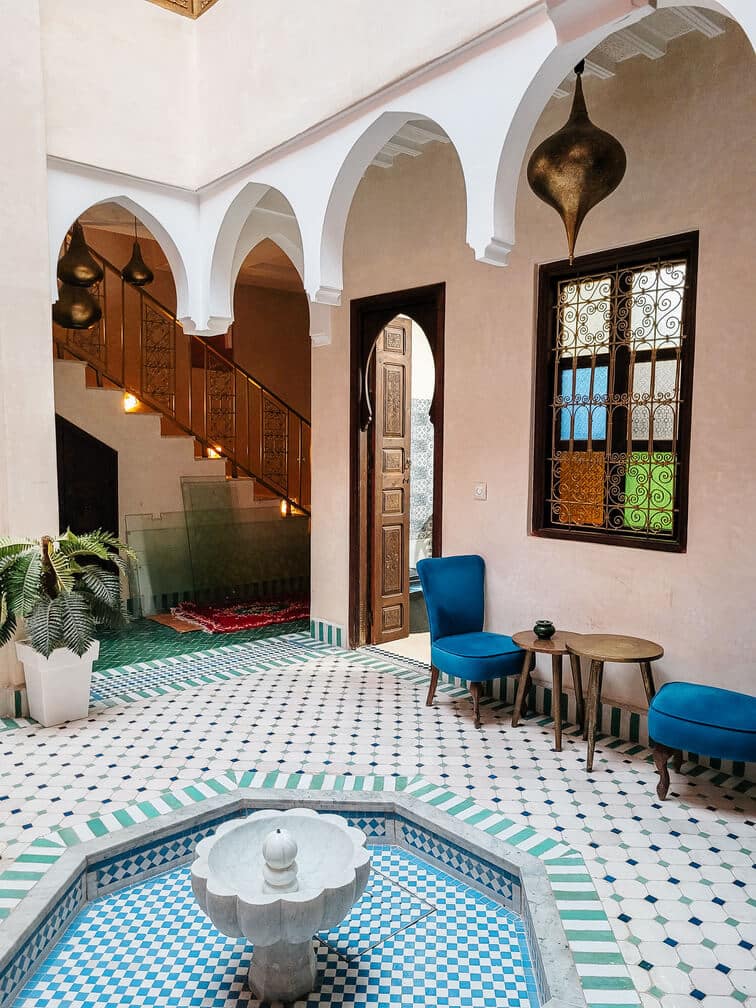
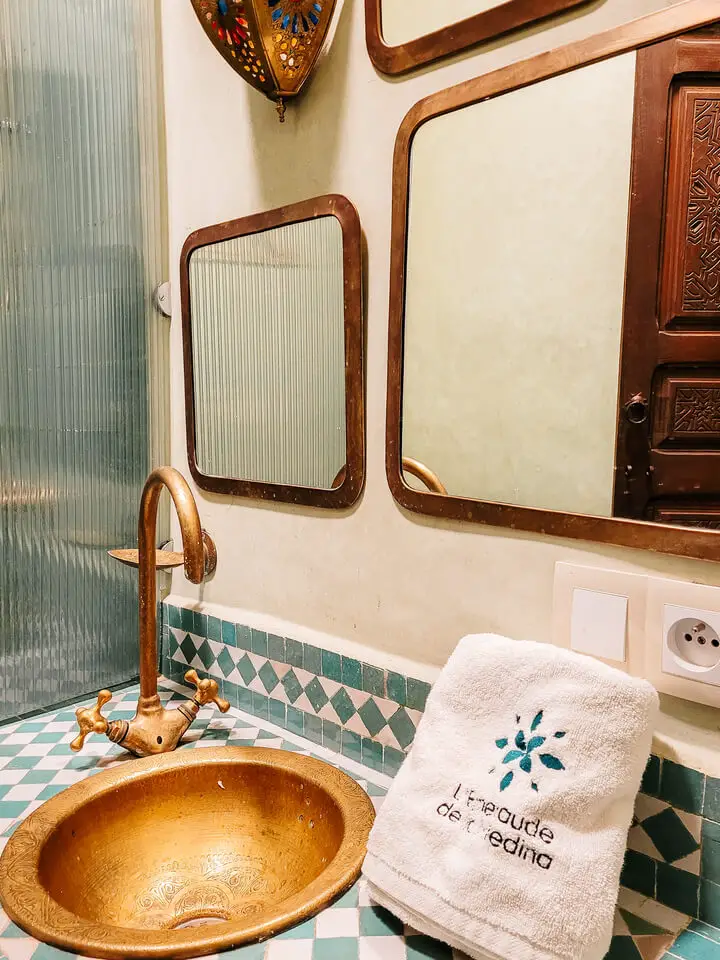
However, here are some other options regarding riads in the centre of Marrakech:
💼 TRAVEL INSURANCE: Unexpected events happen anywhere in the world, so I always recommend getting travel insurance. I regularly use Heymondo, which offers some of the highest coverages on the market at very competitive prices. As well as covering medical expenses, Heymondo’s insurance also covers the loss or theft of luggage, electronic equipment and more. They also have a 24/7 customer service through their App. As A Ticket to Take Off reader, you get a 5% discount when purchasing Heymondo insurance. The purchase must be made using this link, and the price shown on the website already includes the discount.
Activities & tours in Marrakech
Marrakech 2 Days Itinerary
So you can better plan your trip, here is a map of what to see in Marrakech in 2 days:
📌HOW TO USE THE MAP: Click on the top left corner to access the various layers of the map. You can select the layers you’re interested in and also find out more about each point of interest by clicking on it in the left-hand sidebar or on the pin on the map. Add the map to your Google Maps by clicking on the star next to the title. To access the map, simply go to Google Maps ‘Saved’ and click on ‘Maps’!
Marrakech 2 Days Itinerary – Day 1
» Koutoubia Mosque
This itinerary with what to visit in Marrakech starts at the largest mosque in Marrakech – the Koutoubia mosque. However, entry to the mosque is forbidden to non-Muslims (like almost all mosques in Morocco!).
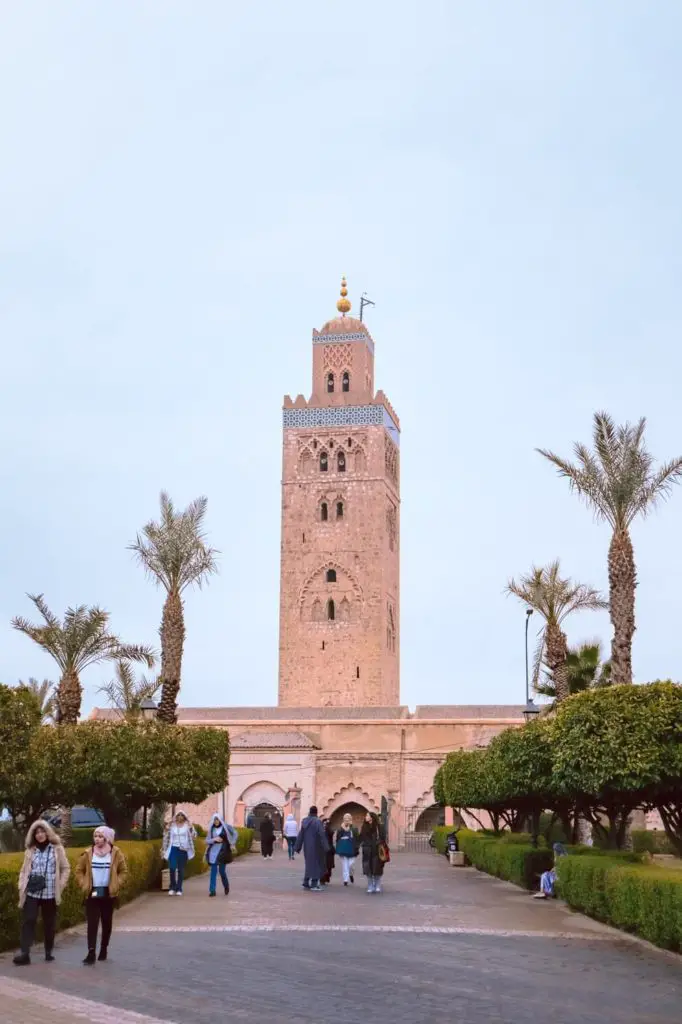
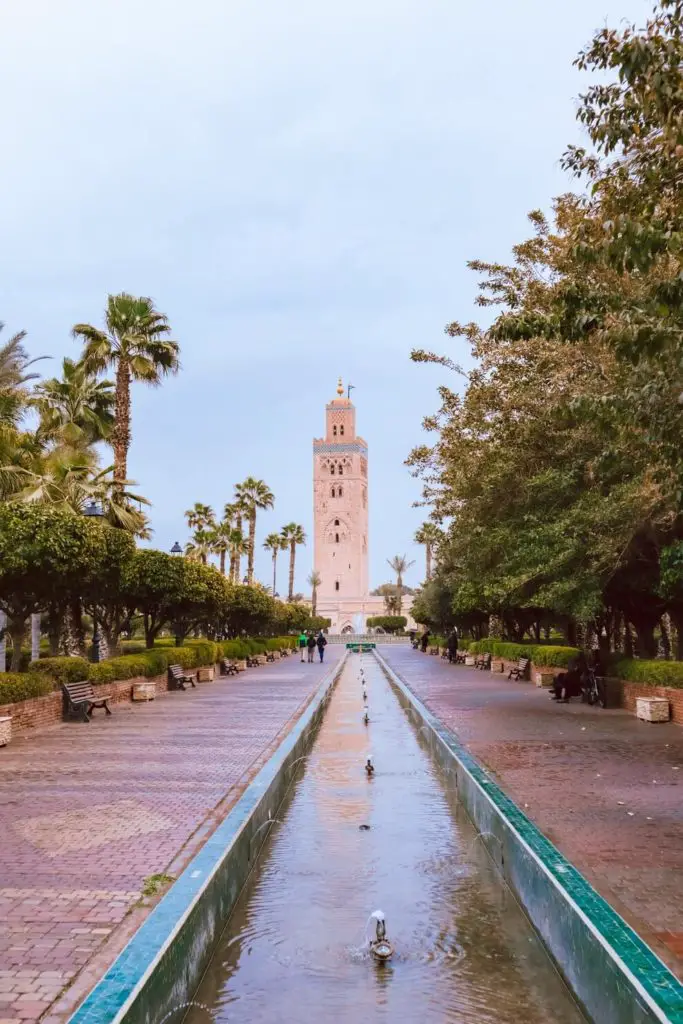
You can, however, visit the surroundings where the mosque is located. In fact, Lalla Hasna Park, right next to the mosque, is one of the best places to photograph the mosque!
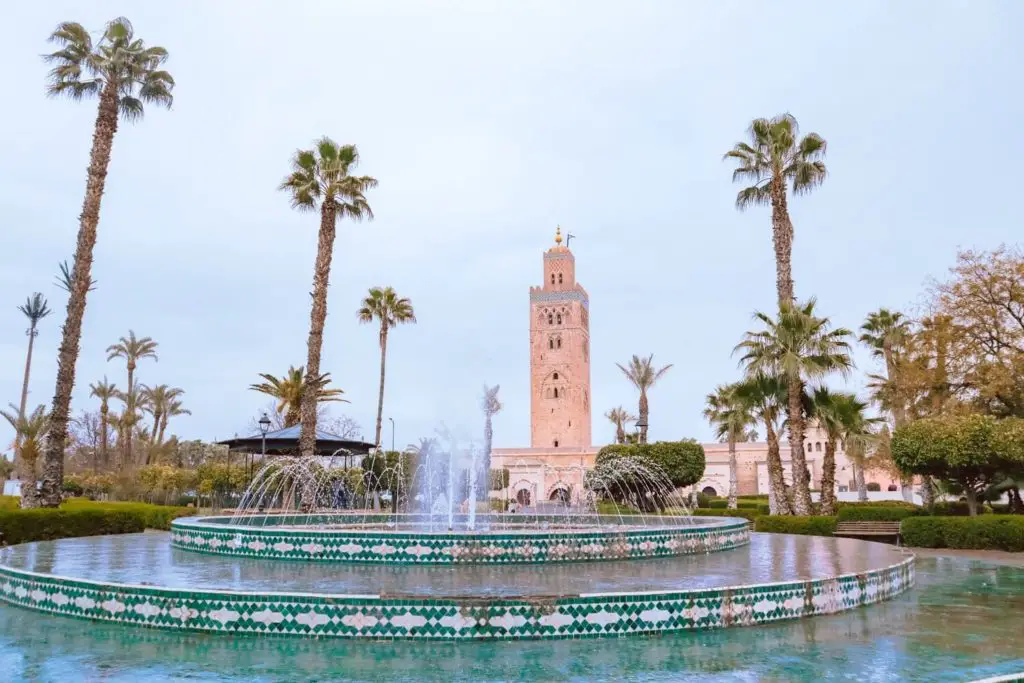
» Bab Agnaou Gate
Continue towards one of the city’s entrance gates.
There are 19 entrance gates to the city of Marrakech, and the Bab Agnaou gate is probably the best known. The entrance through this door gives access to the kasbah area in the southern part of the medina.
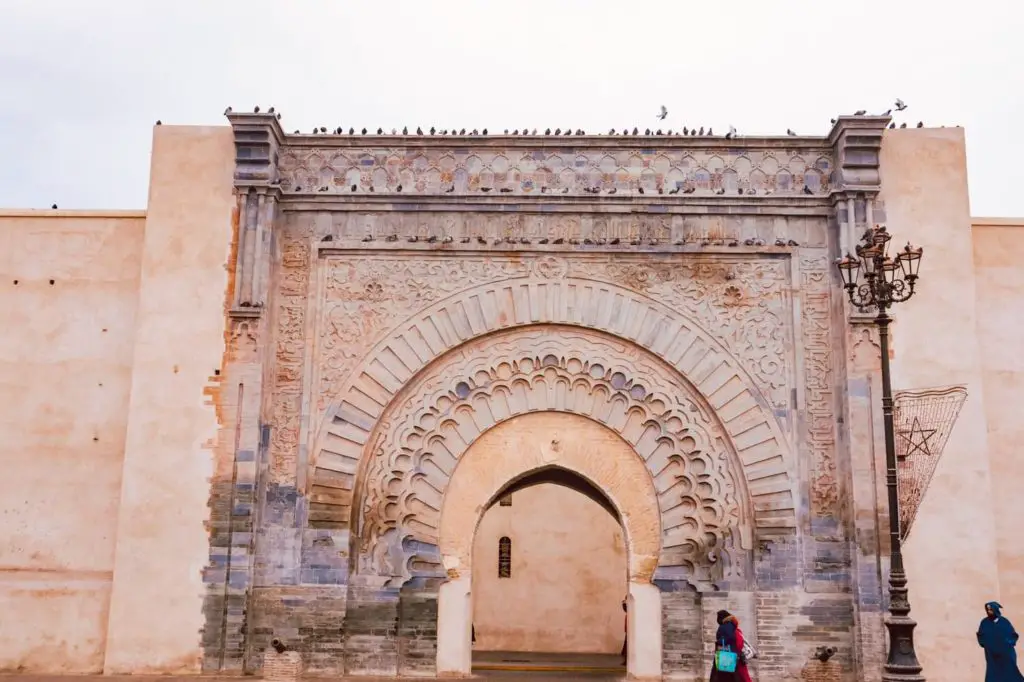
» Saadian Tombs
Already inside the wall, the first major point to visit in Marrakech is the Saadian tombs. In these tombs are buried more than 60 members of the Saadian dynasty, which ruled Morocco between the 16th and 17th centuries.
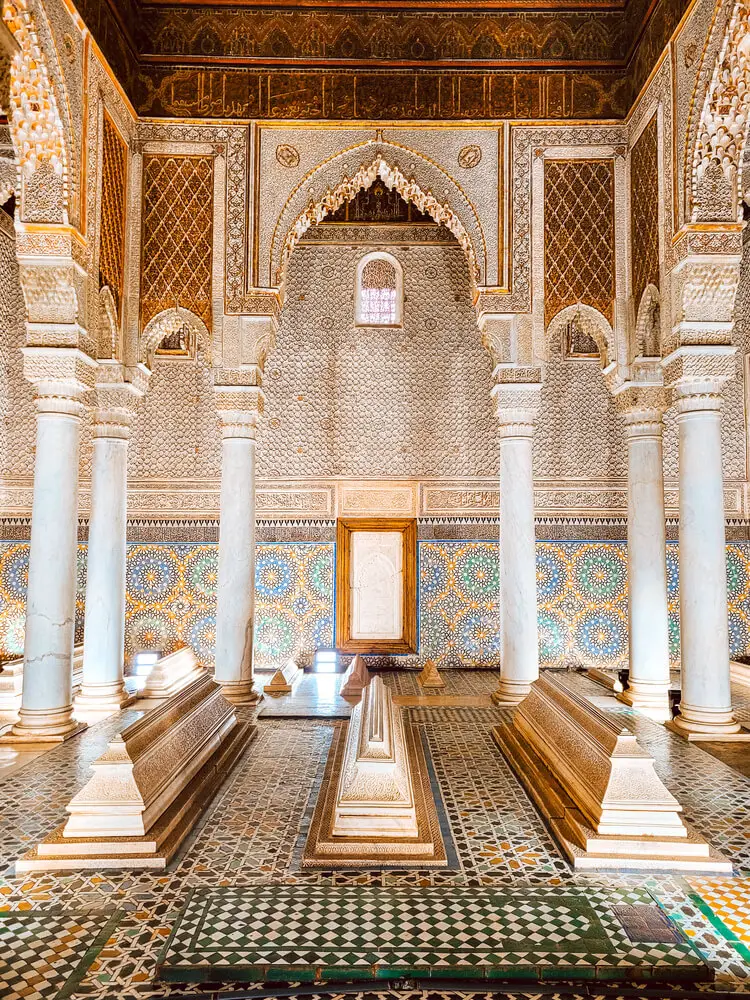
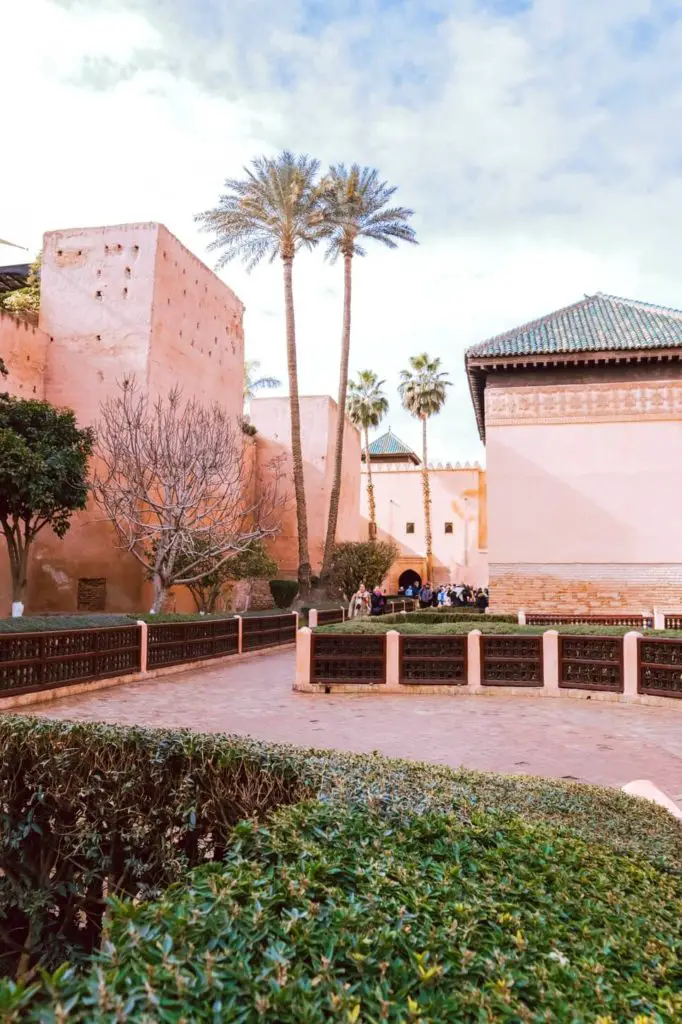
The space is not very big, although when I visited there was a long queue to visit the main room. But the details we find in these tombs are absolutely incredible. A small taste of what’s to come on this Marrakech itinerary 😍.
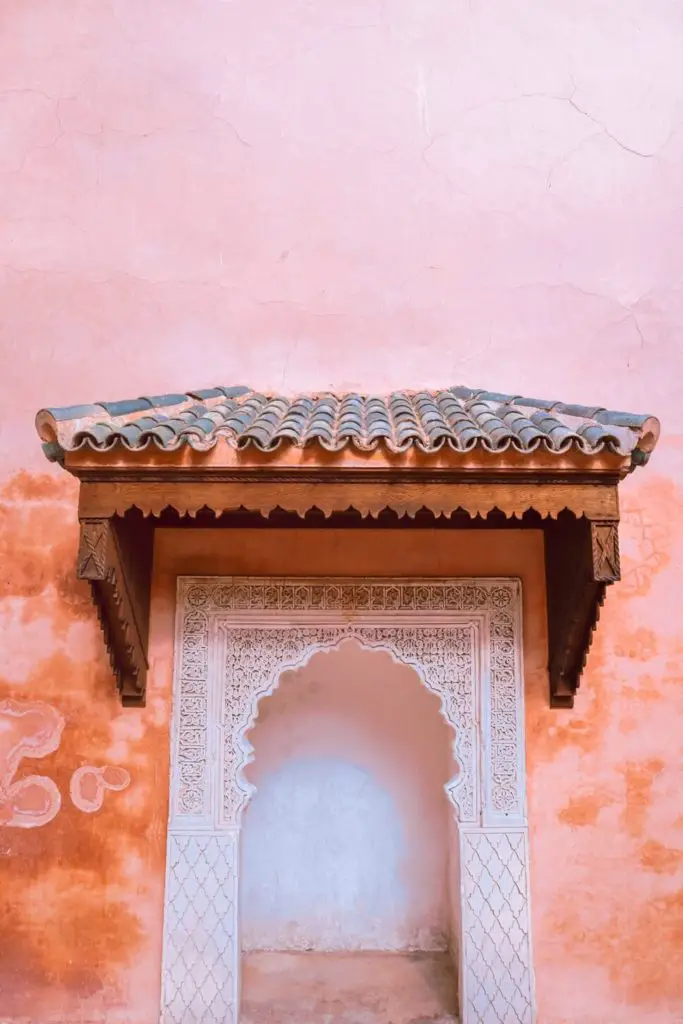
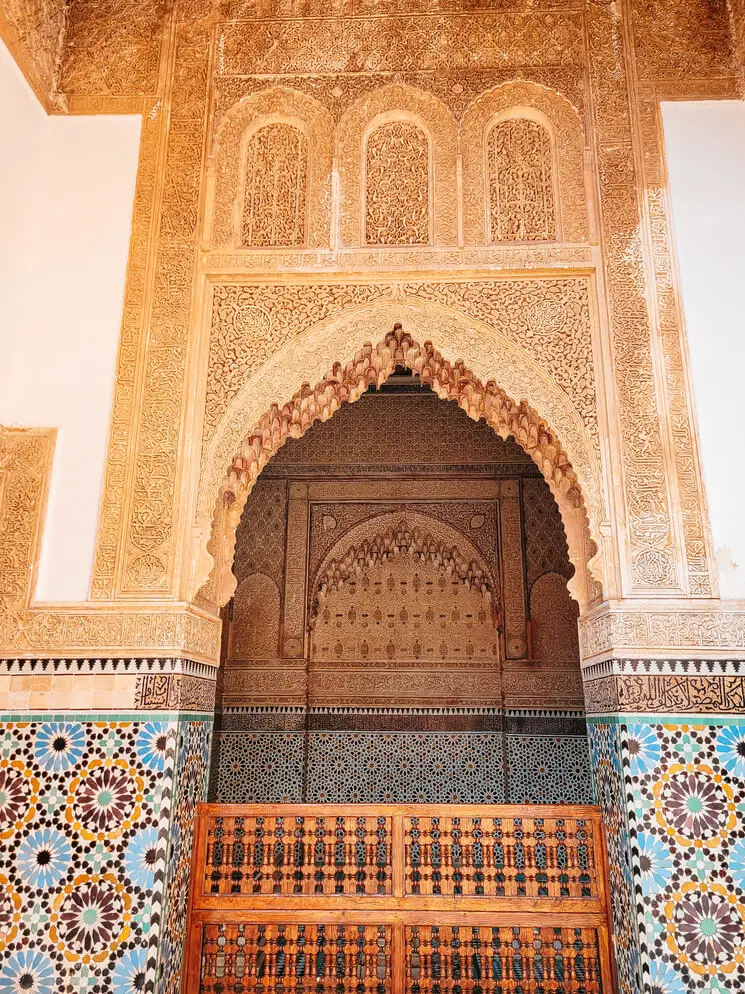
📝 USEFUL INFORMATION: The entrance ticket to the Saadian Tombs costs 100 MAD (~9,5€) and payment can only be made in cash. Opening hours are from 9 am to 5 pm.
» El Badi Palace
It’s now time to head towards the El Badi Palace, or rather the remaining ruins of the palace. It was built in the late 16th century by the Saadian sultan to celebrate his victory in the Battle of Alcácer-Quibir.
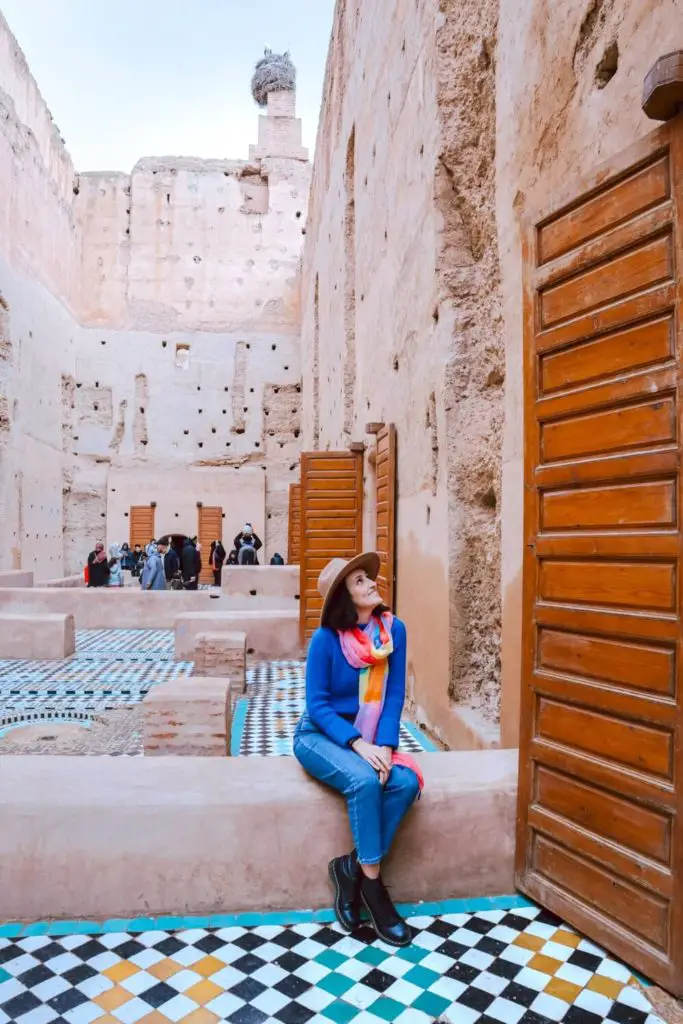
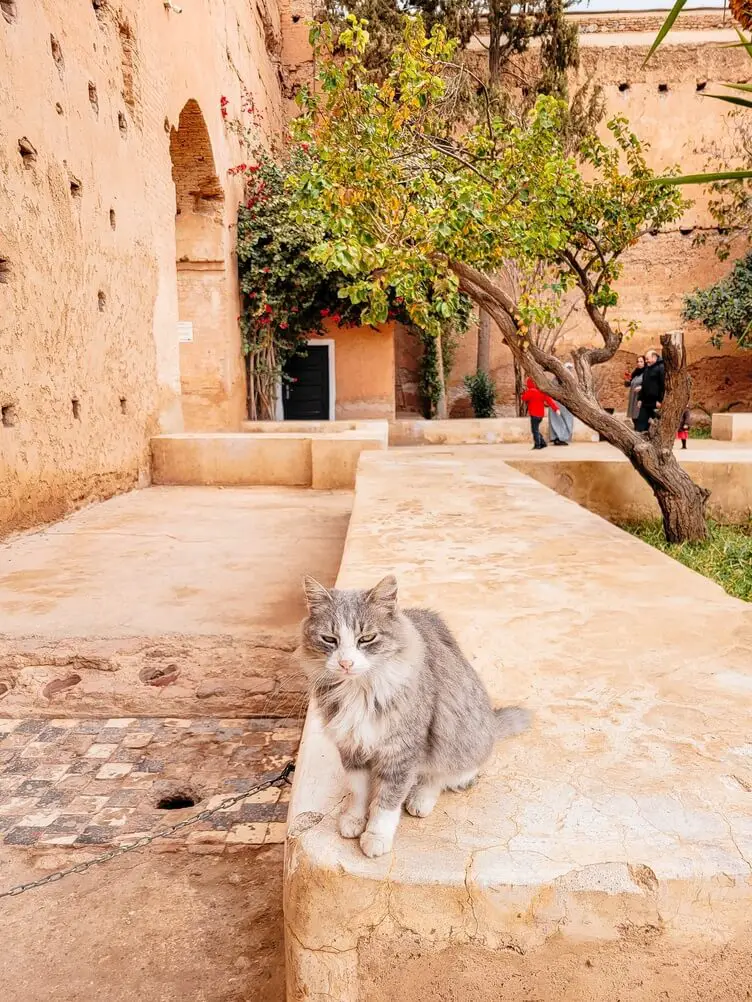
In fact, this palace was mostly financed by the ransom paid by the Portuguese at the end of the battle.
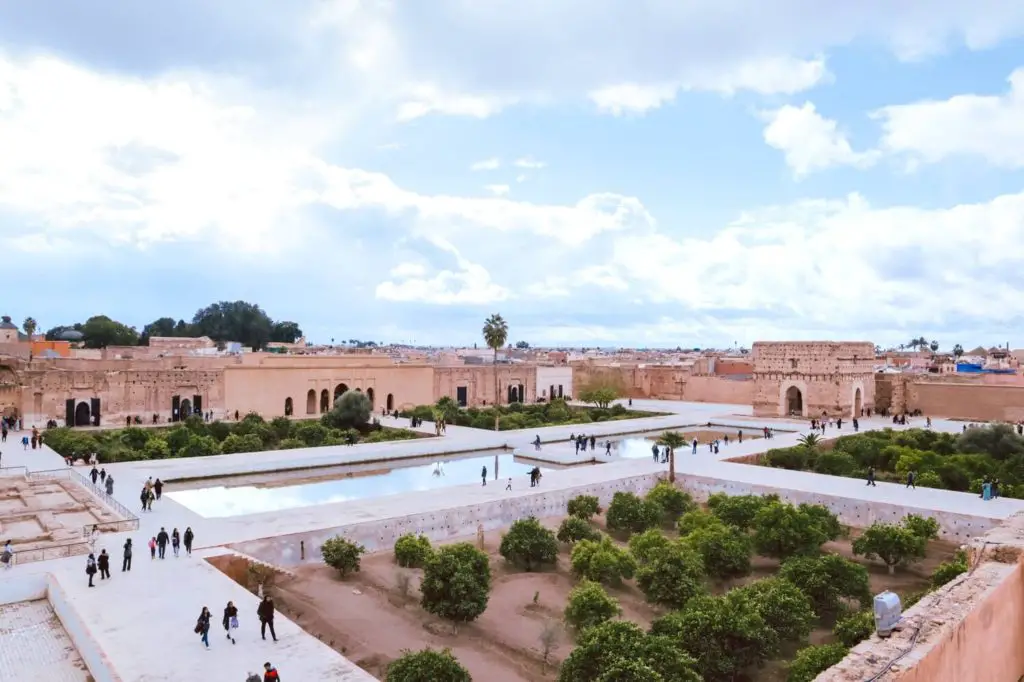
Despite being somewhat bare and in ruins, the palace is quite big, so I suggest you set aside at least 1 hour to visit it.
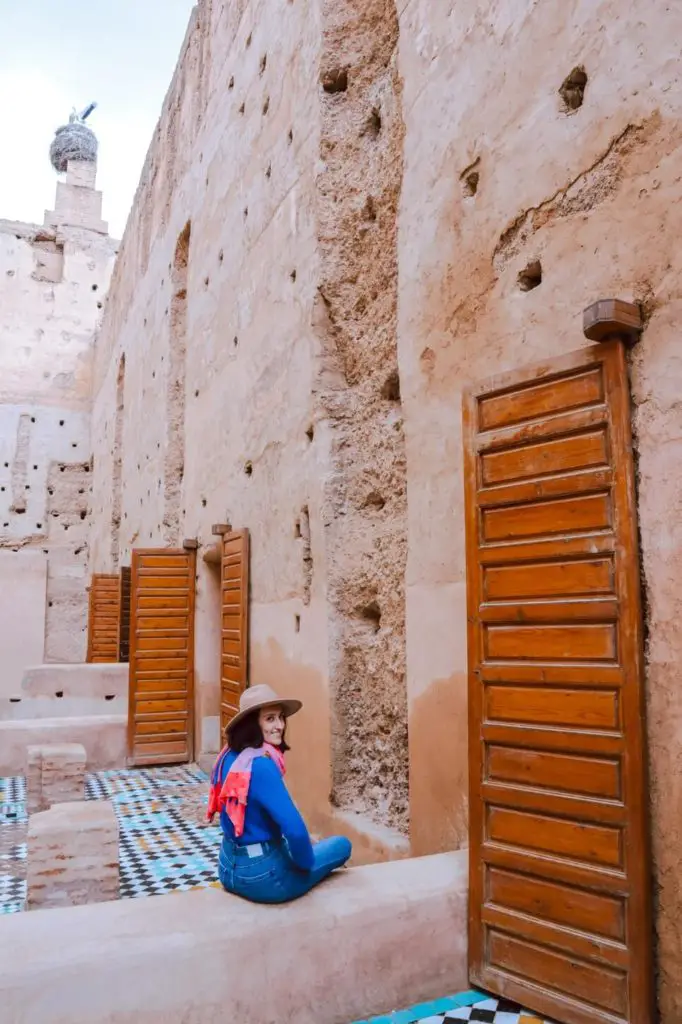
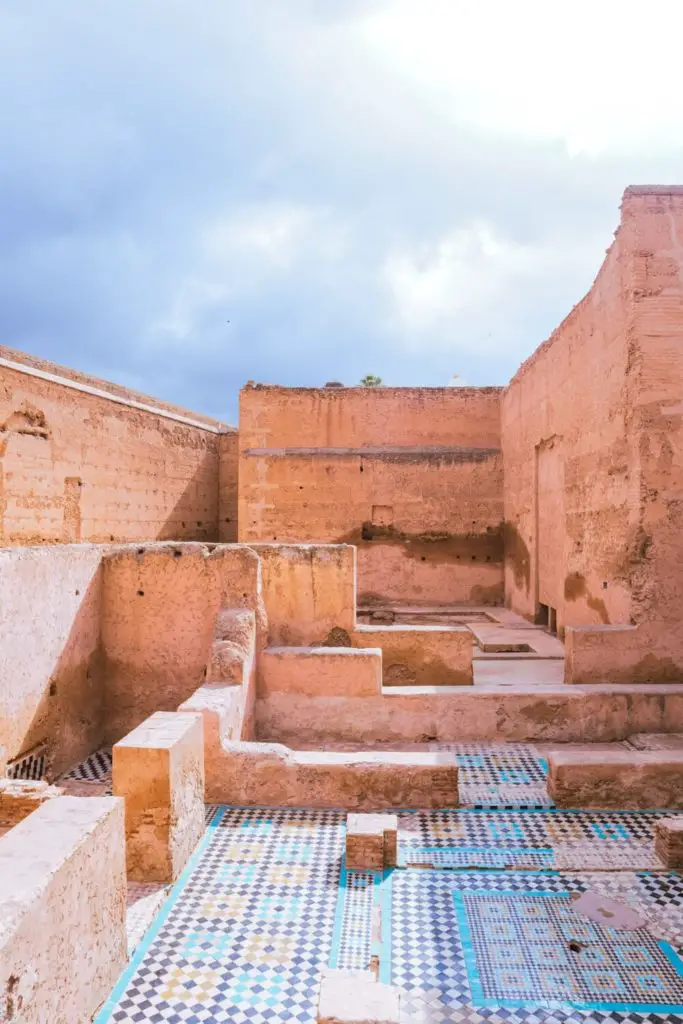
📝 USEFUL INFORMATION: Entrance to El Badi Palace costs 100 MAD (~9,5€) and only cash is accepted as payment. Opening hours are from 9 am to 5 pm.
» Mellah (Jewish Quarter)
Follow the itinerary through Place des Ferblantiers and stroll through the Jewish quarter of Marrakech, known as Mellah. The first presence of Jews in the city is estimated to have been in the 13th century, having intensified after 1492 following their expulsion from the Iberian Peninsula.
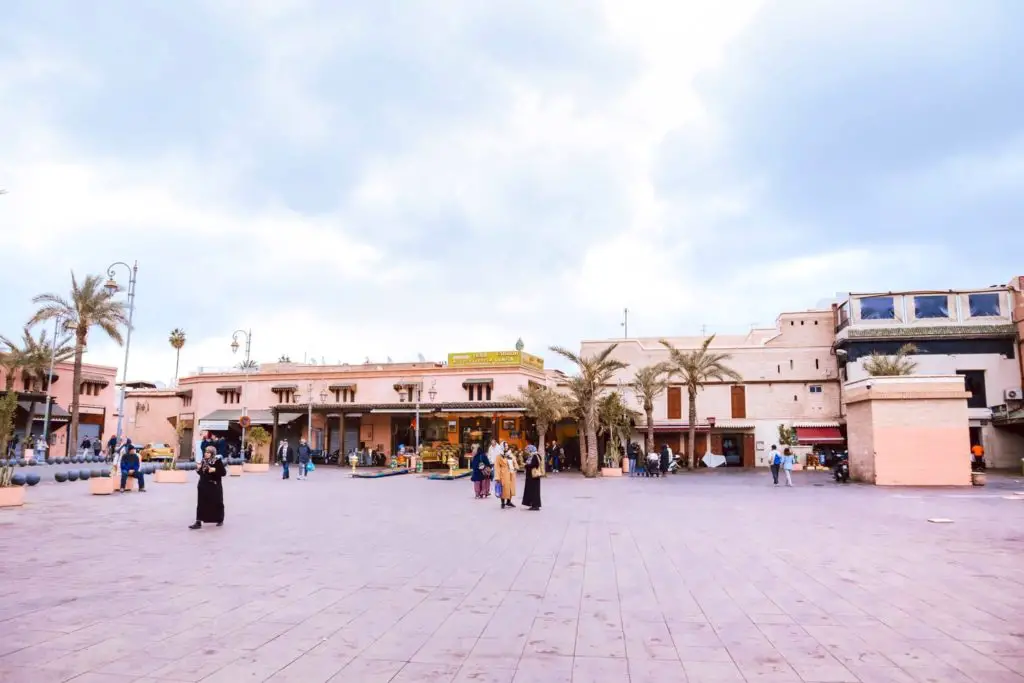
Although today the presence of Jews is much lower, there are still some traces of other times in this neighbourhood. This includes the Salt Al Azama Synagogue or even the Miara Jewish Cemetery.
» Bahia Palace
Built at the end of the 19th century, the Bahia Palace is another of the fantastic palaces that you really must visit in Marrakech.
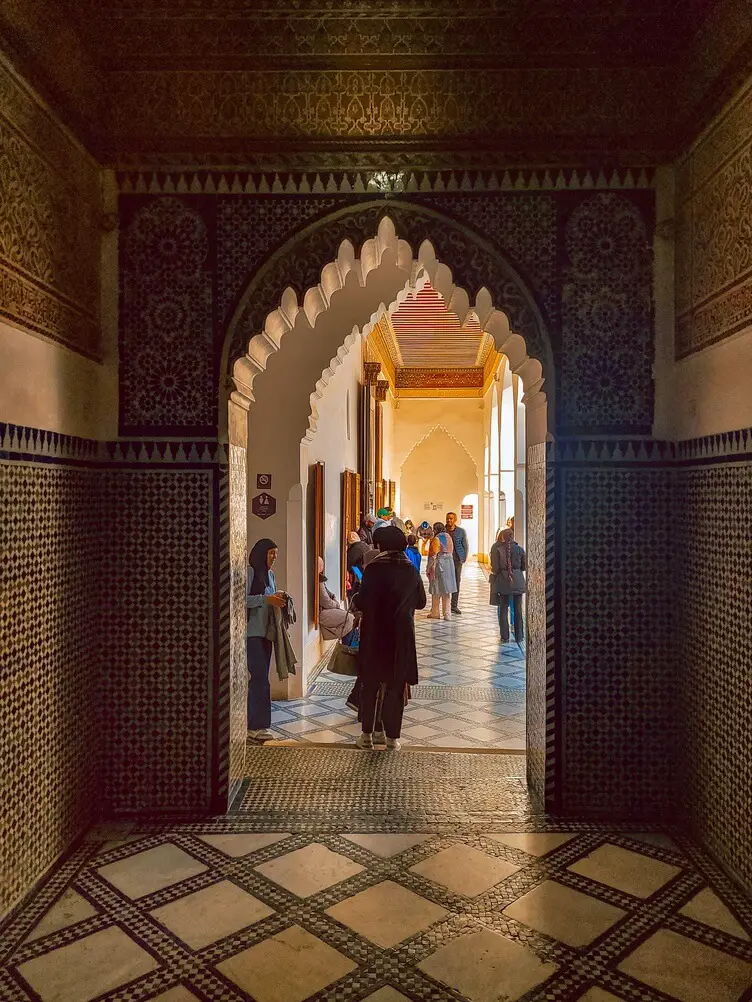
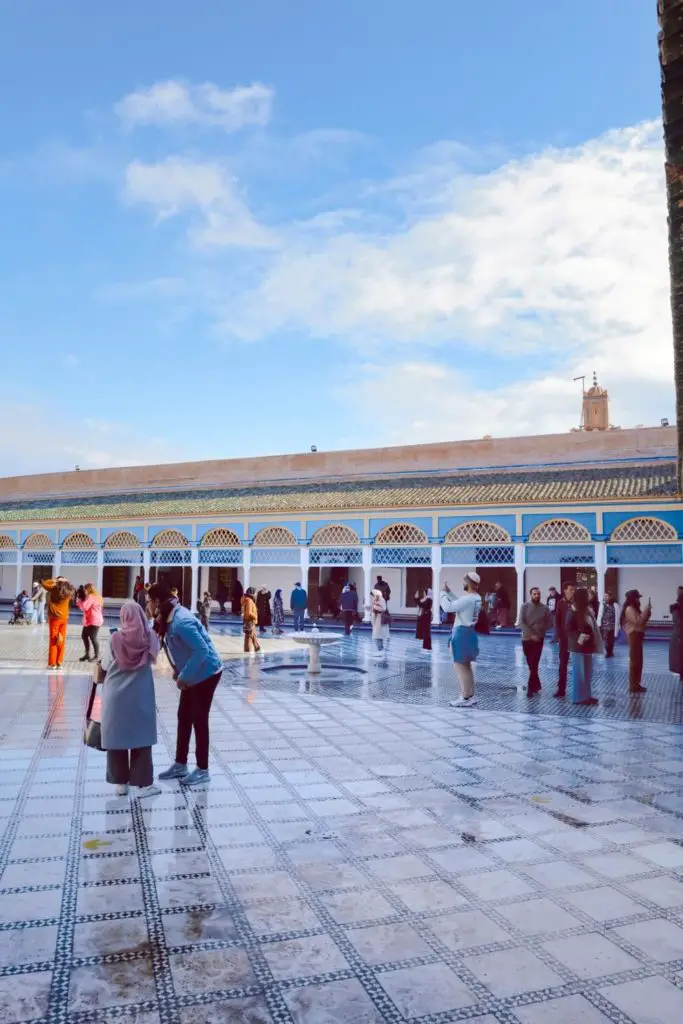
The Bahia palace is built in the Arab-Andalusian style and, like other places in the city, has details that will leave anyone awestruck. Spend time exploring the different rooms and inner courtyards of this palace.
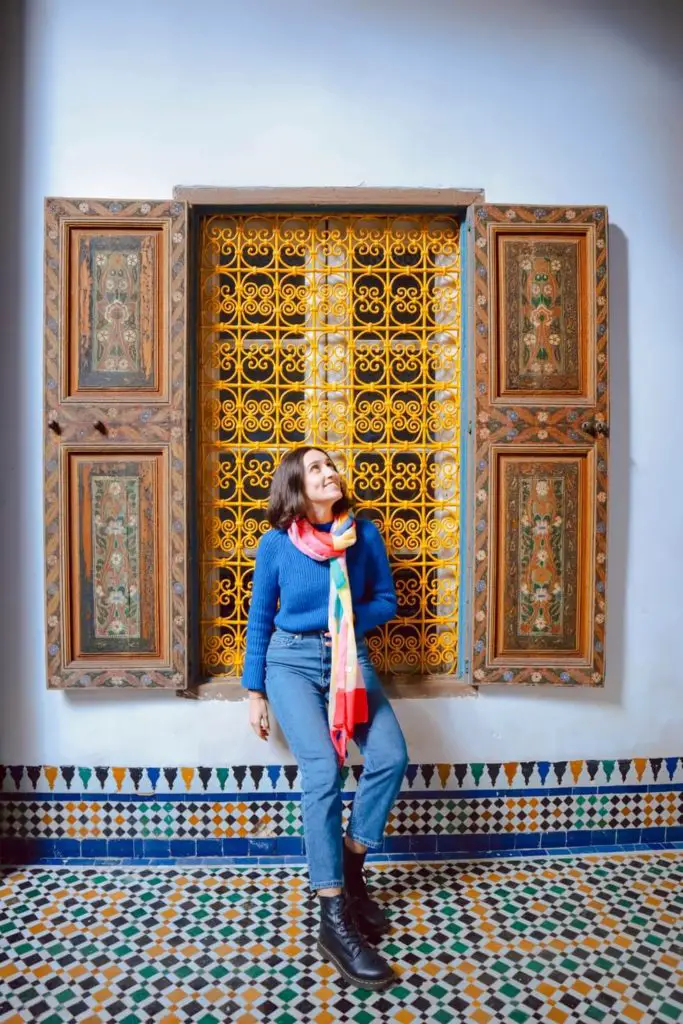
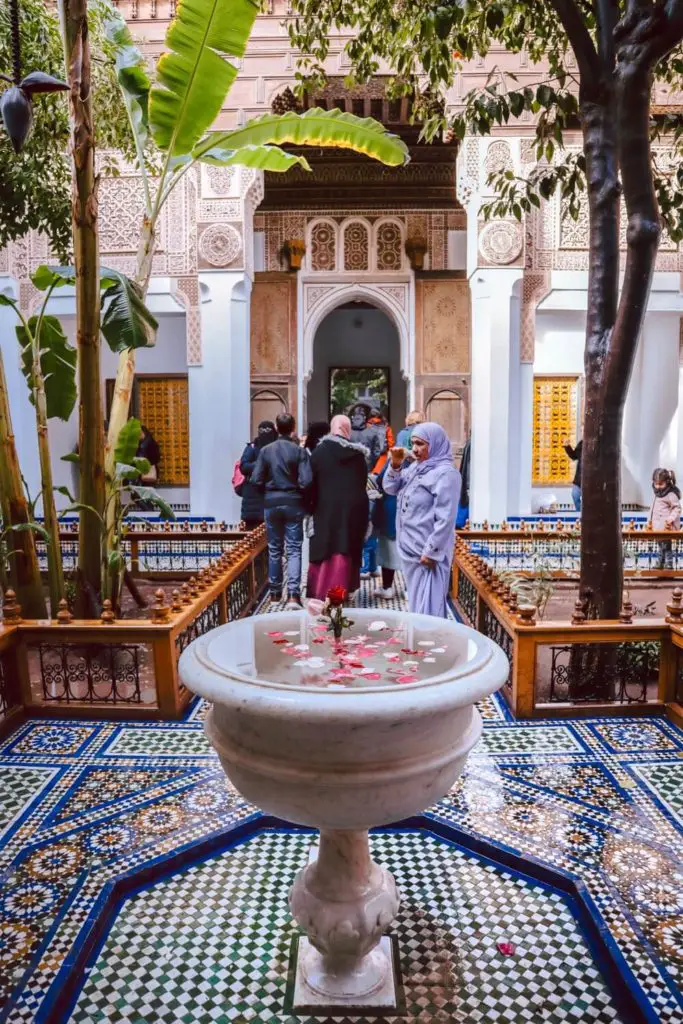
💡 EXTRA TIP: When looking for the Palace on Google Maps, search for “Bahia Palace Entrance” to ensure that you get to the place where you can actually enter the palace.
In all, the gardens of the Bahia Palace have an area of 8,000 m² and more than 100 rooms. It is one of the most impressive works of art in Marrakech, without a doubt.
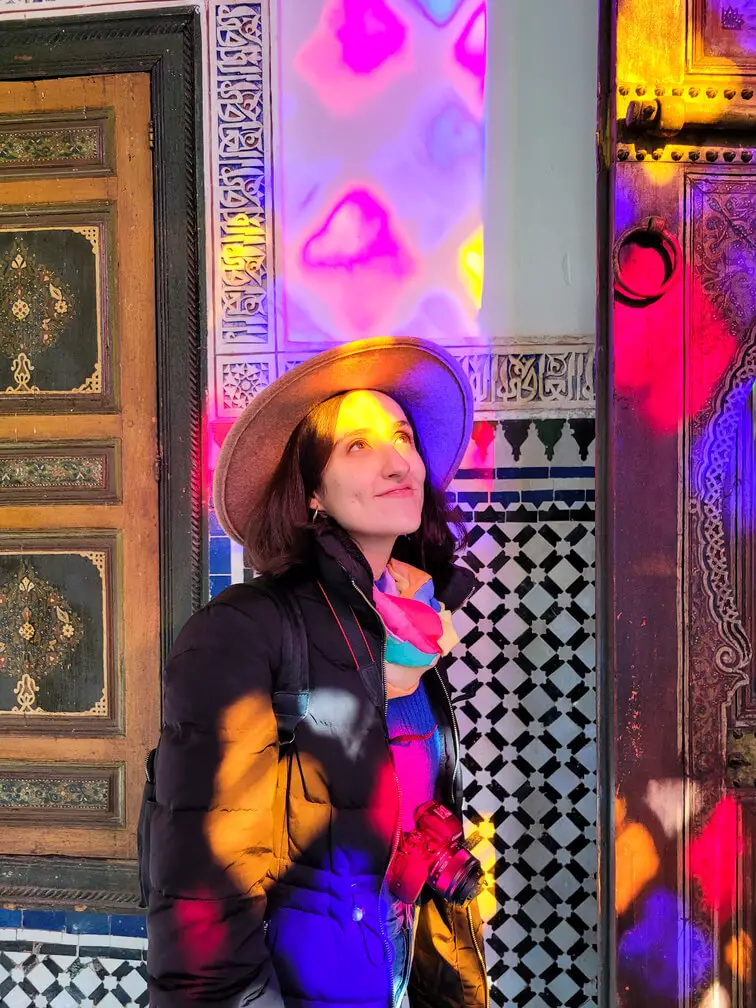
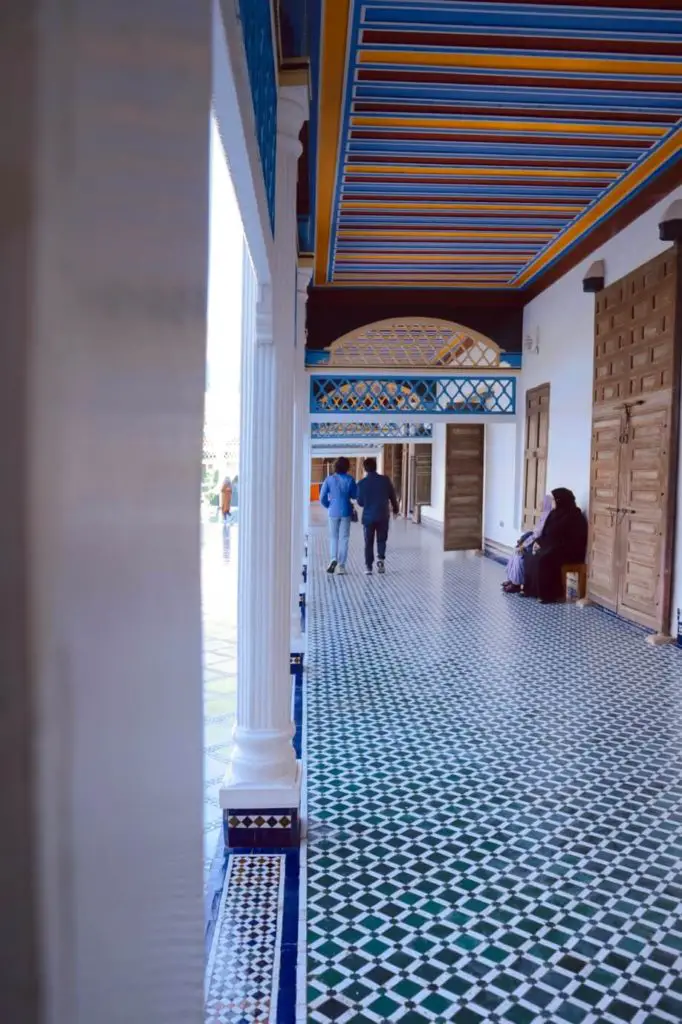
📝 USEFUL INFORMATION: The ticket to visit Bahia Palace costs 70 MAD (~6,4€) and opening hours are from 8 am to 5 pm.
» Jemaa el-Fna Square
It’s time to head to one of the most iconic places in Marrakech – the Jemaa el-Fna square. It is said that not visiting this square is the same as not visiting Marrakech.
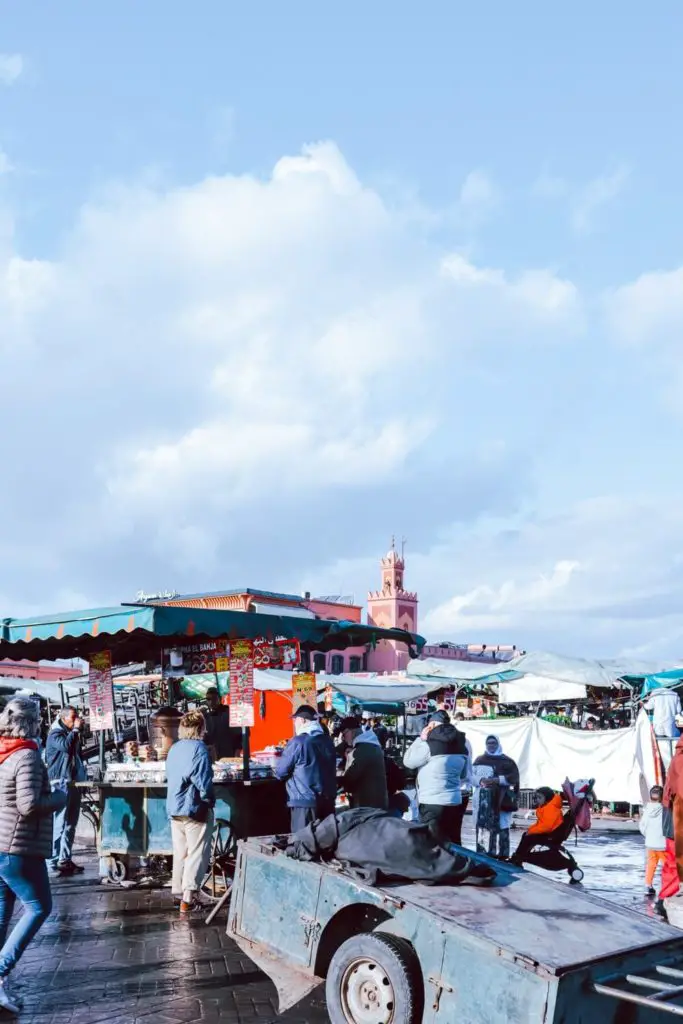
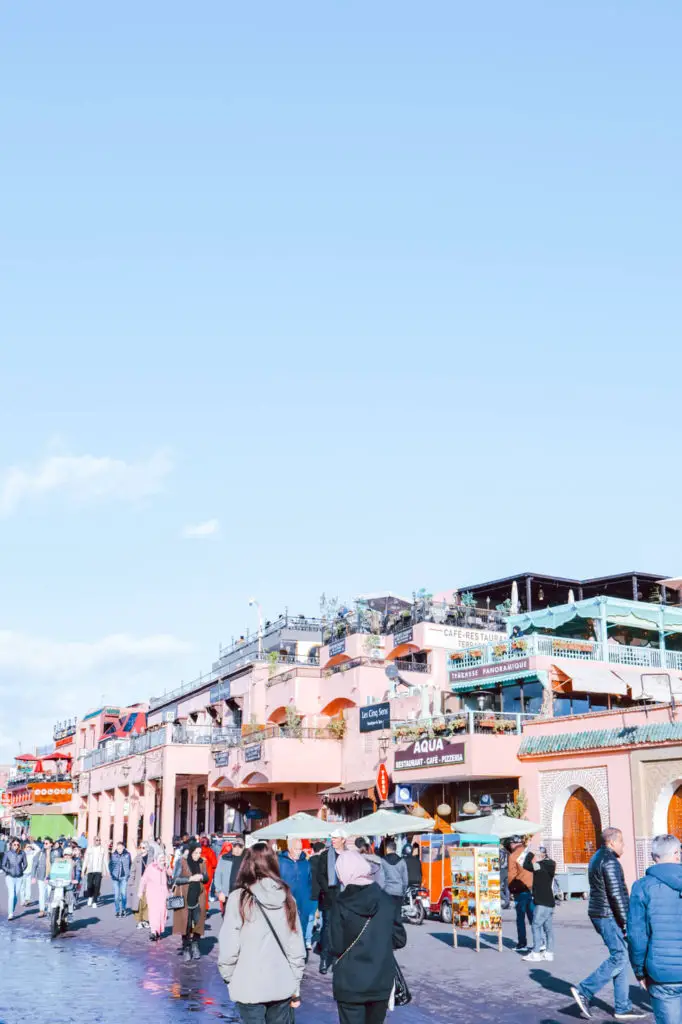
Everything happens in this square! Hundreds of vendors selling a bit of everything, lots of smells and lots of sounds. However, the square has a totally different atmosphere during the day and in the afternoon/evening. While in the morning, nothing happens there, in the afternoon the square comes alive.
💡 EXTRA TIP: It is in this square that we find the famous “snake charmers” or “monkey tamers”. However, I warn you that these animals are treated unethically, so I suggest you do not condone this type of tourism.
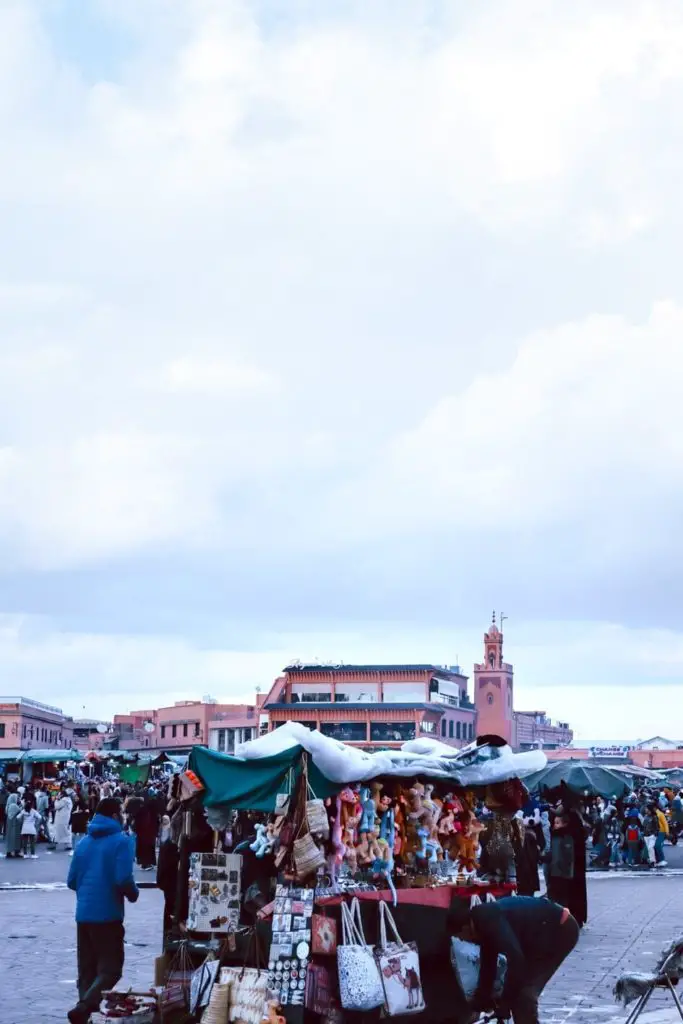
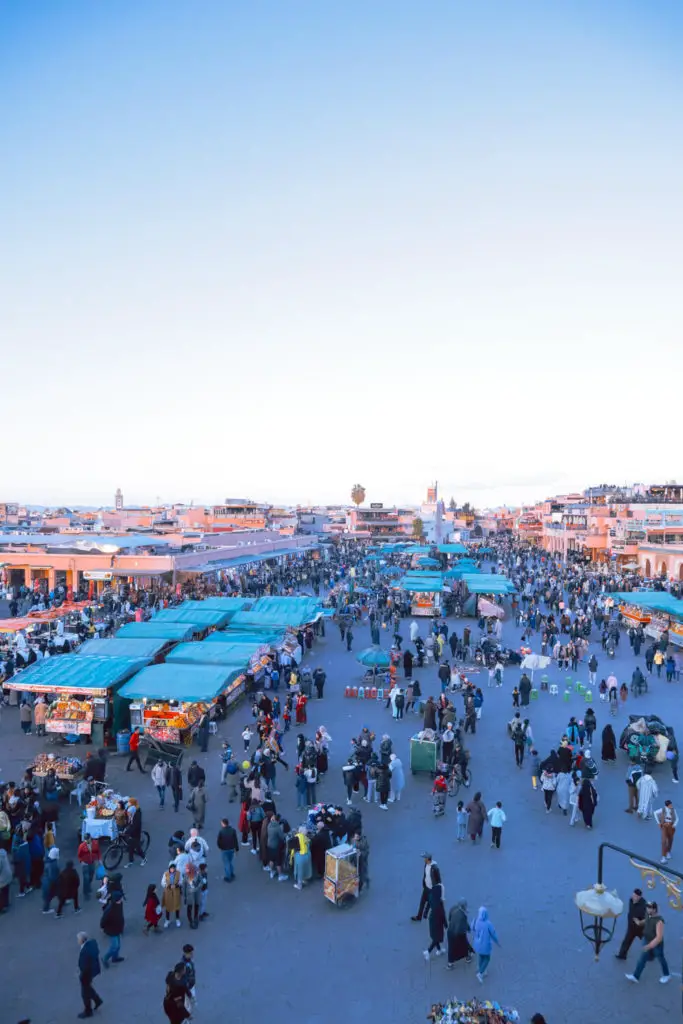
The name of the square could be translated as “Square of the Dead”, as this is where public executions used to take place. However, today the square is seen in a completely different way and is a place full of life.
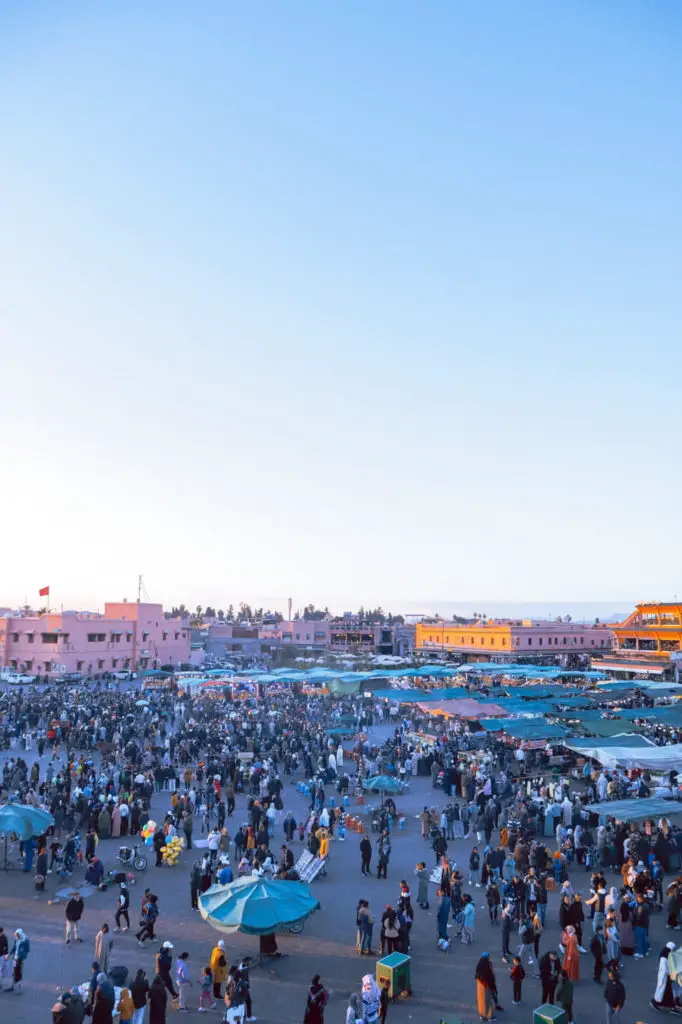
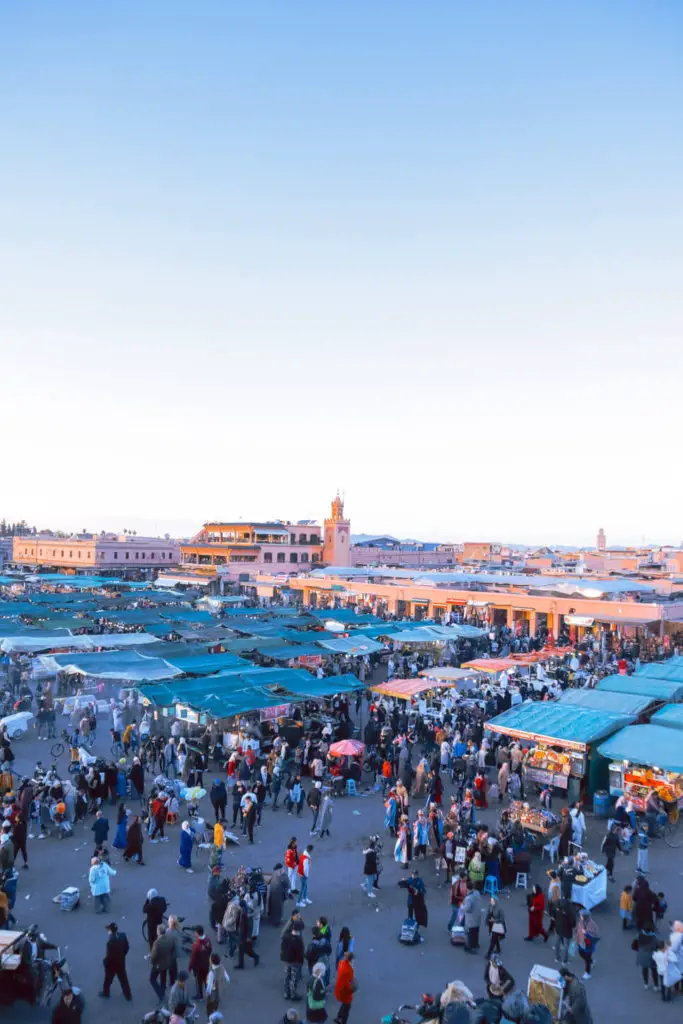
After a stroll through the hundreds of vendor stalls, I suggest you go up to one of the terraces around the square to observe the square from another perspective.
I especially recommend it at sunset, as it’s even more magical 🥰. It is said that the best views are from Le Grand Balcon du Café Glacier or from Café de France.
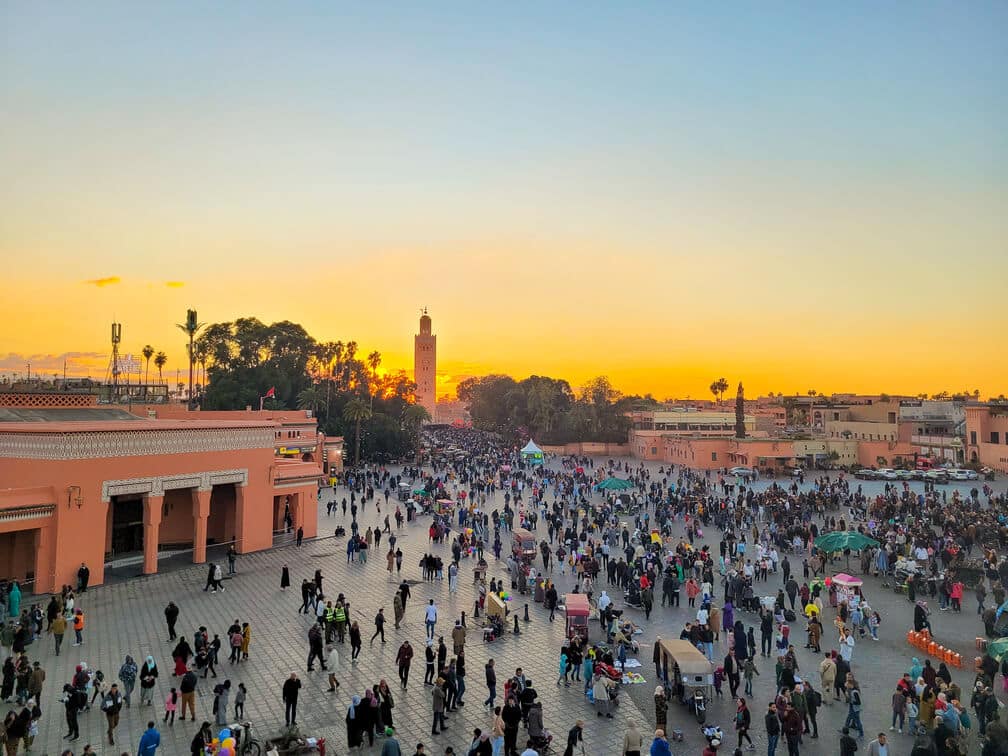
I opted for the first option and couldn’t recommend it more. There is mandatory consumption, but the menu is not that expensive.
» Medina
If you are following this itinerary, you have certainly visited part of the medina of Marrakech already. The medina is actually the old part of the walled city. It’s confusing, often dirty, and its streets tend to be crowded.
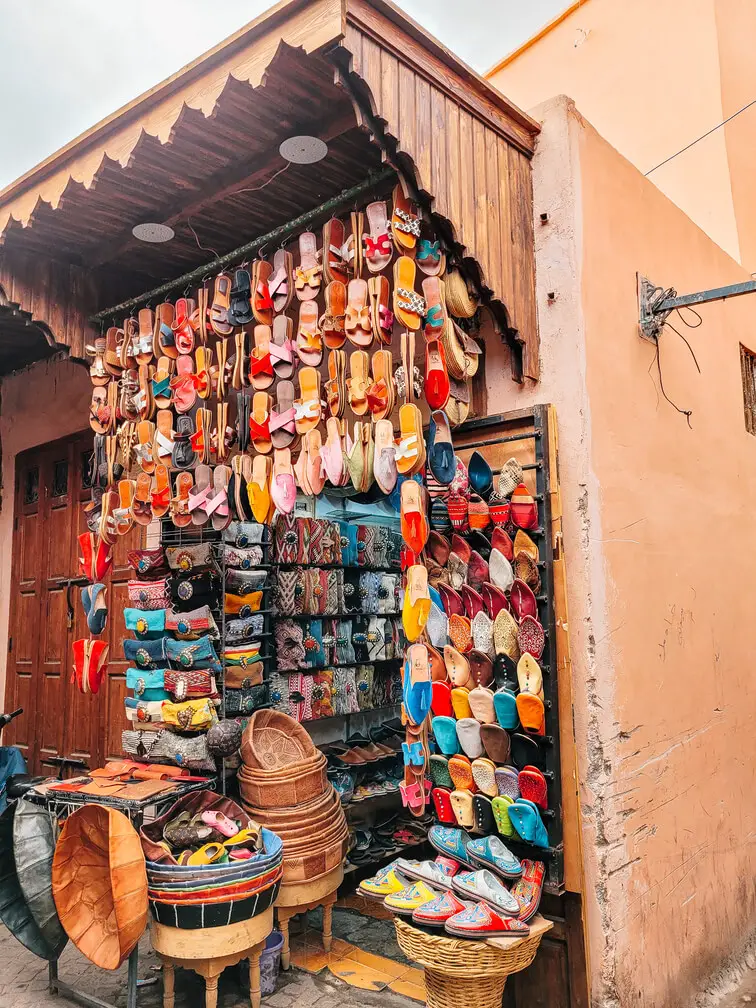
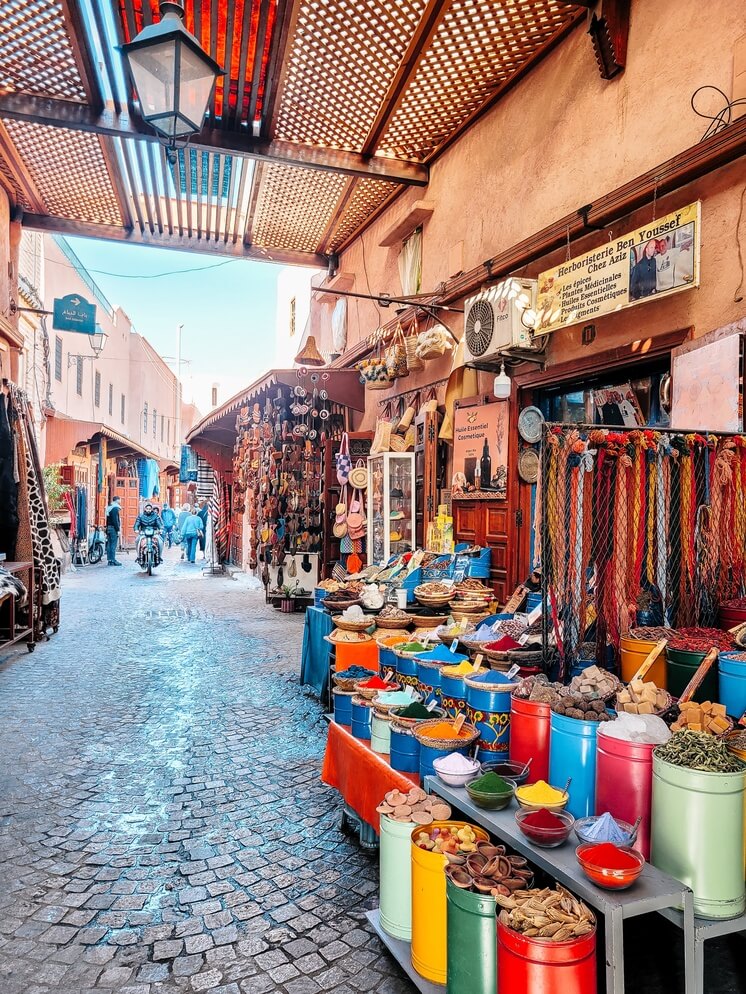
But don’t let the chaos that lives there prevent you from seeing the beauty of this place. In fact, in my opinion, it is this chaos that makes it so special.
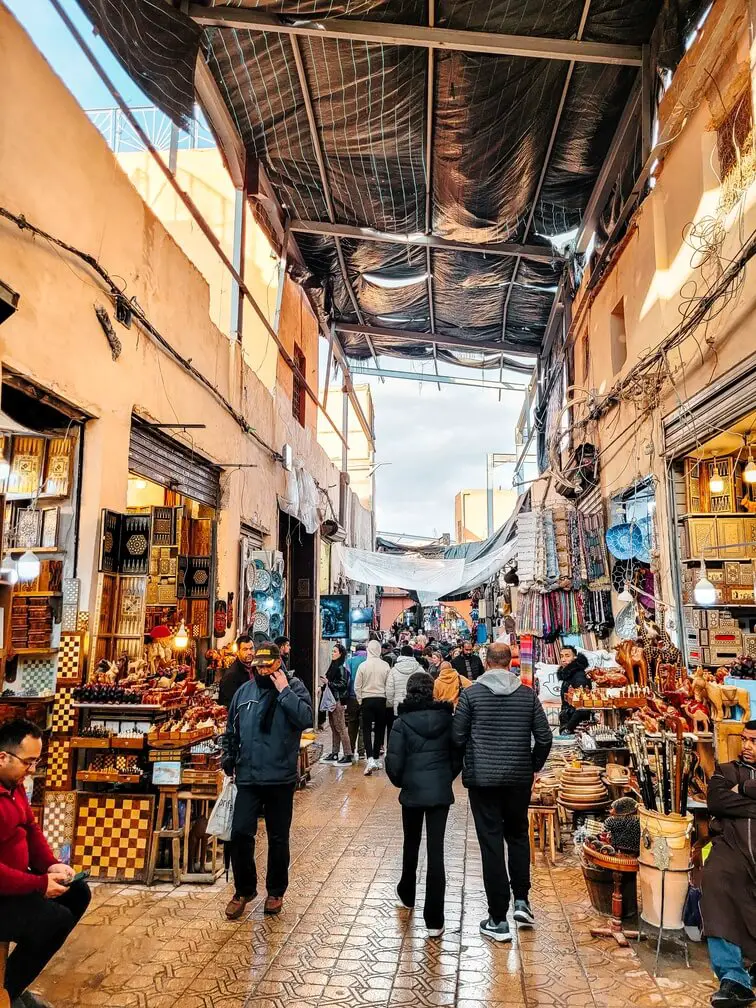
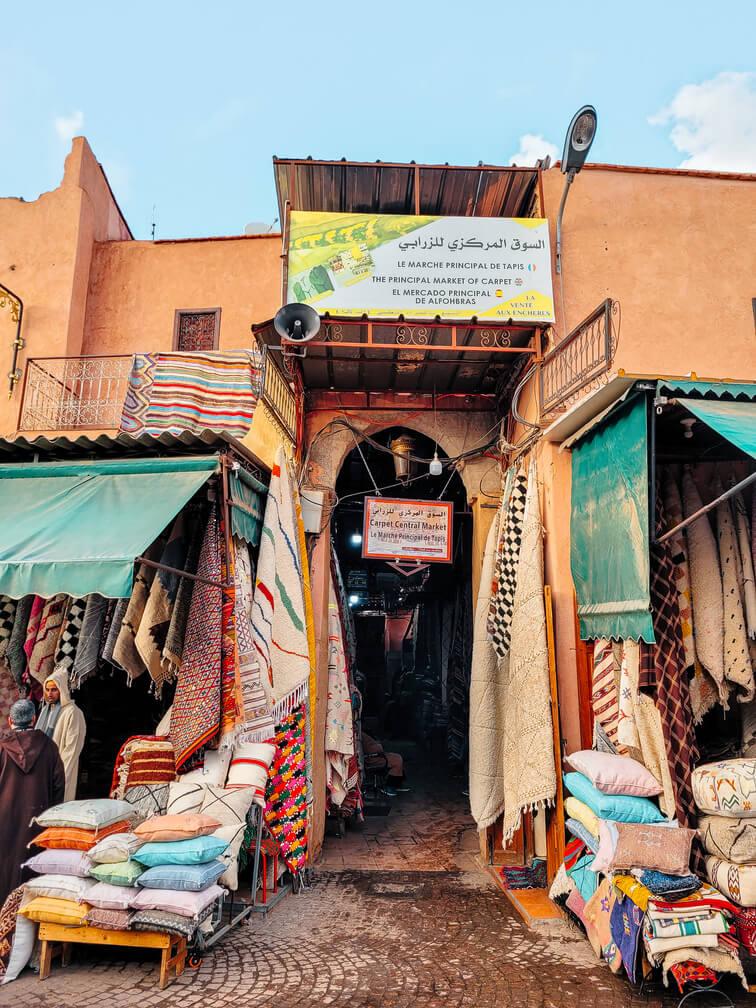
However, the streets of the medina near Jeema el-Fna square seem even more crowded than the rest, so that’s why I’ve included the medina at this point in the itinerary.
I suggest you visit two souks (the name given to the markets) more in-depth. They are the Souk Semmarine (dedicated to lamps) and the Souk des Epices (dedicated to spices).
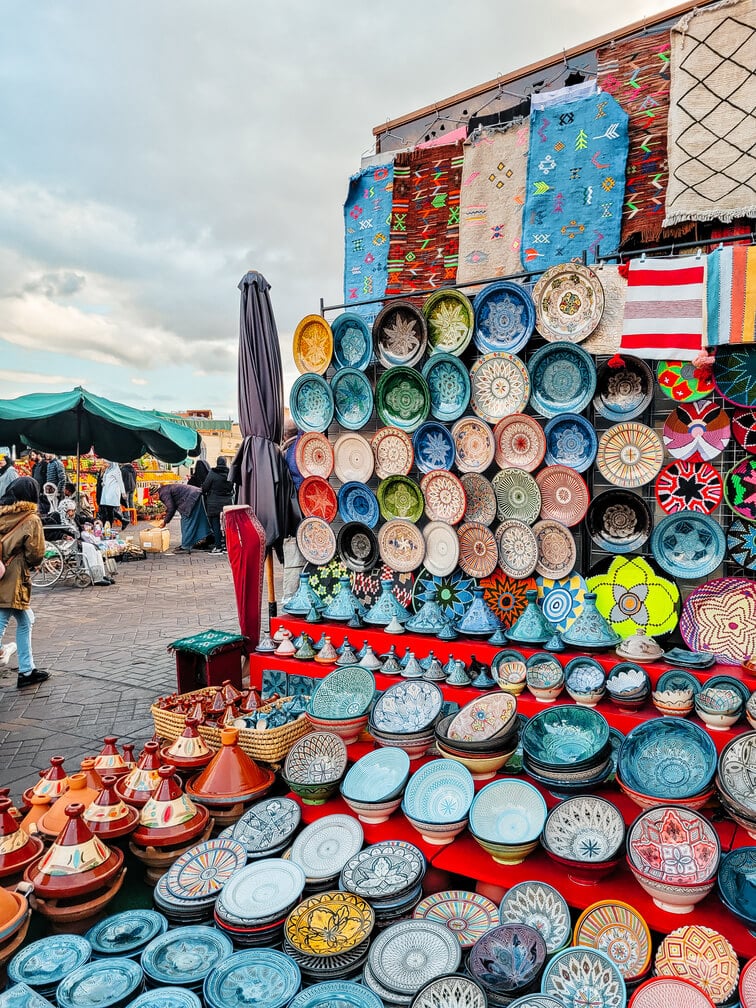
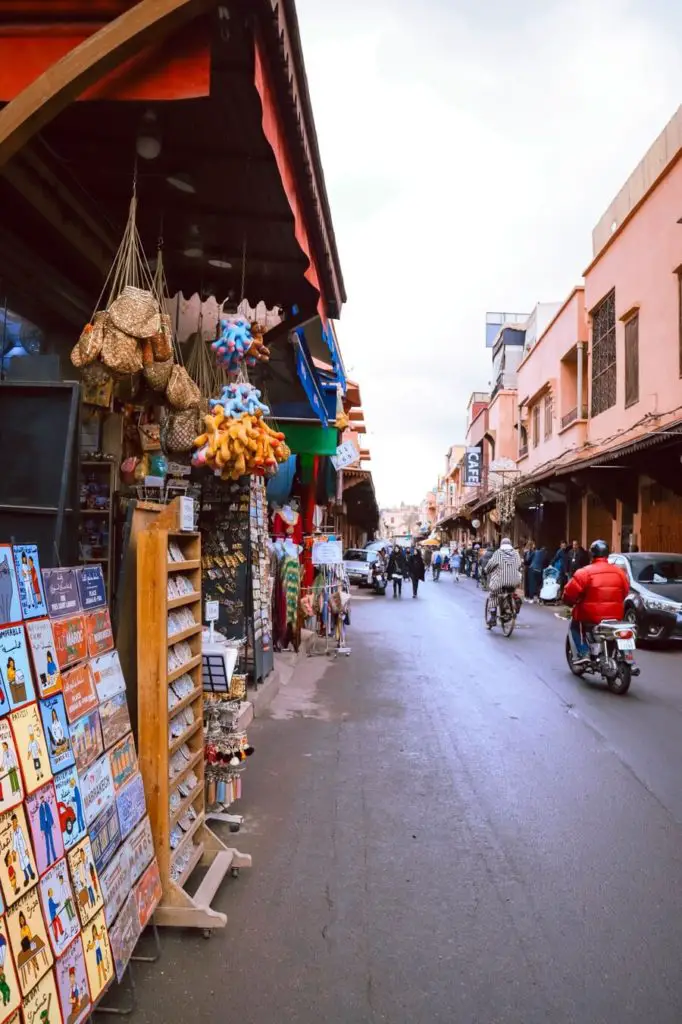
But visiting this part of the city requires extra care. Here are some tips for visiting the medina in Marrakech:
- Take extra care with your belongings. If you are travelling with a backpack, I suggest carrying your bag at the front on the most crowded streets.
- Beware of motorbikes in the streets. Even if the streets are full of people, motorbikes drive nevertheless, and some of them are quite fast.
- Go prepared to bargain. It’s the highlight of any purchase in any Moroccan market.
- Google Maps works surprisingly well. Don’t accept suggestions from strangers. Thank them for the suggestion and keep heading towards your destination. Try not to carry your mobile phone in your hand with Maps open so that you don’t look so “lost”.
Marrakech 2 Days Itinerary – Day 2
» Ben Youssef Medersa
The second day of this itinerary starts in one of my favourite places. In fact, this is one of the best things to do in Marrakech! The Ben Youssef Medersa is the largest in Morocco, with some jaw-dropping details.
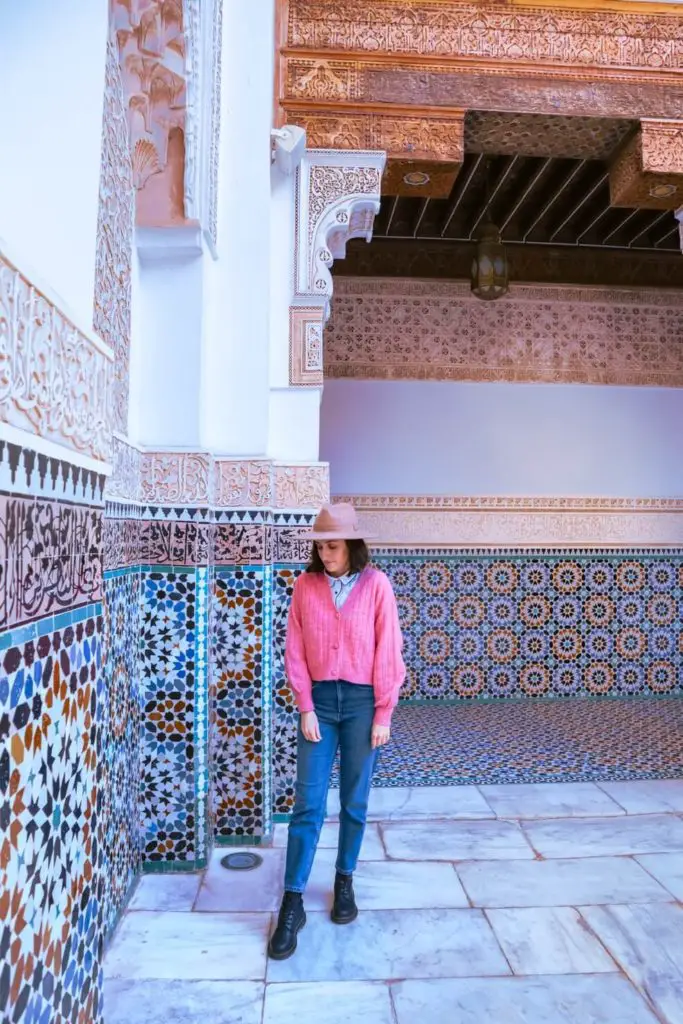
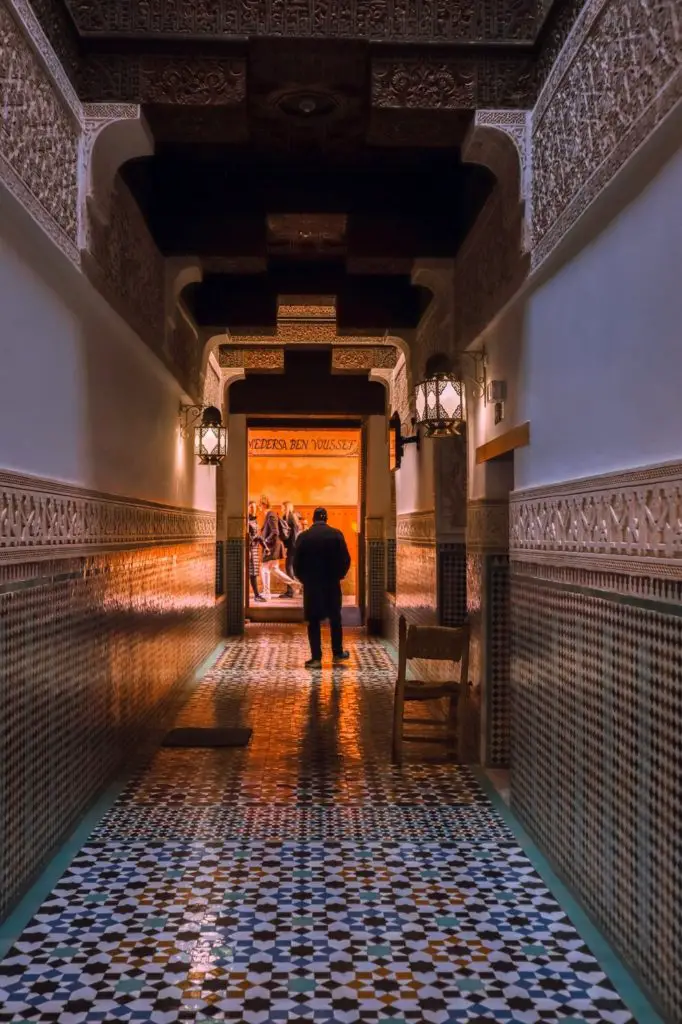
A medersa is a school of Islamic studies. Built in the 14th century, this medersa, named after the mosque located next to it, once accommodated more than 800 students.
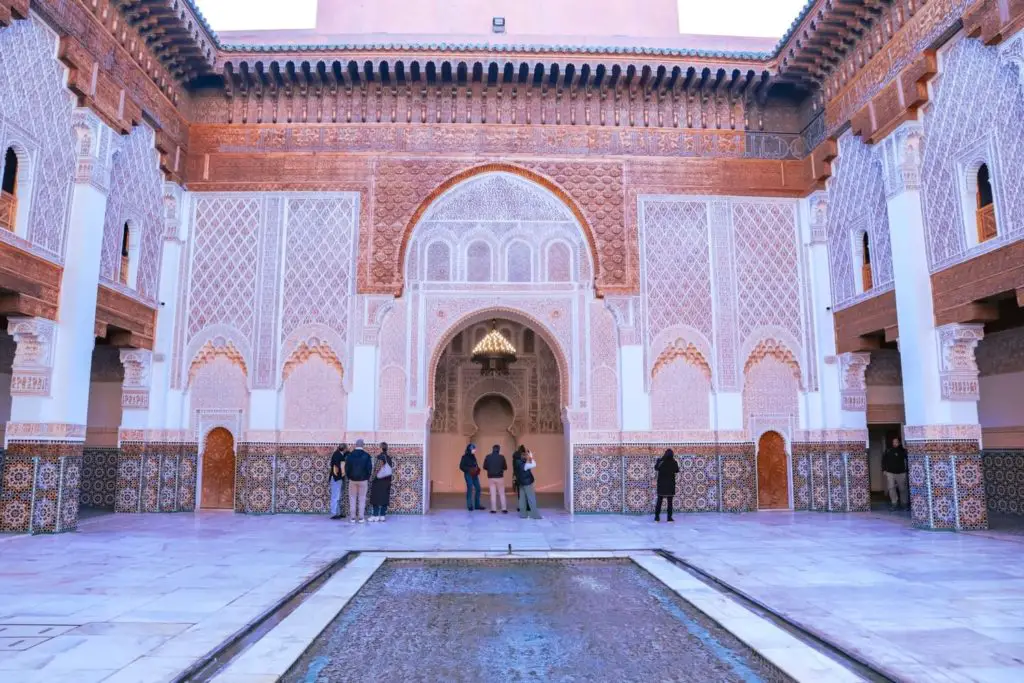
After having closed in the 1960s, it reopened in 1982 as a historic space.
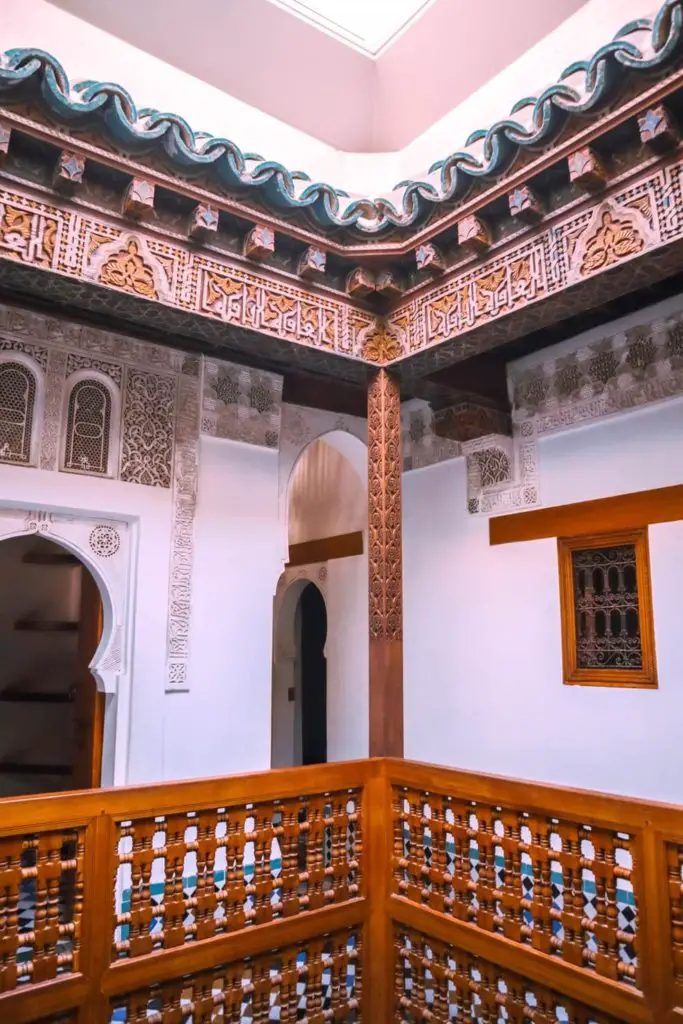
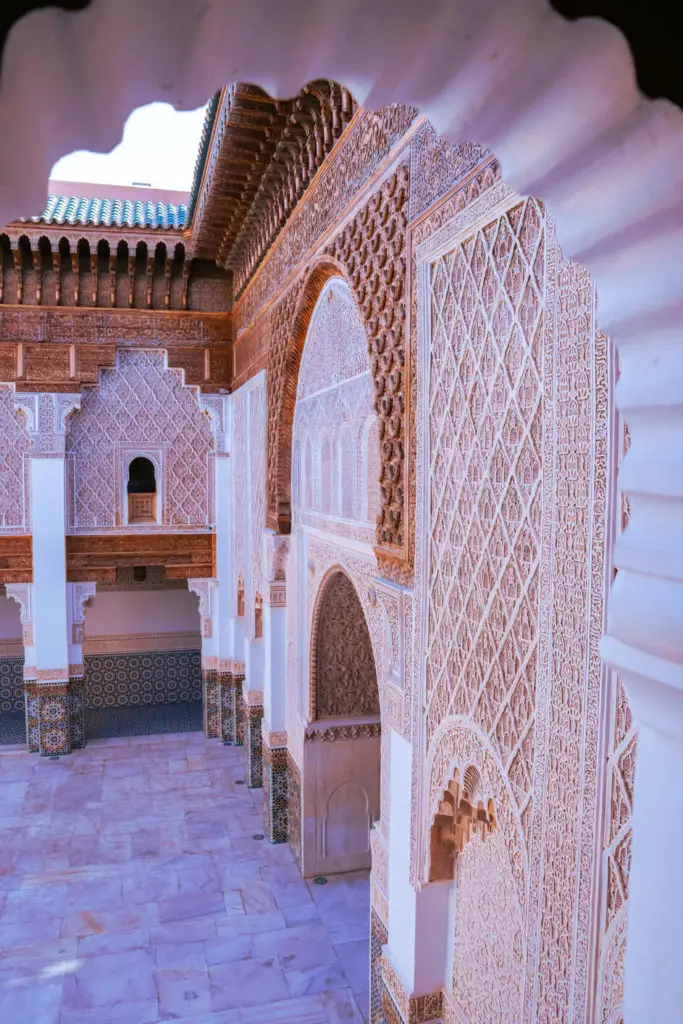
📝 USEFUL INFORMATION: Admission to the medersa costs 50 MAD (~4,8€) and is open daily from 9 am to 7 pm. Here, too, only cash is accepted. Check out the most updated info to visit this incredible place.
» Almoravid Koubba
Built in 1064, the Almoravid Koubba is a medieval construction and the only trace of the Almoravids in the city of Marrakech. It was used to supply water to the population and was one of the first fountains in the city.
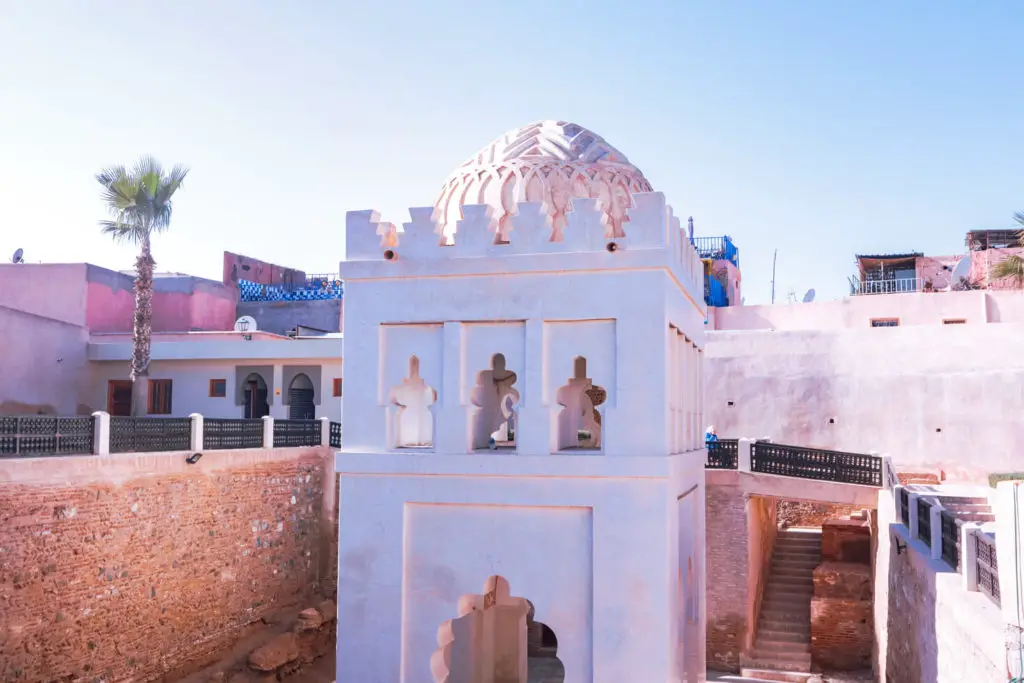
» Le Jardin Secret (Secret Garden)
The Le Jardin Secret is a small garden that we can visit amid the confusion of Marrakech. Its origin is related to the Saadian dynasty and was rebuilt in the mid-19th century.
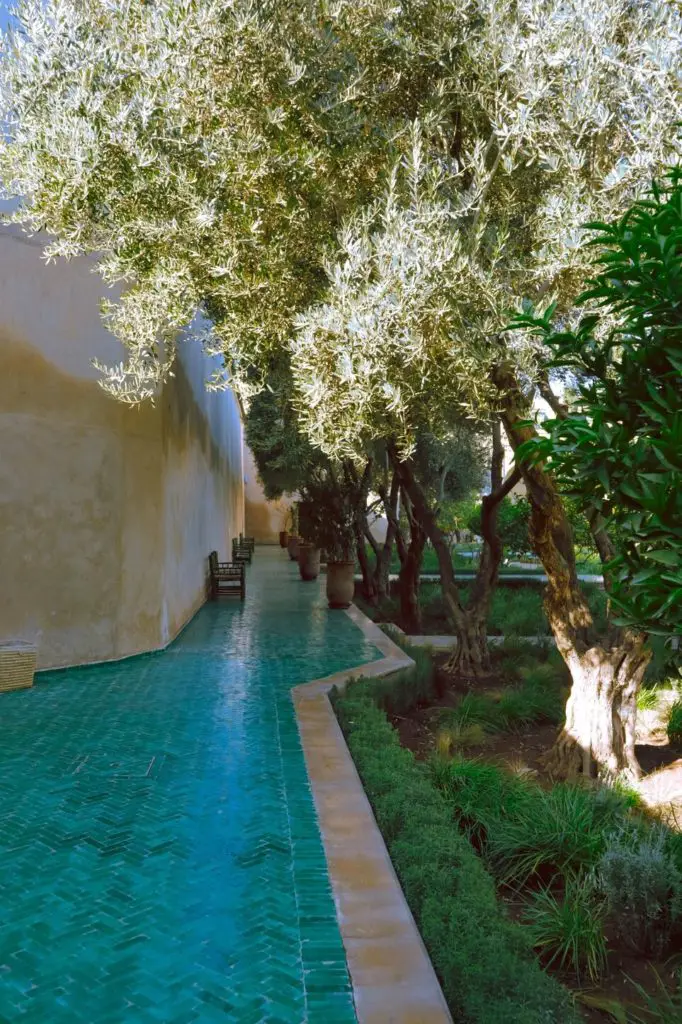
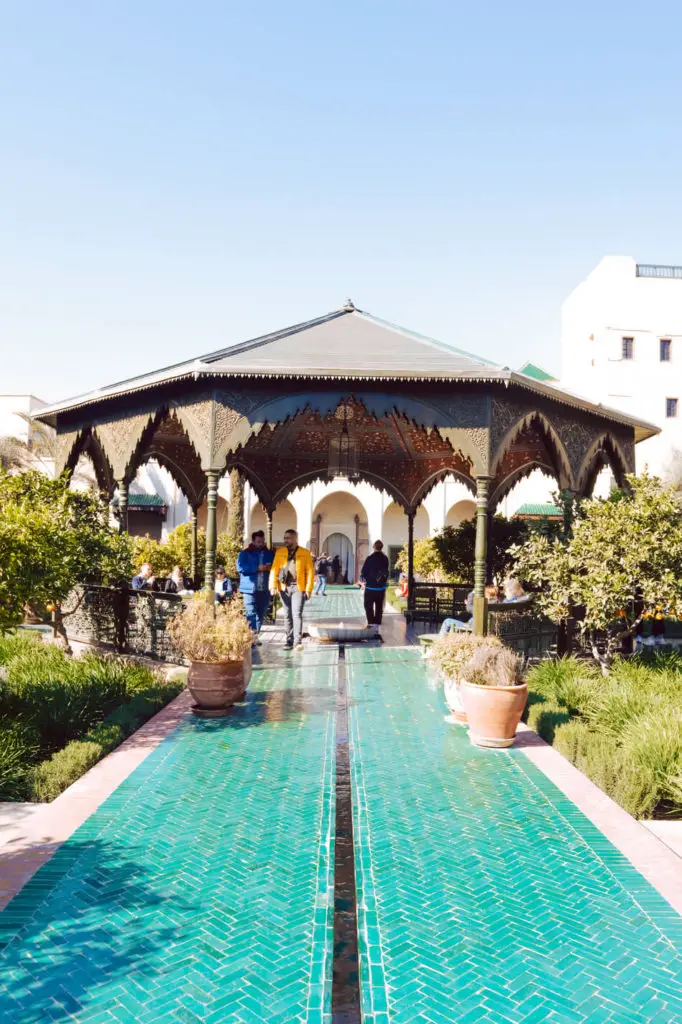
In my opinion, although the garden is cute and neat, the entrance fee to visit it is a bit high for the visit itself.
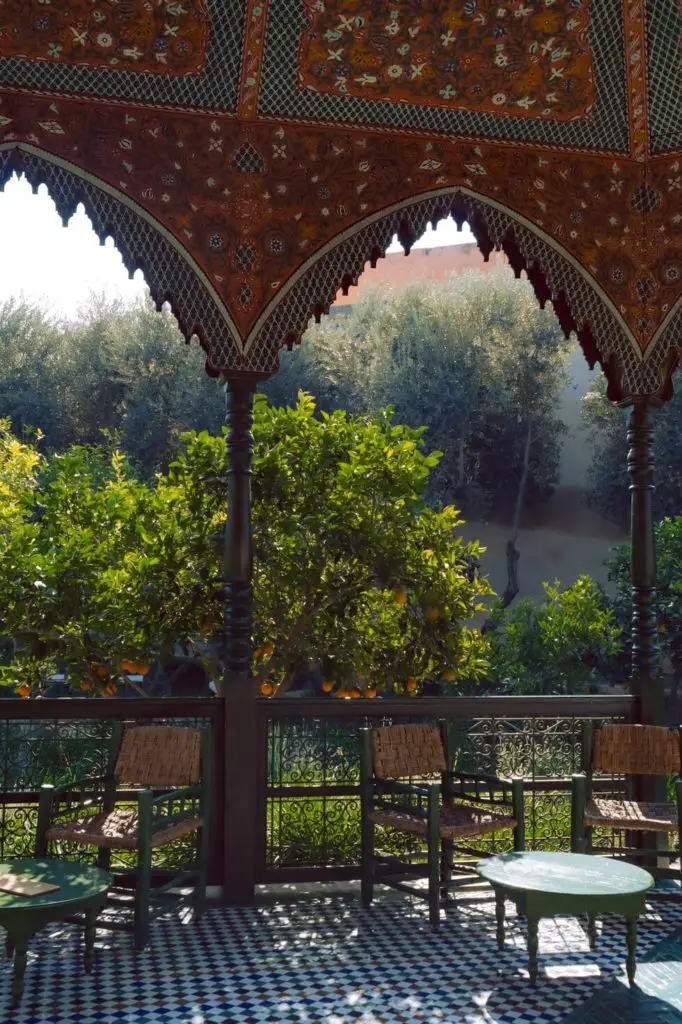
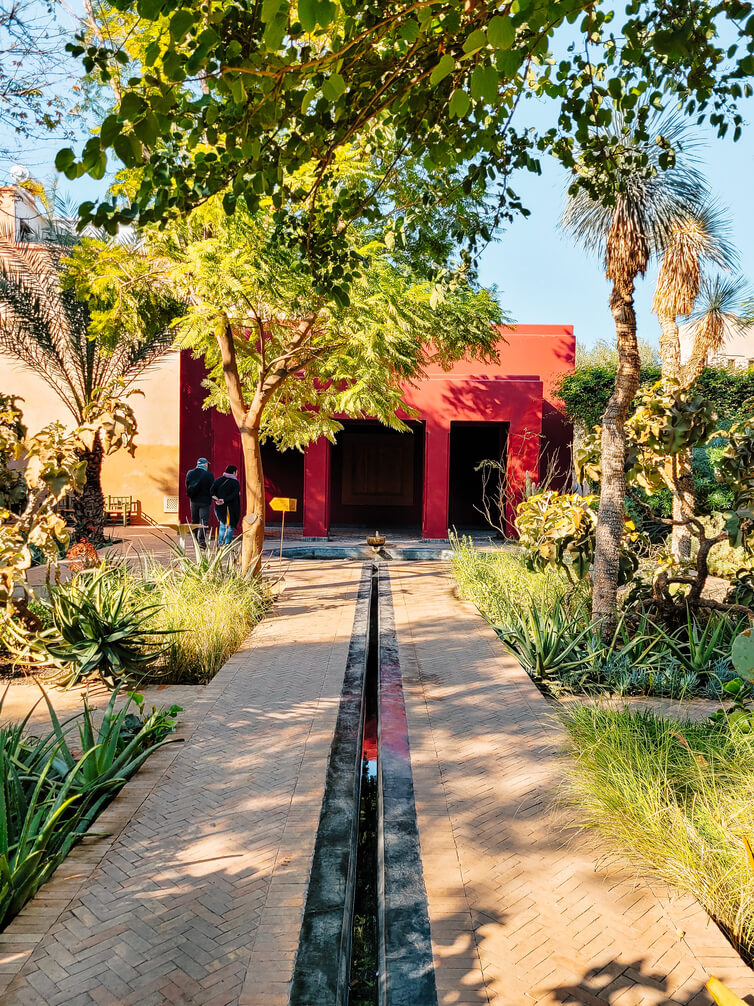
📝 USEFUL INFORMATION: The opening hours of the garden vary depending on the time of year, so I recommend you check the most up-to-date information. The price of each visit is 100 MAD (~9,5€) and 40 MAD (~3,8€) if you also want to climb the tower. You can pay by card here!
» Jardin Majorelle (Majorelle Garden)
The Majorelle Garden is one of the most photogenic places in Marrakech. It is actually a botanical garden, where we also find the museum of Berber culture. The garden combines the concepts of Islamic gardens with the luxury of tropical gardens.
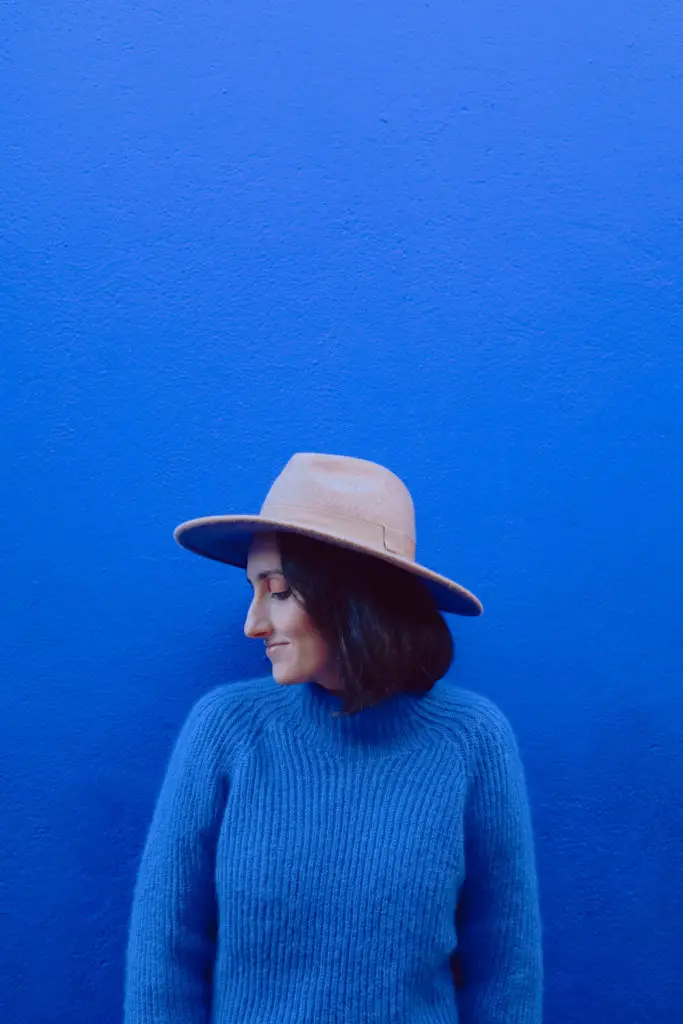
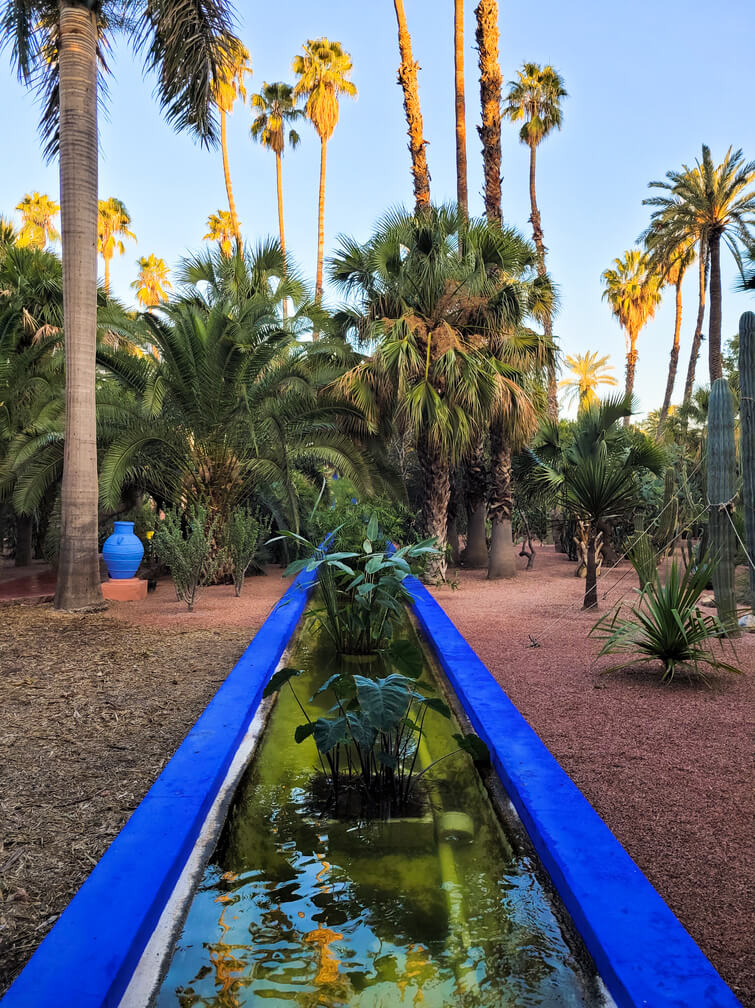
The garden is already located in the new part of the city and was built in 1931 by Jacques Majorelle. Years later, it was bought by Yves Saint Laurent and Pierre Bergé.
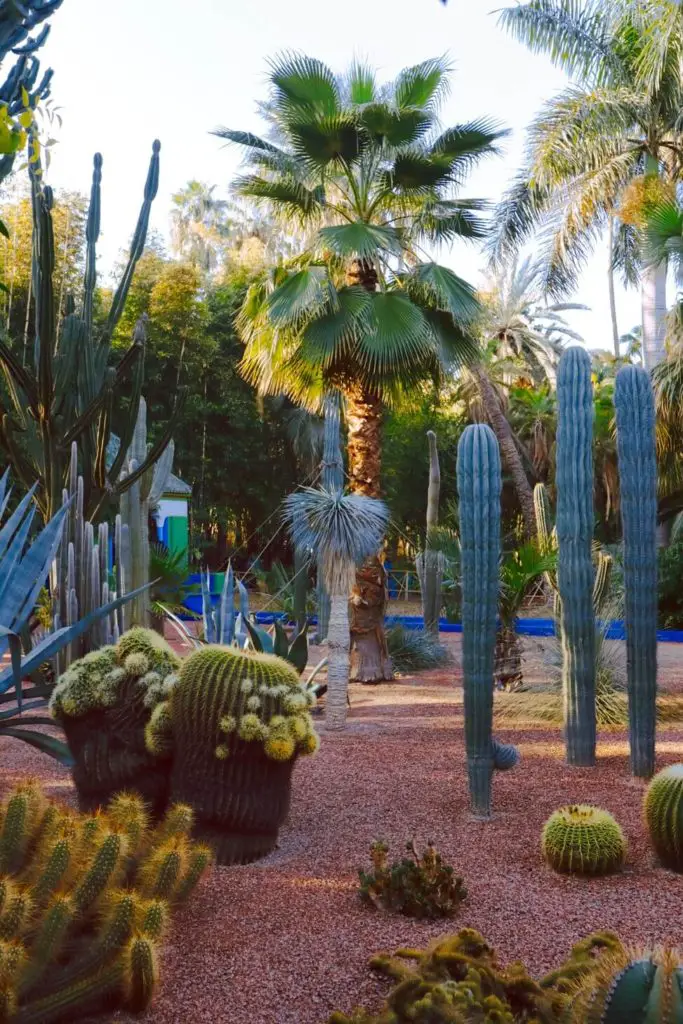
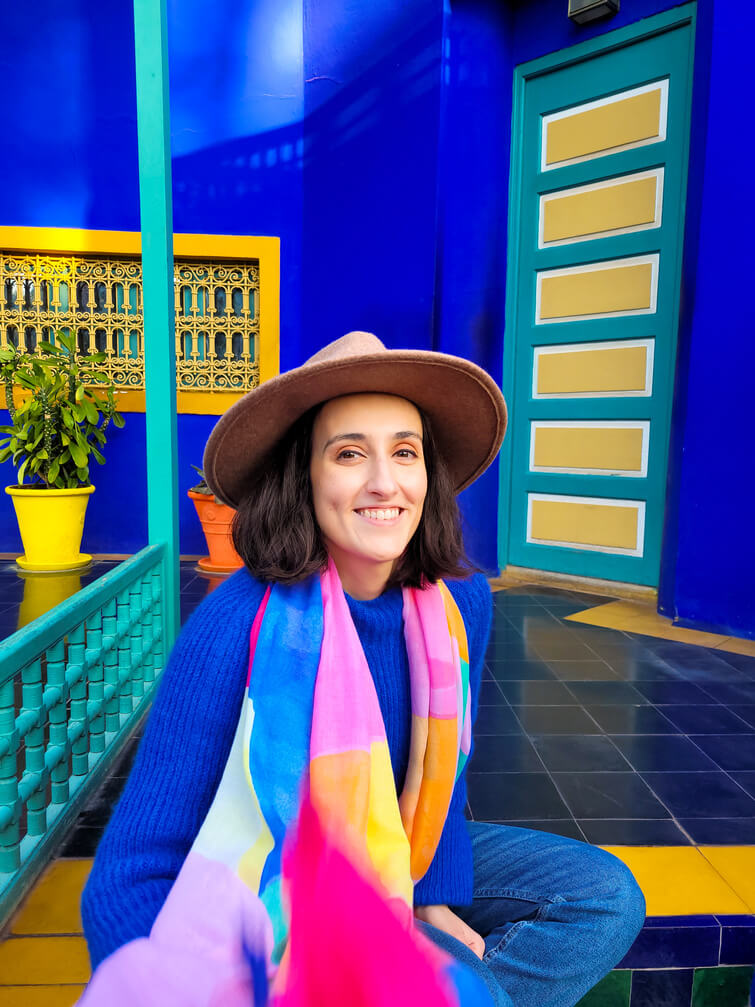
The space is small and this is one of the most expensive points of interest on this Marrakech itinerary. However, for those who like this type of place, I think it’s well worth the visit.
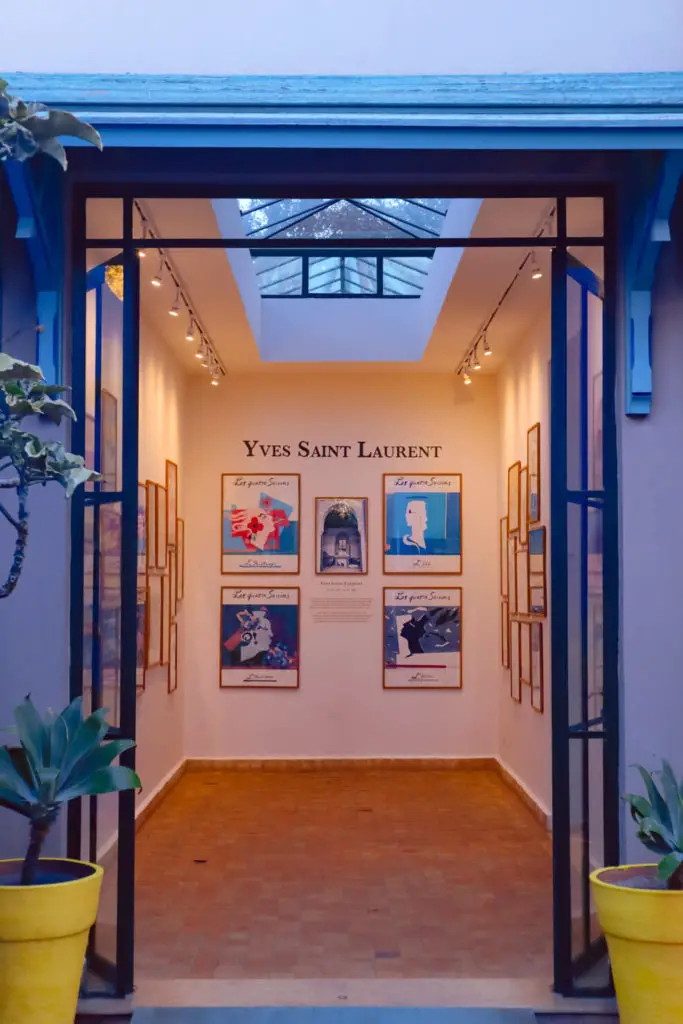
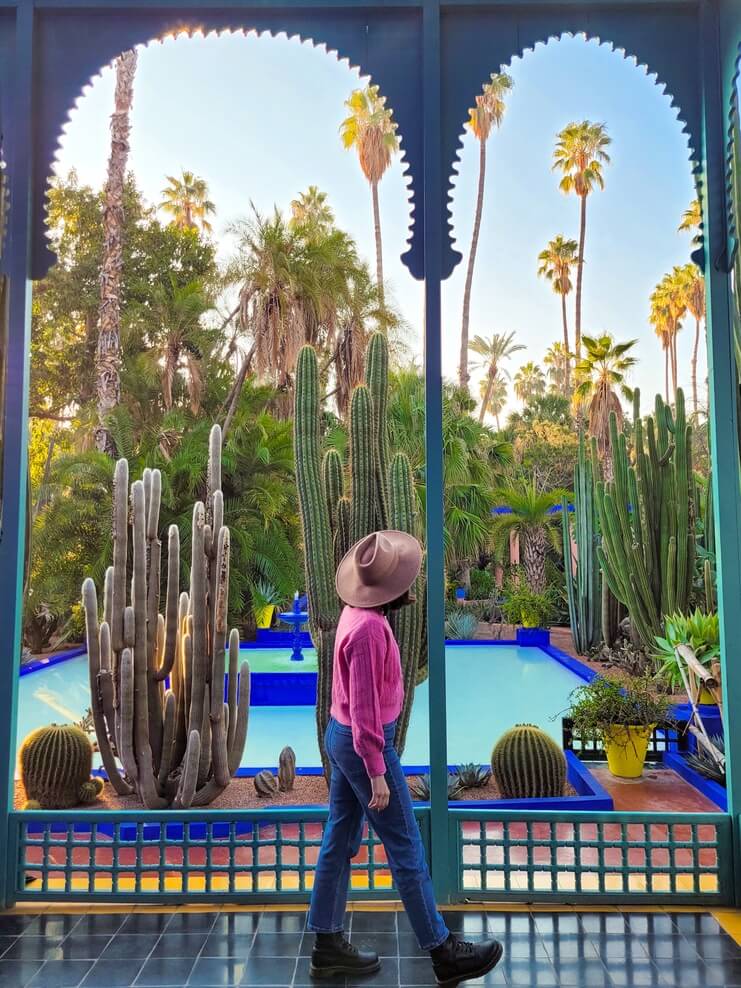
📝 USEFUL INFORMATION: Entrance tickets to the Majorelle Garden must be purchased in advance online for a specific time slot. In fact, they can only be purchased online. The garden is open daily from 8.30 am to 6 pm and admission costs 170 MAD (~16,1€). I suggest you check the most up-to-date information about Jardin Majorelle.
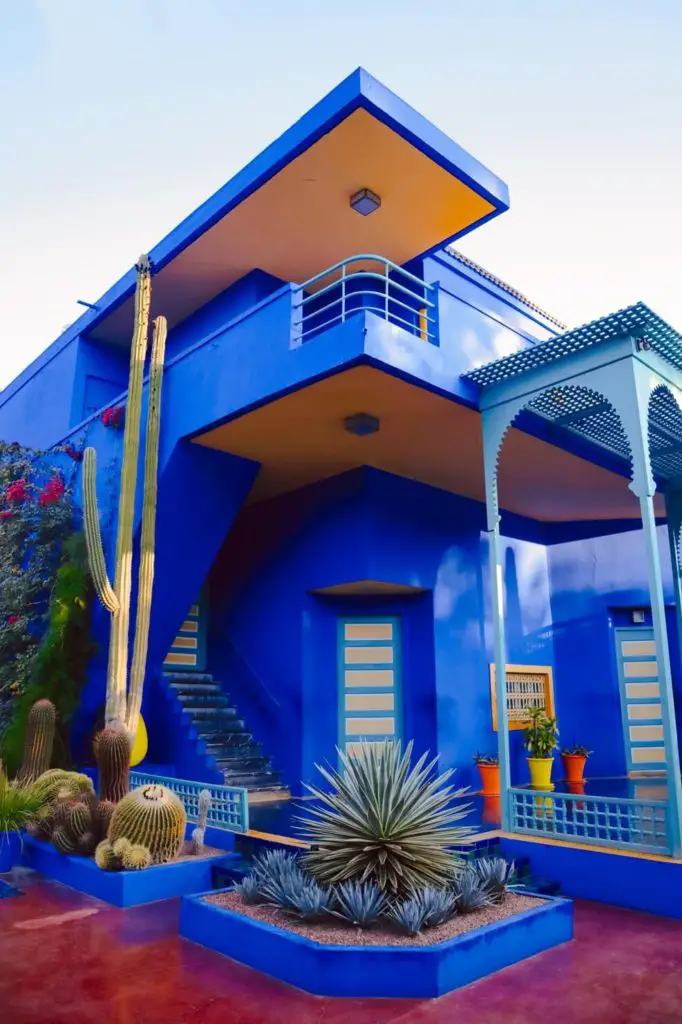
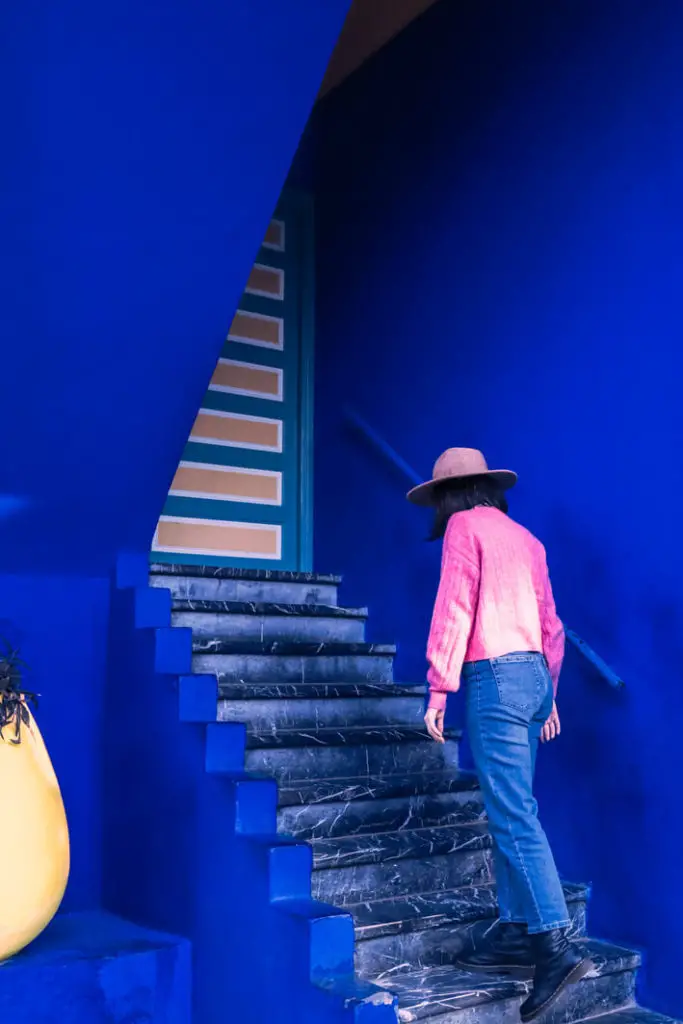
Take advantage of your visit to Jardin Majorelle to explore the Yves Saint Laurent Museum. Here, you’ll discover the designer’s iconic creations and his deep connection to Morocco.
» Gueliz
Taking advantage of the visit to the Majorelle Garden, I also suggest a visit to the newest and most modern neighbourhood in Marrakech.
This neighbourhood will easily transport you to another place, as it has nothing to do with anything you have visited so far in Marrakech.
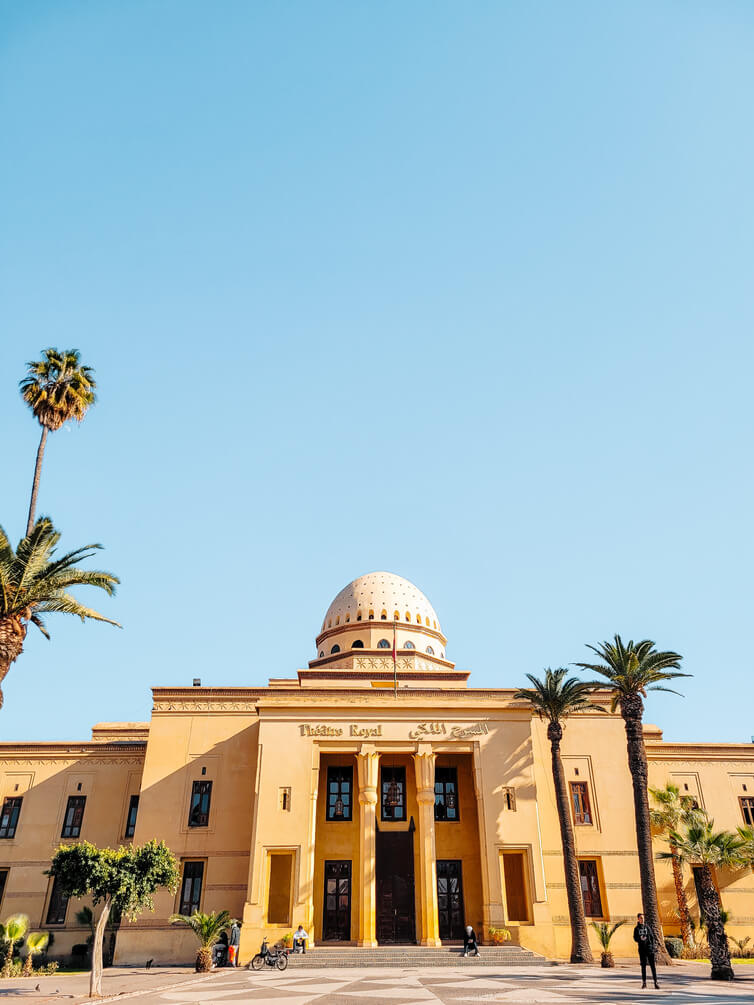
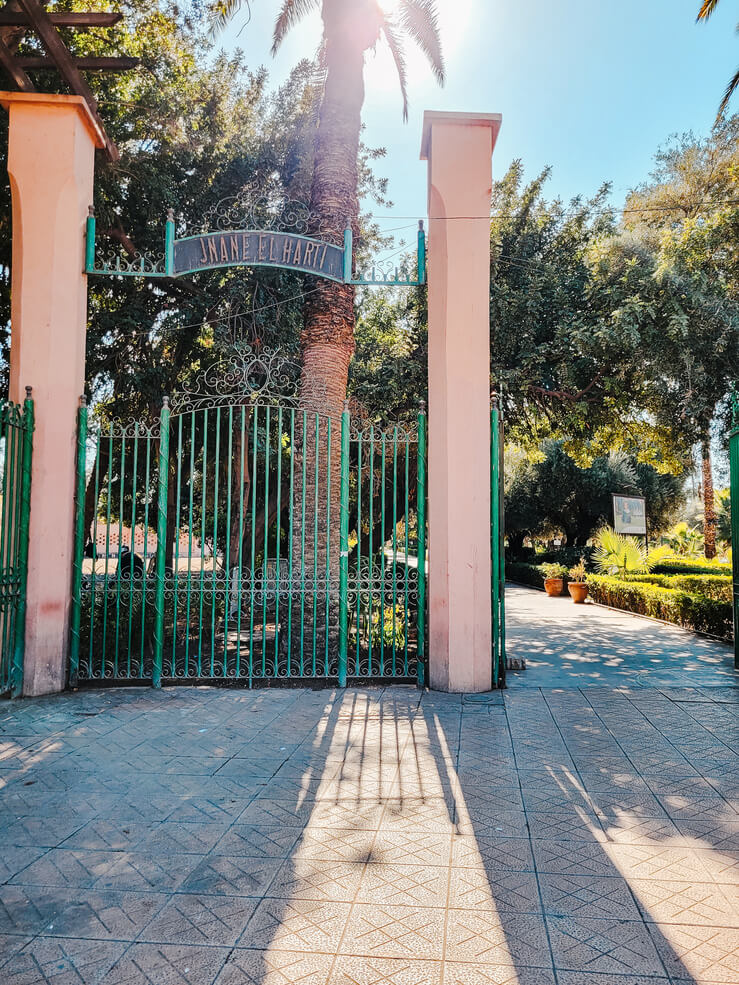
Some of the most emblematic places in this neighbourhood include the Royal Theatre, the Yves Saint-Laurent Museum and El Harti Park.
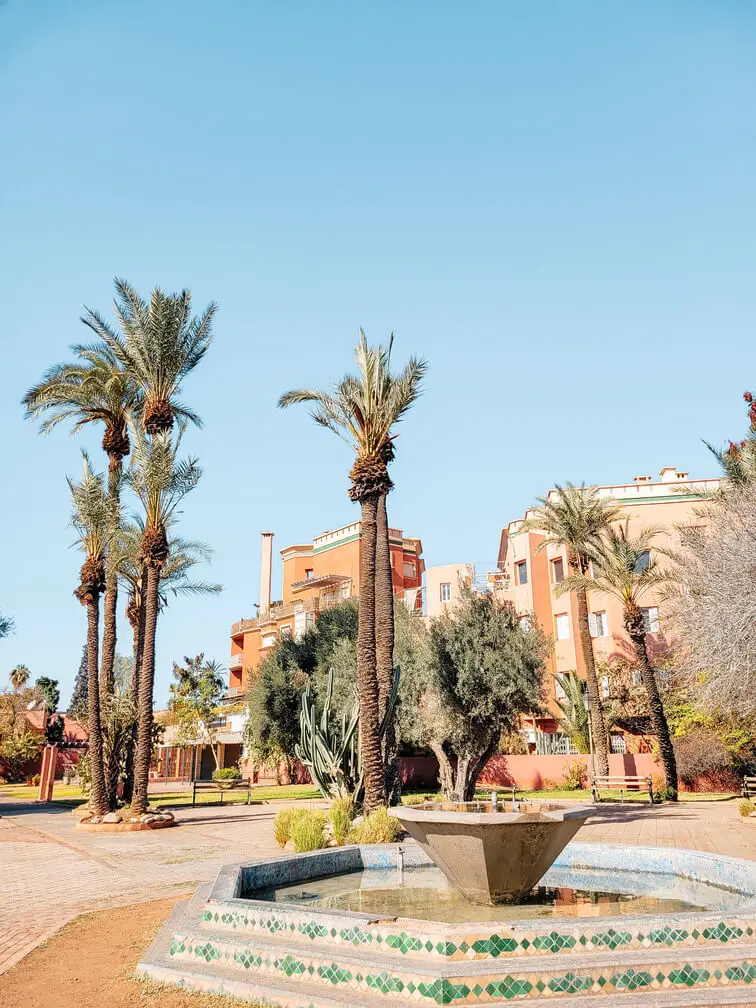
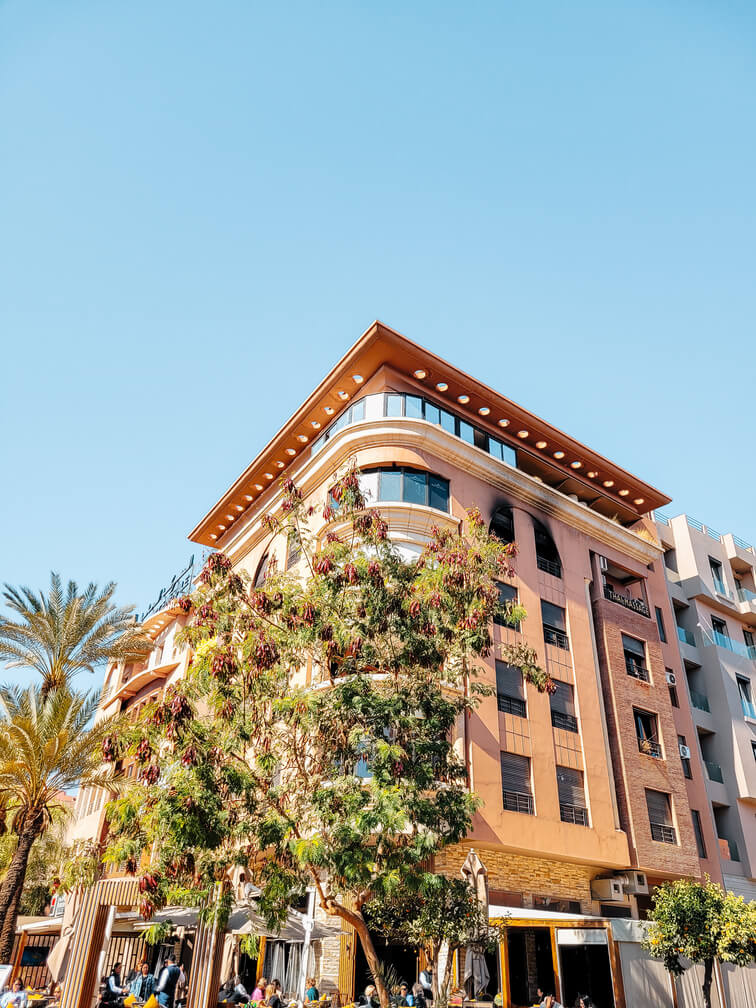
» Menara Gardens
The Menara Gardens are another of the main points of interest and worth visiting in Marrakech. Its name comes from the pavilion in the centre of the park, which was built by the Saadians.
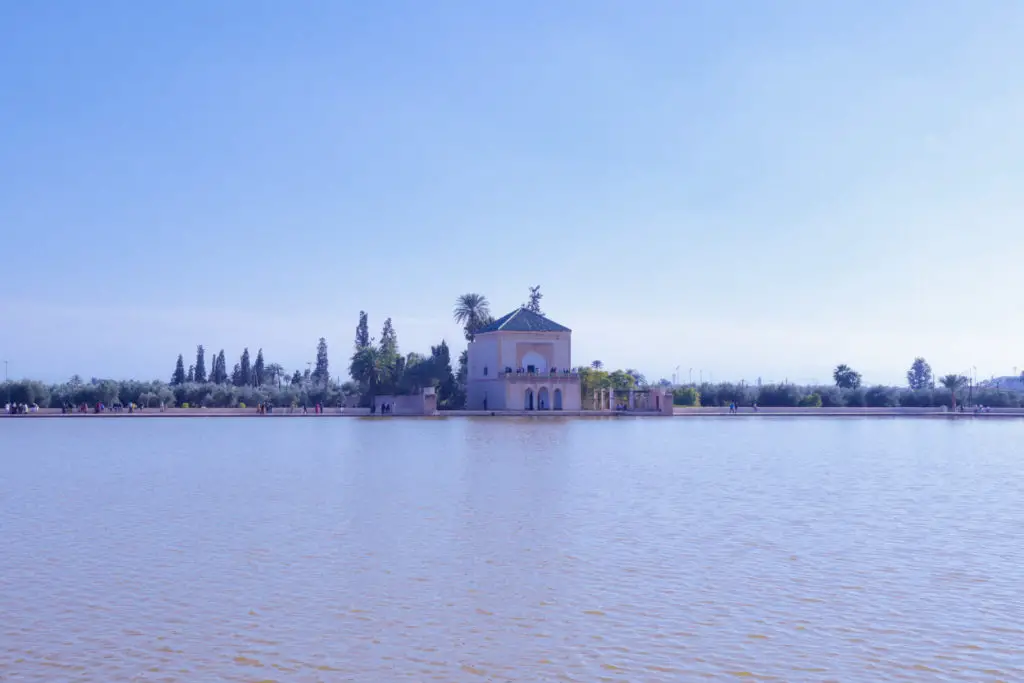
This is a favourite spot for locals at the weekend, so you can expect hundreds of families picnicking and just hanging out.
» Food tour
If you still have time available on this second day, I suggest you go back to the medina (the easiest and fastest way is by taxi) and try out a food tour.
It was one of the activities I did in Marrakech and I highly recommend it 😄. Besides being a way to get to know the local cuisine, it’s a great opportunity to try some street food.
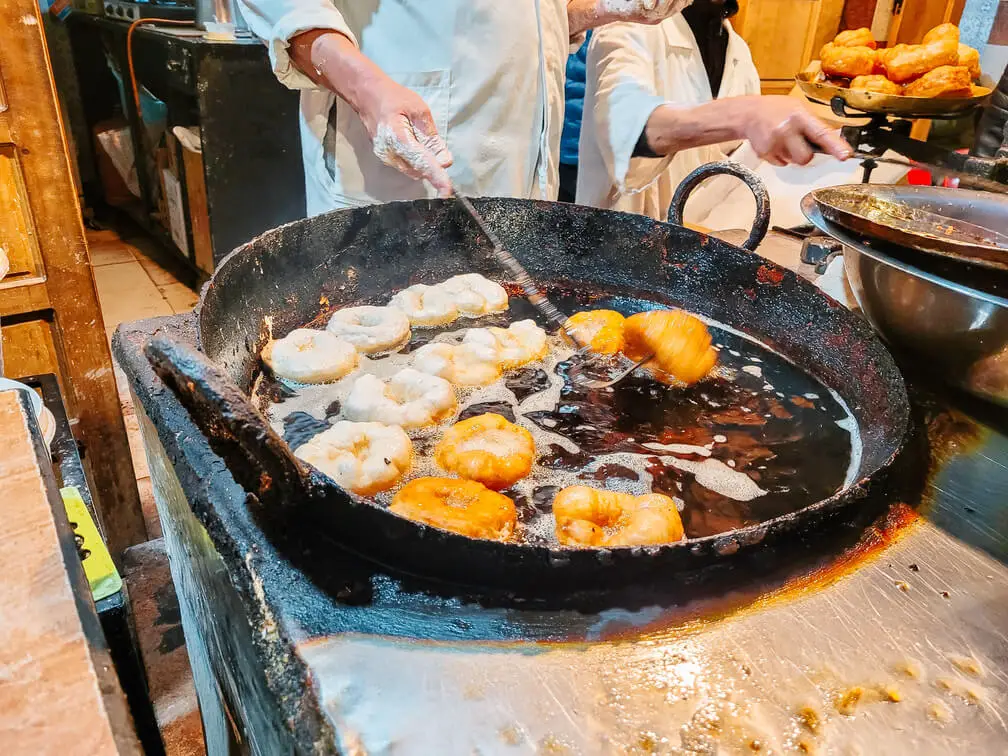
Read more about my experience of taking a food tour in Marrakech.
Restaurants in Marrakech
Moroccan cuisine is absolutely delicious! While I didn’t have the chance to try a wide variety of restaurants during my trip, here are a few that I personally enjoyed:
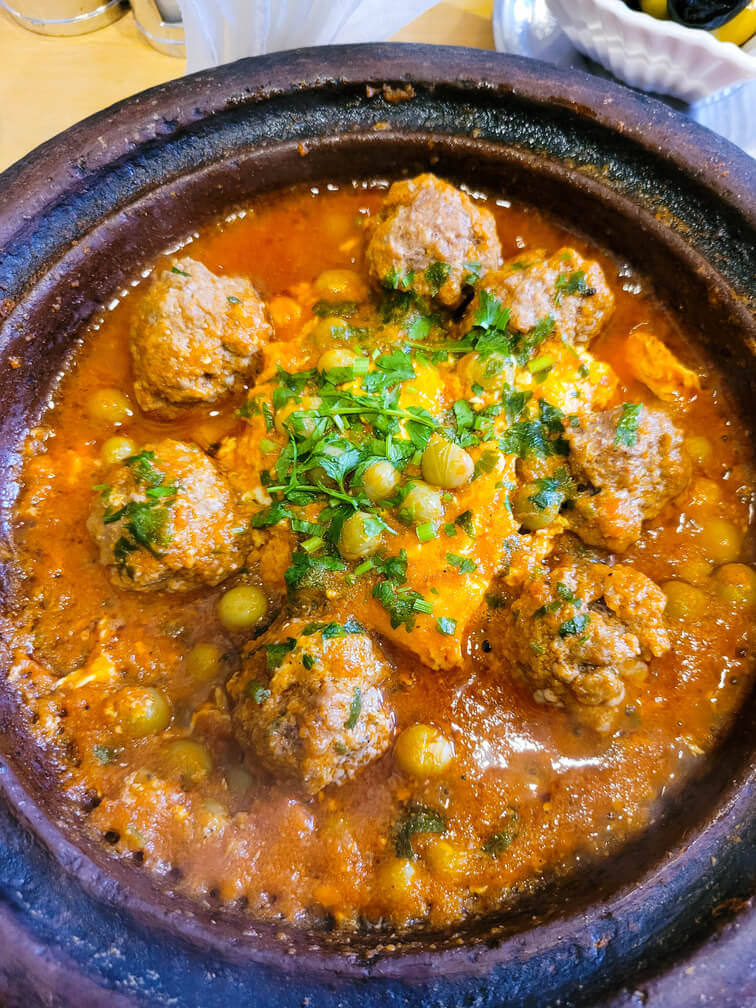
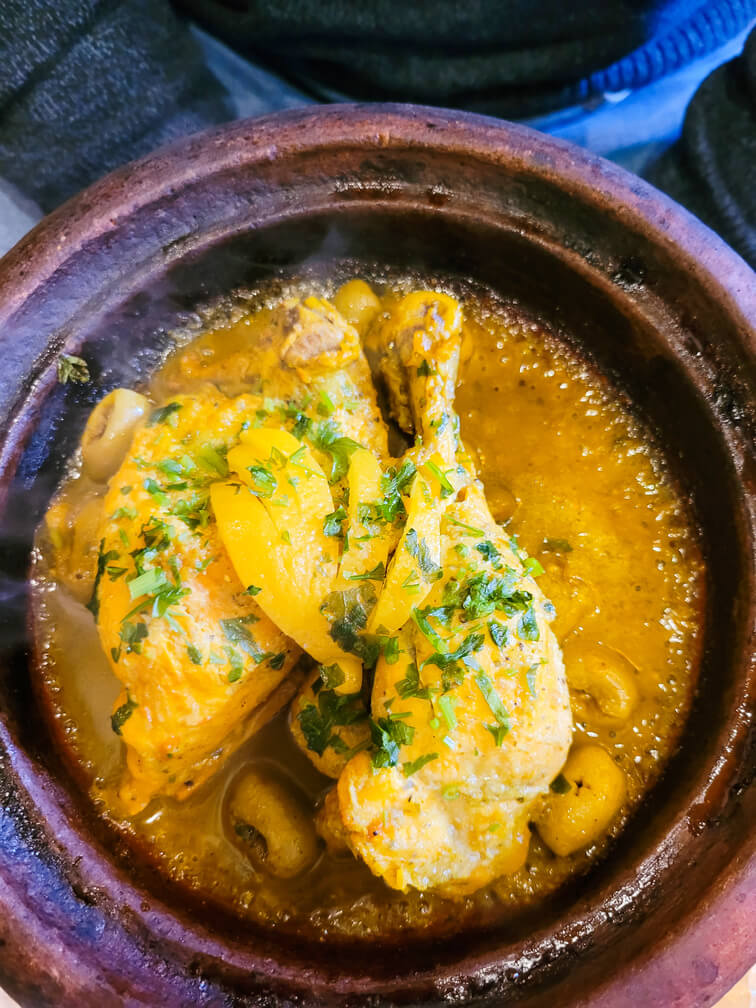
- Bakchich Cafe (€): Very friendly service. We tried two tagines and they were great.
- Café Restaurant Dar L’hssira (€): A welcoming space and very affordable prices. We tried the chicken kebabs and the pastilla
- Café des Epices (€€): Very cute place and I tried tagines again. As it is a better-known place, the prices are higher.
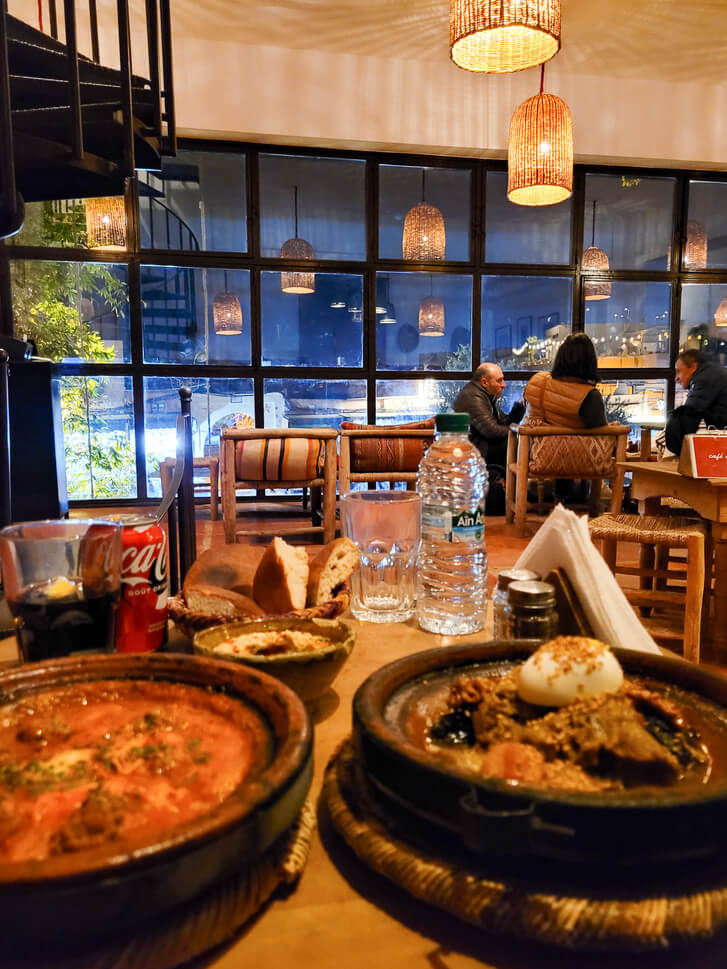
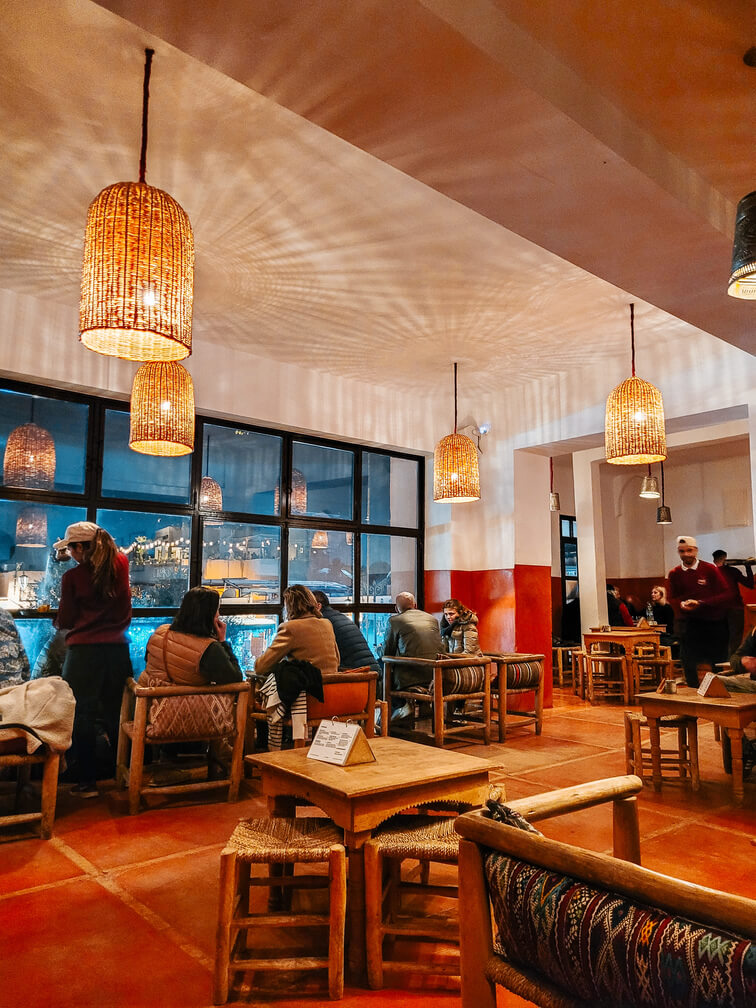
Although you can learn a lot more about traditional Moroccan food in my Marrakech food tour post, I leave here a short list of delicious food you should try when in Marrakech:
- Msemen: crusty bread
- Baghrir: a kind of pancakes
- Chebakia: a sweet, usually consumed to break the fast of Ramadan
- Brochettes: kebabs of various types of meat
- Khobz: bread baked in communal ovens
- Couscous
- Tajine: made on a clay dish and baked in the oven. There are several types of tajine.
- Harira: tomato-based soup, chickpeas, pasta and rice
- Tanjia: clay pot in which lamb is usually cooked
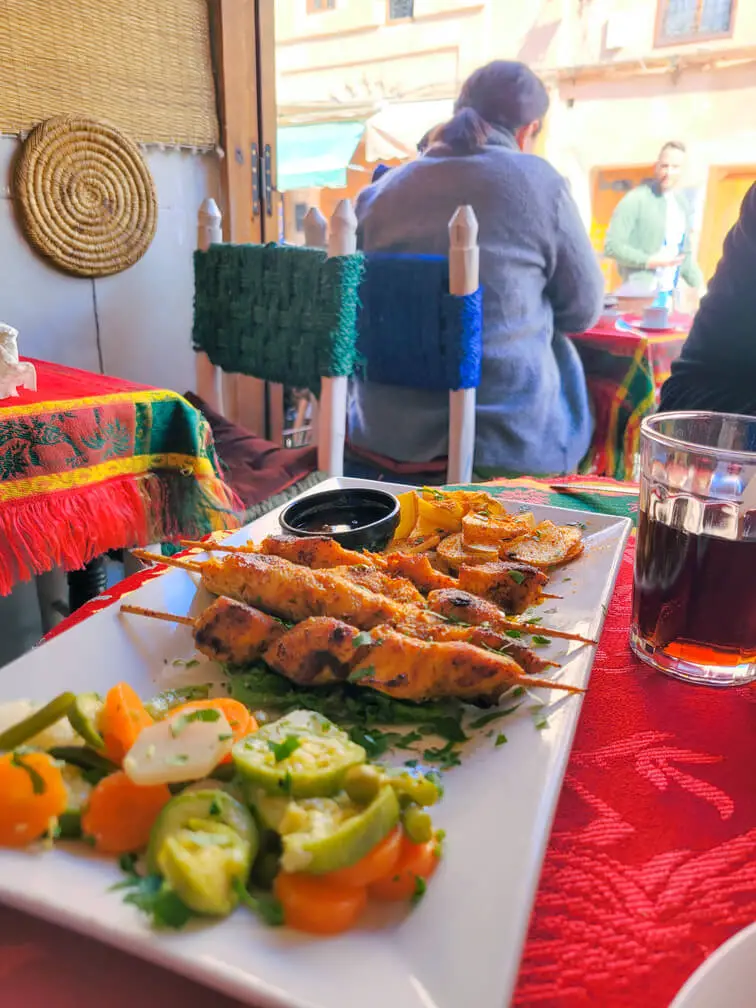
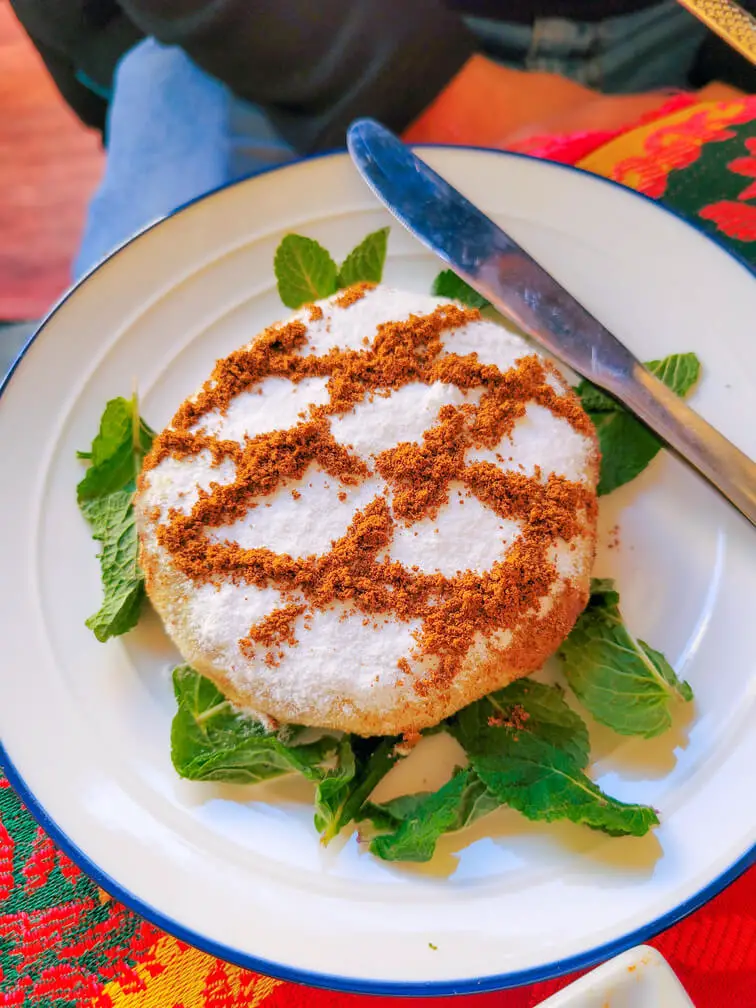
What is the best time of year to visit Marrakech?
When talking about Morocco, I believe most people immediately think of hot weather. And it is true that Morocco, and more specifically Marrakech, are very hot places. But they are not that warm all year round.
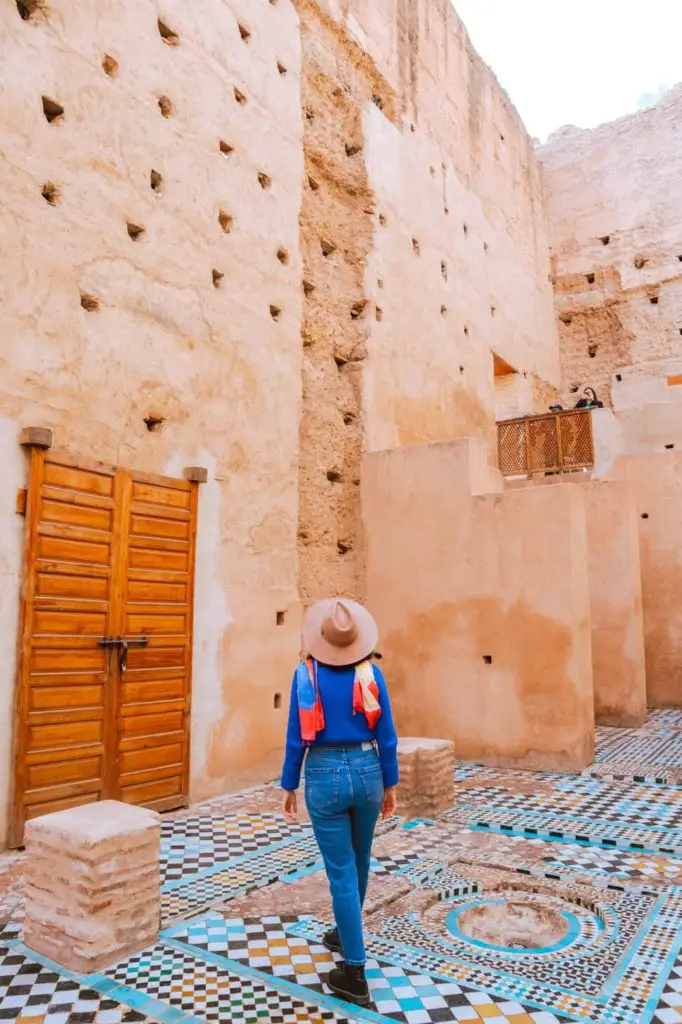
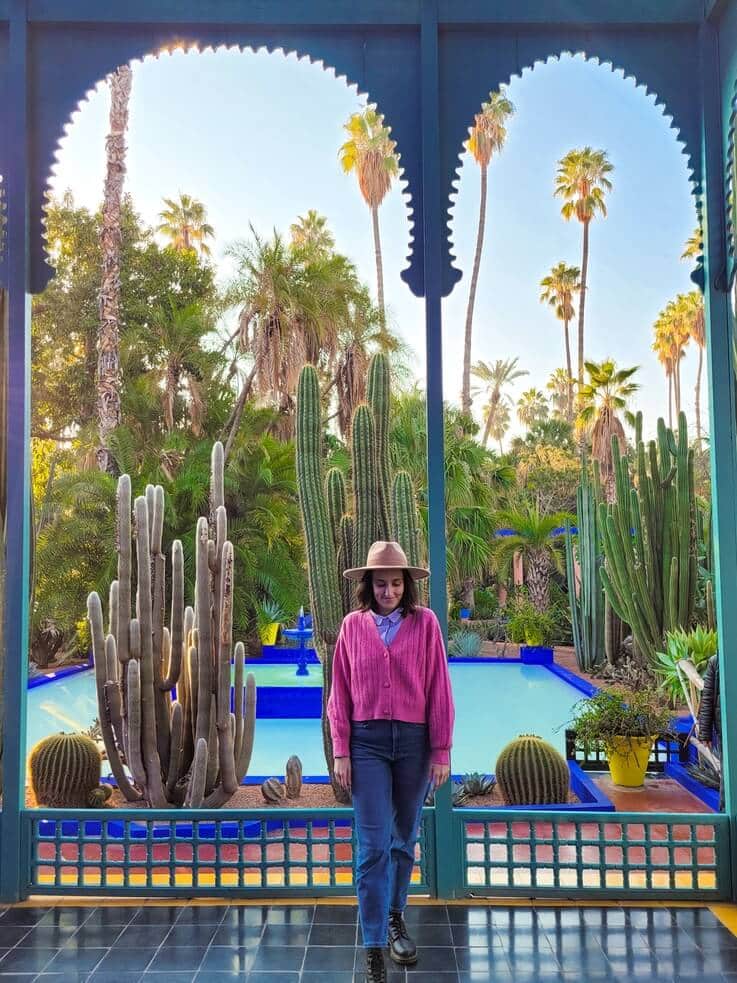
Winters tend to be cold, especially at night, as the city usually has a significant temperature range. So, if you choose to visit Marrakech in winter, bring some warm clothes. However, there is a low chance of rain (in winter, on average, it rains only for 3 days).
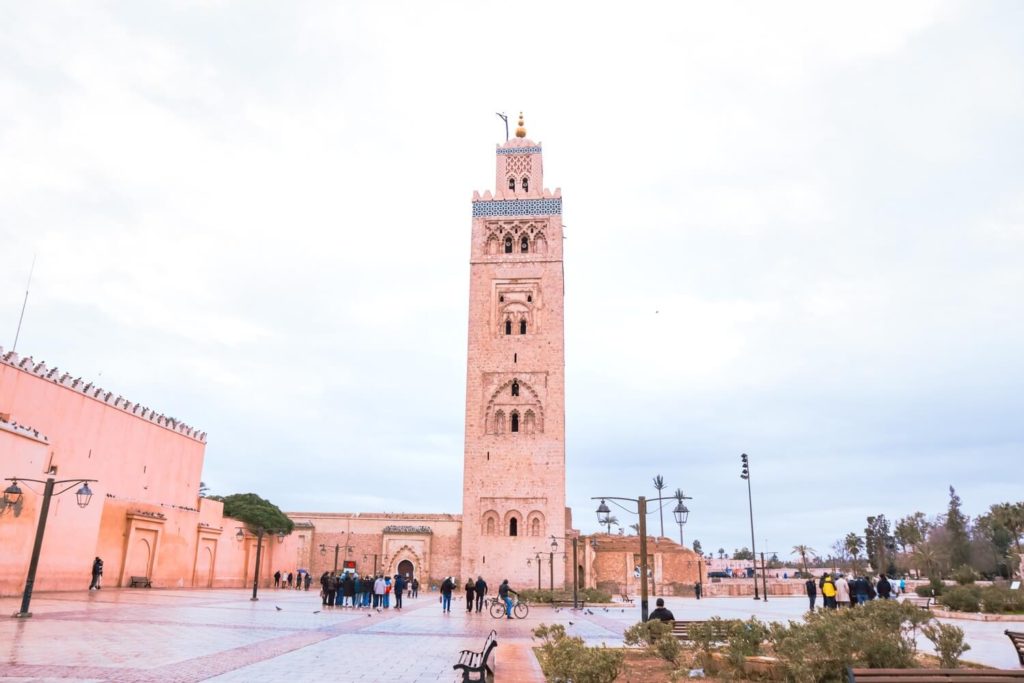
On the other hand, the summer months (June to September) get too hot, which can make your visit a bit uncomfortable. Therefore, I recommend visiting Marrakech when the temperatures are milder, such as March to May or October to November.
How many days in Marrakech?
Marrakech is a very interesting city, but despite this, for a first visit, 2 days are enough to get to know the main points of interest.
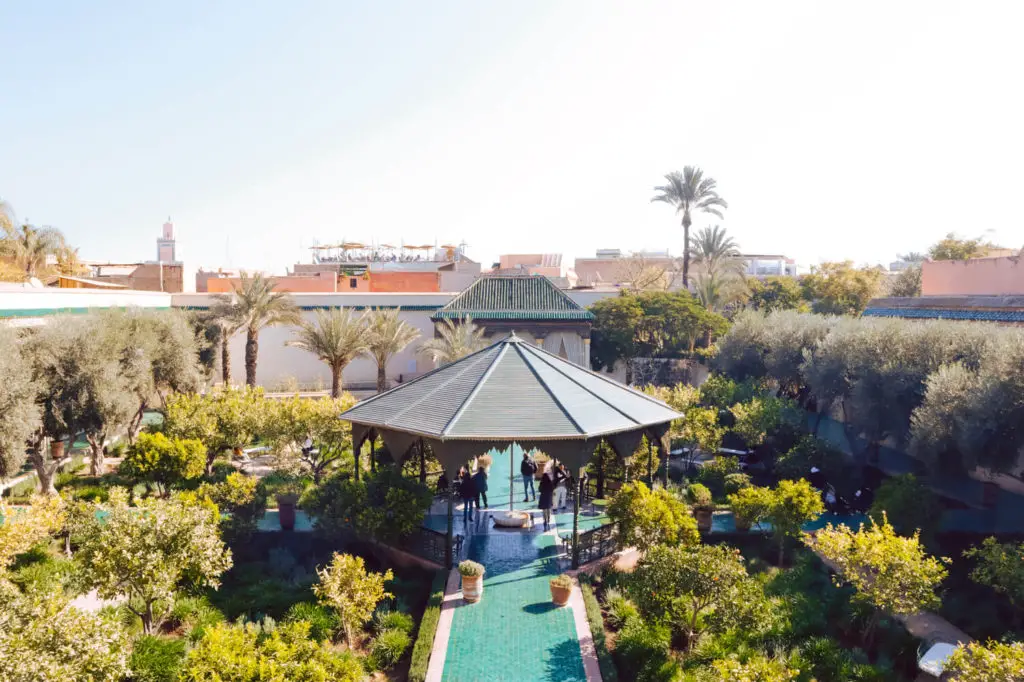
However, Marrakech is a city where part of the fun is living its whole vibe. So, I suggest 3 days to visit Marrakech at a slower pace.
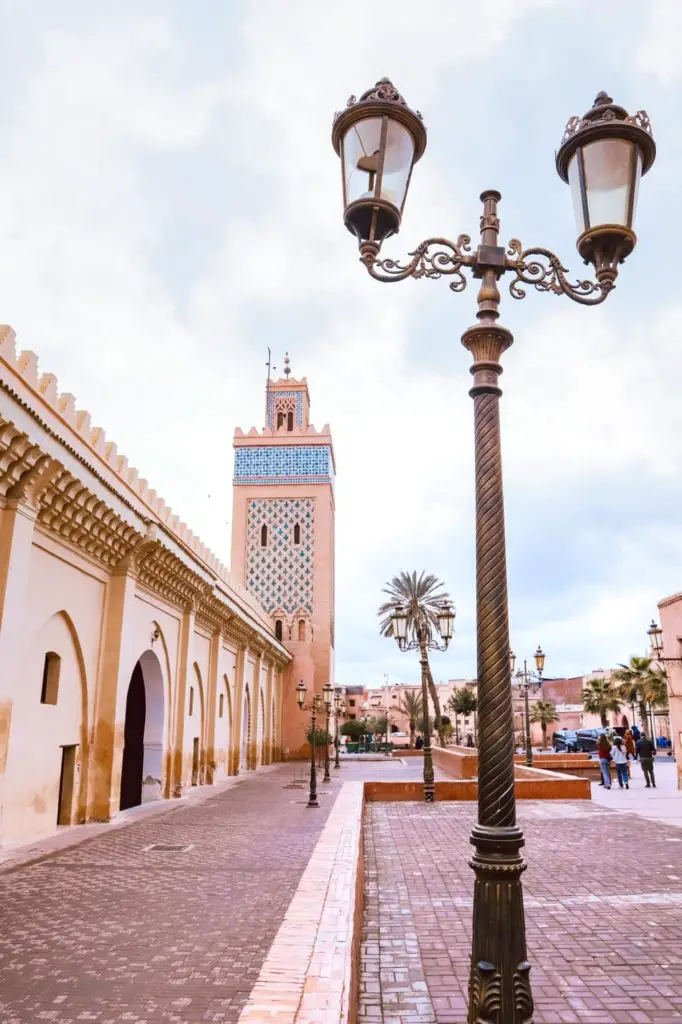
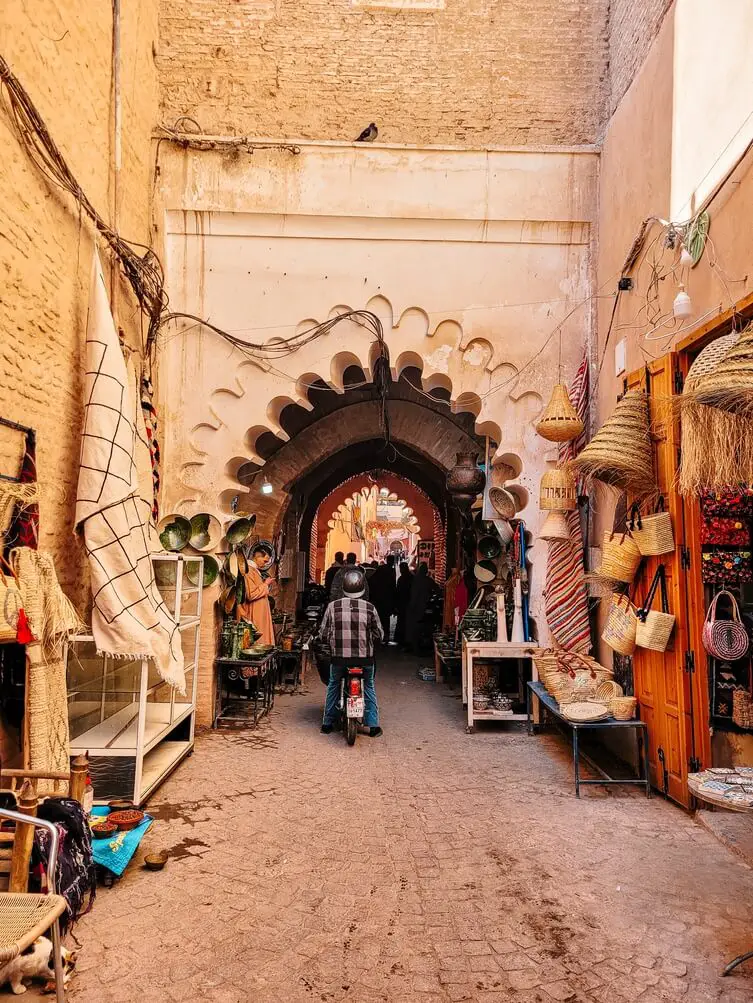
This way, you will have more time to enjoy the city’s markets or even one of the fantastic terraces spread all over the city.
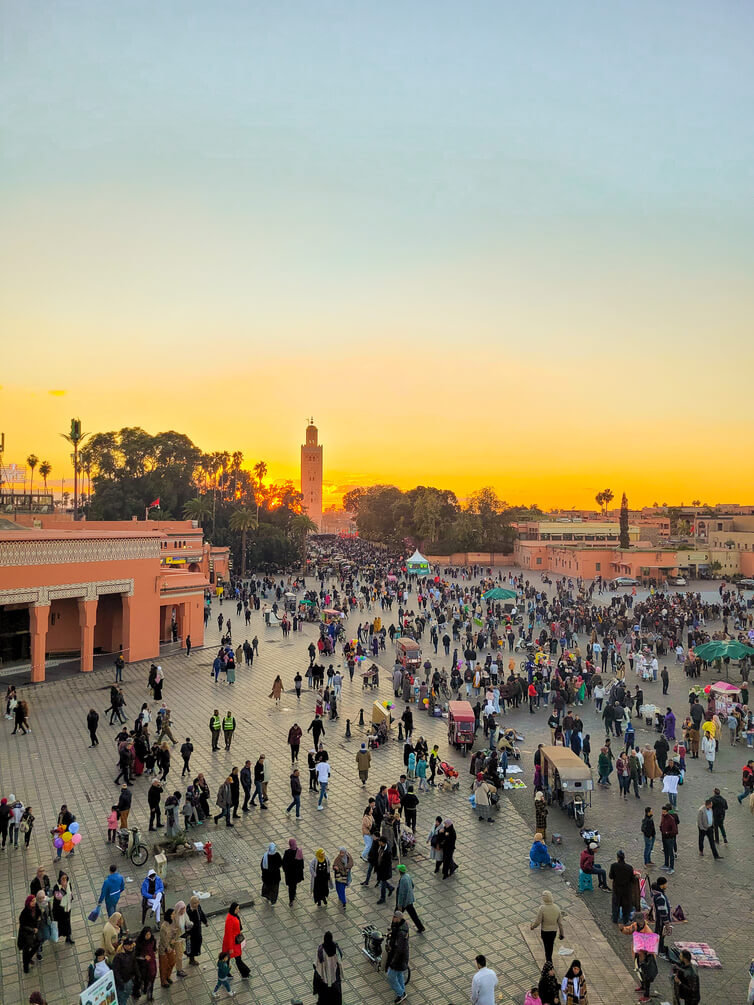

💡 EXTRA TIP: If you have more days available on your trip to Marrakech, there are several day trips from Marrakech. Have a look at the Ouzoud waterfalls, the port city of Essaouira or even the fortified city of Aït-Ben-Haddou. More about this at the end of the post.
How to get to Marrakech?
Marrakech has one airport – Menara Marrakech Airport. It has has several direct connections with various countries such as:
- Portugal (Porto, Lisbon)
- Spain (Seville, Alicante, Madrid, Barcelona, Malaga, Valencia, Bilbao, …)
- France (Paris, Toulouse, Bordeaux, Marseille, Nantes, …)
- Italy (Milan, Turin, Rome, Venice, Naples, Bologna, …)
- United Kingdom (London, Edinburgh, Bristol, Birmingham, …)
- Belgium (Brussels)
- Switzerland (Geneva, Basel, Zurich)
How to get from Marrakech airport to the city centre?
Option 1: shuttle bus
The cheapest and most convenient option to get from Marrakech airport to the city centre is the shuttle bus. This bus takes you to various points in the city, such as Jemaa el-Fna square, the Gueliz neighbourhood or even the Marrakech train station.
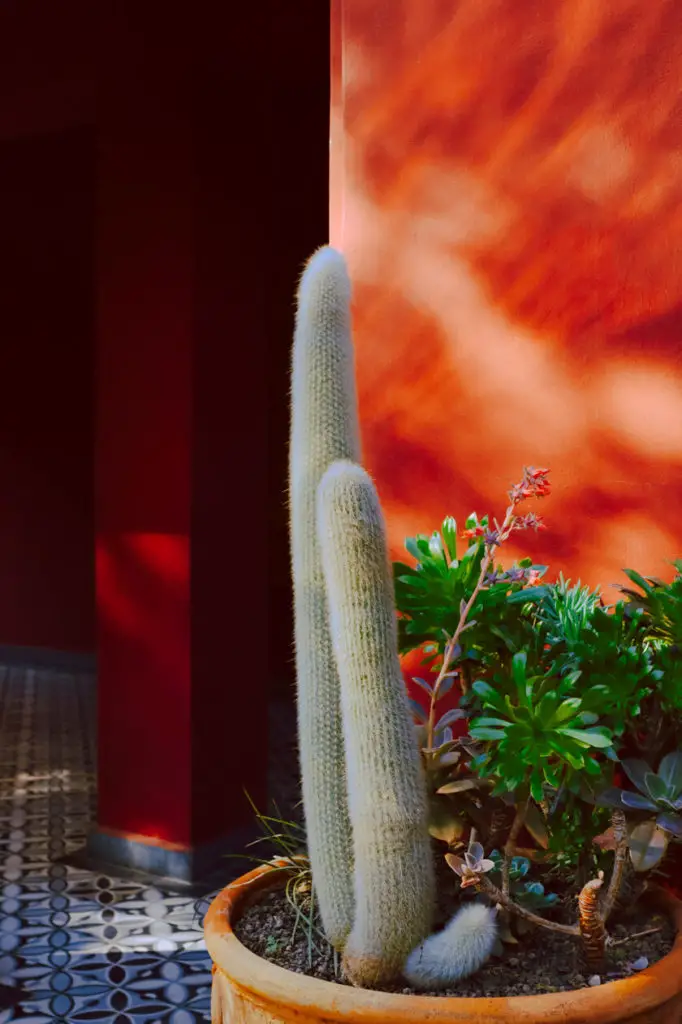
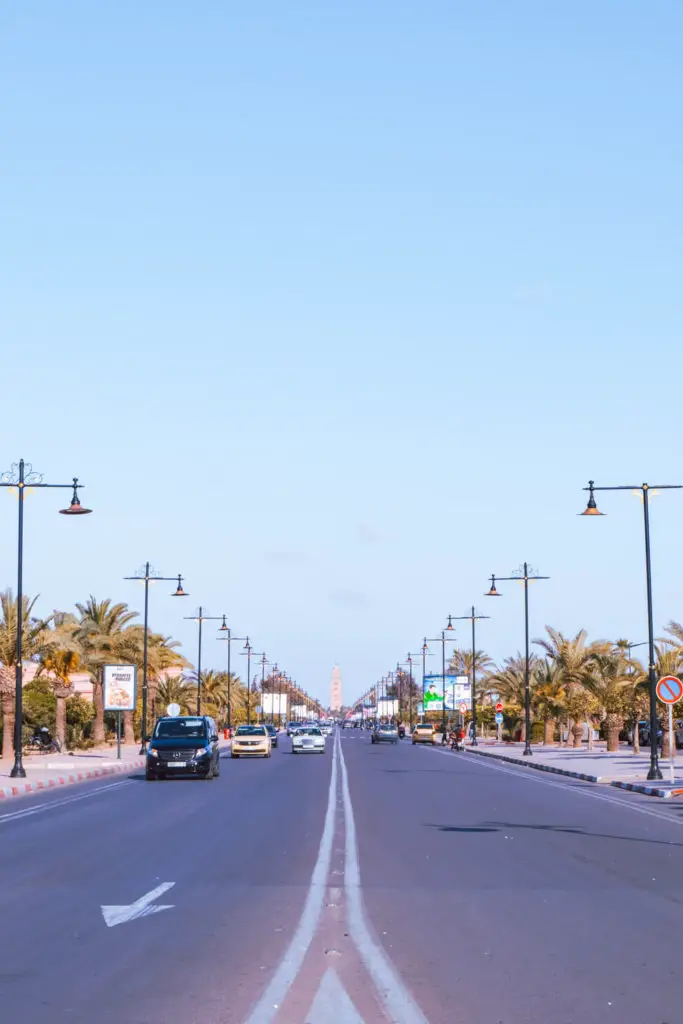
The shuttle bus operates from 6 am to 11 pm, with a frequency of 20 minutes (on weekends it may take longer). Travel time to the centre is on average around 40 minutes and costs 30 MAD (~2.85€).
Option 2: normal bus
There is also a cheaper option with the city bus lines (tickets cost just 4 MAD, 0,38€). You can check the most up-to-date information about the buses that connect Marrakech airport to the city centre.
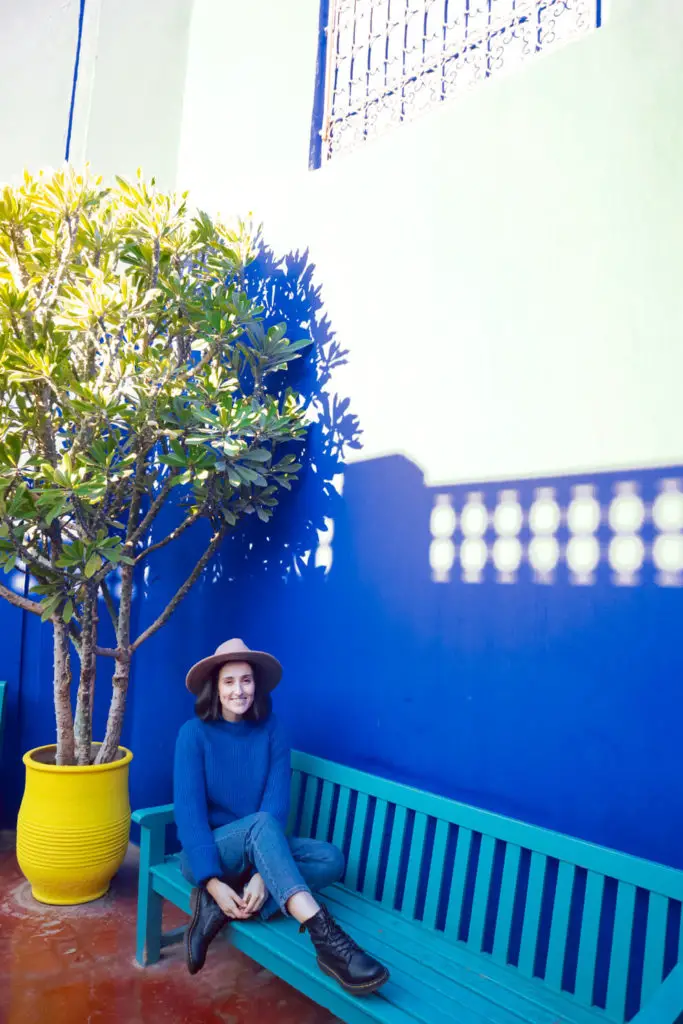
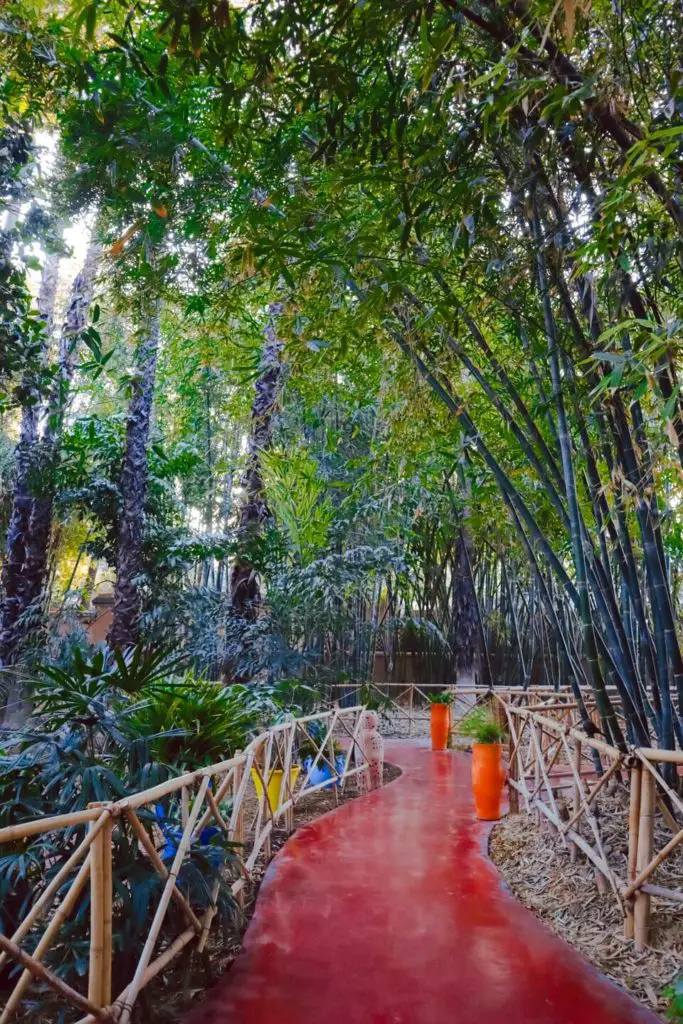
Option 3: taxi or transfer
In Marrakech, it can be a good idea to opt for a taxi or private transfer (especially if you arrive in the city at night). Wandering the streets of the city (especially inside the medina) at night can be a little scary the first time.
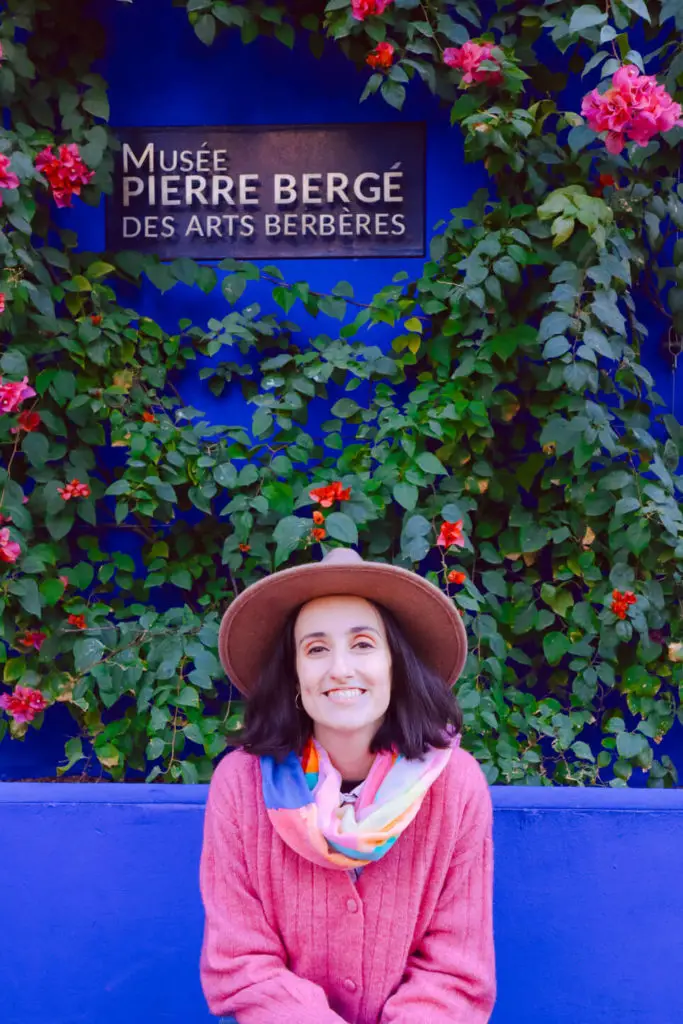
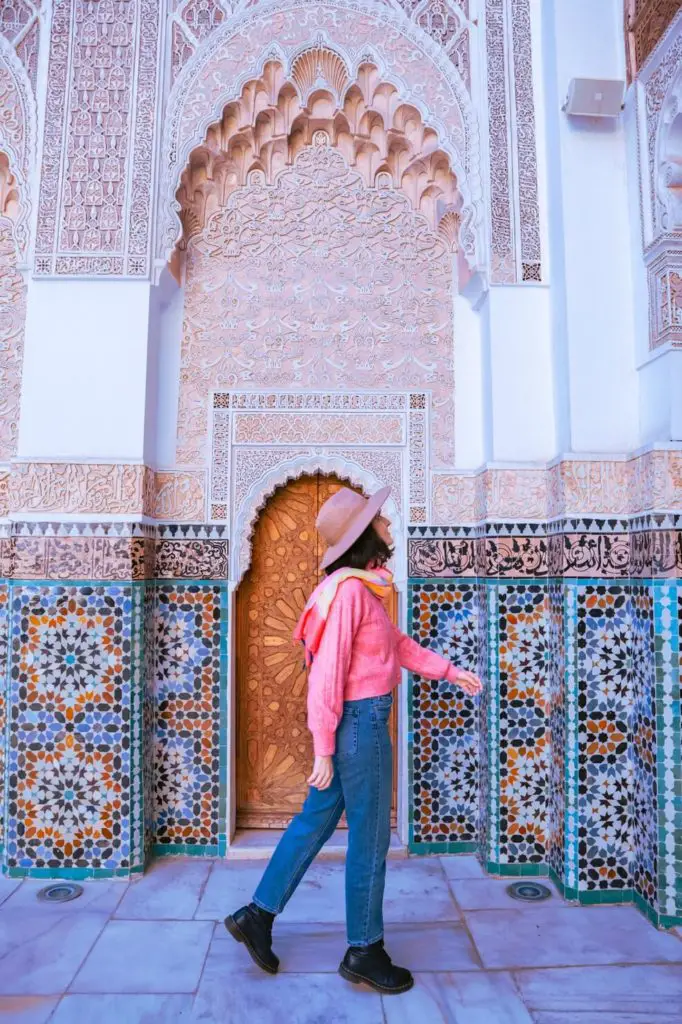
The journey from the airport to the city centre by car takes about 15–20 minutes. There are two types of taxis in the city:
- Petit Taxis (carry up to 3 people and only circulate within the city limits)
- Grand Taxis (take more people and to more remote areas of the city)
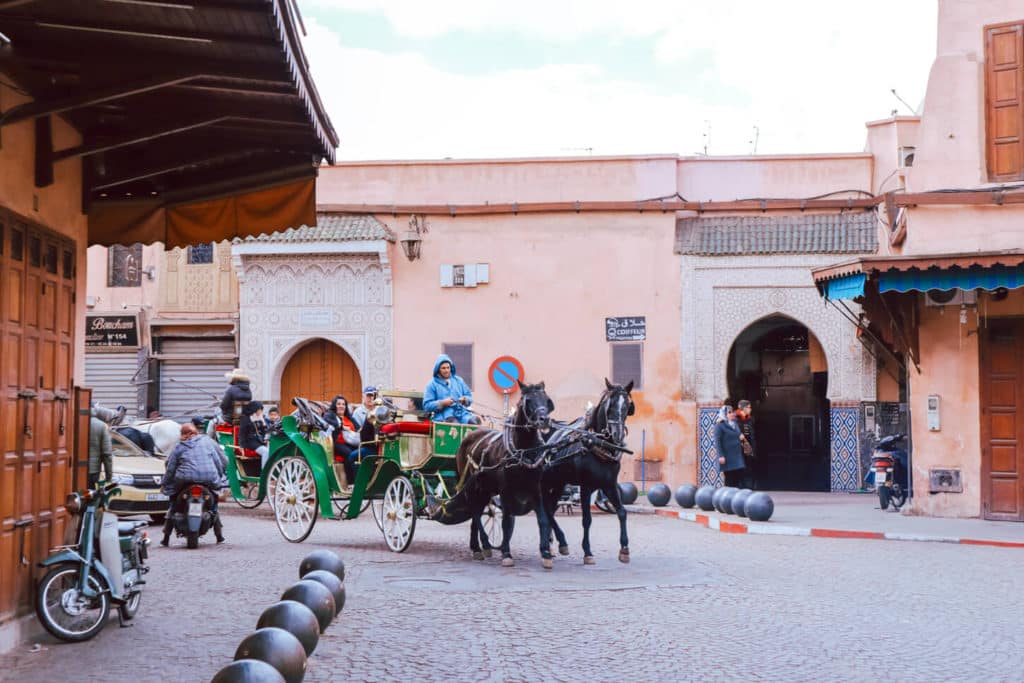
Morocco is a country known for bargaining on all prices and taxis are, of course, no exception. On average, a Petit Taxi can cost between 70 and 100 MAD (6,6€ – 9,5€) and a Grand Taxi between 100 and 150 MAD (9,5€ – 14,2€). So if you choose a taxi, take into account the standard fares.
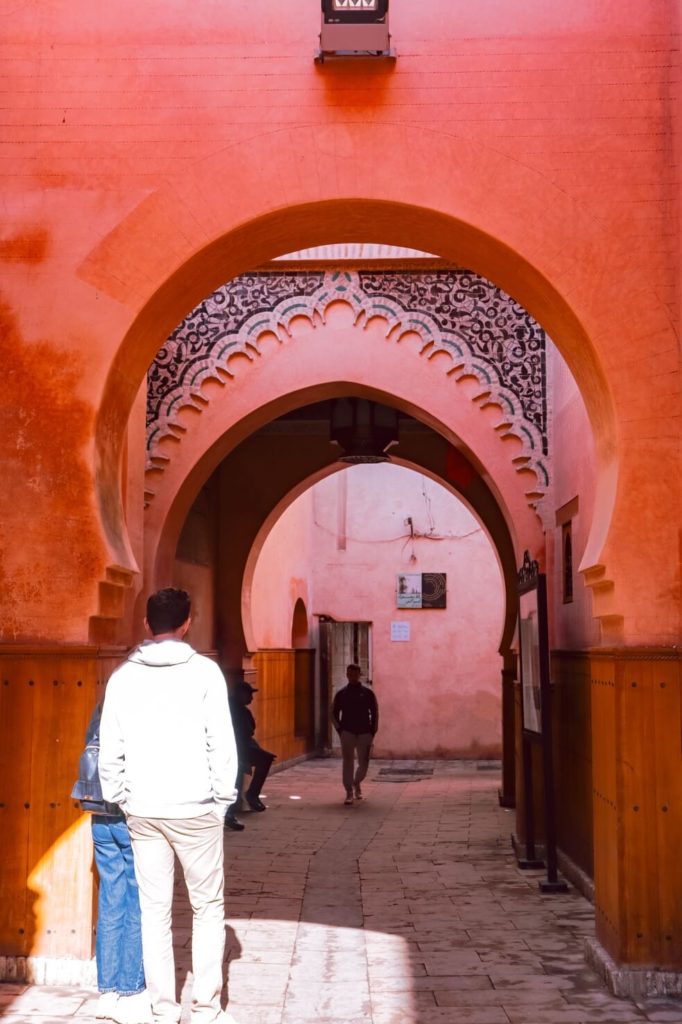
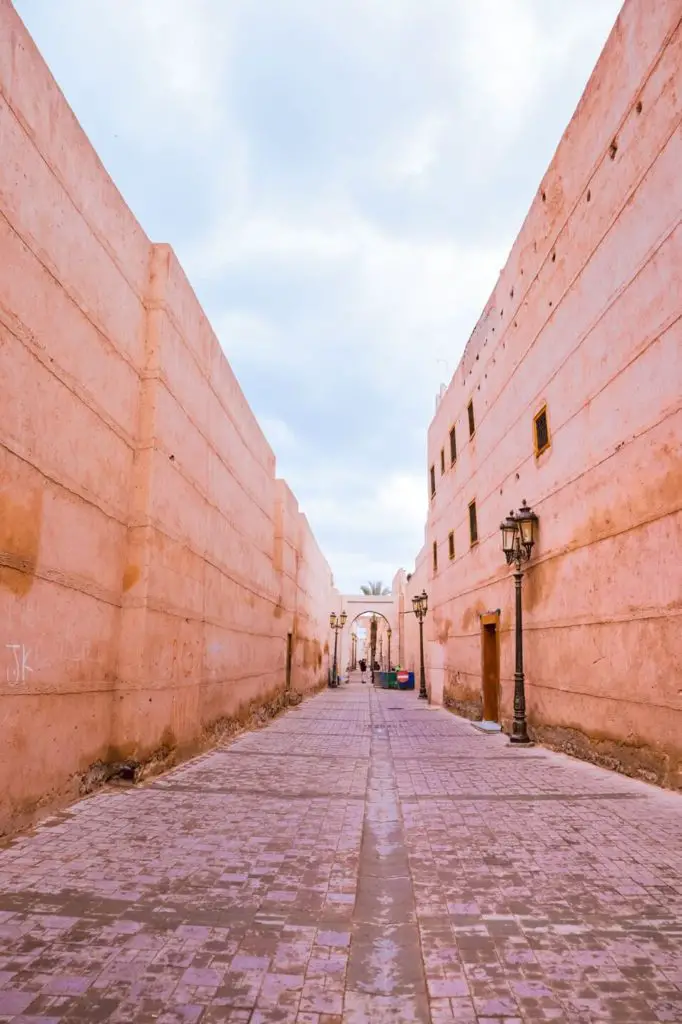
So, if you don’t want to get 100% into the chaos of Marrakech as soon as you land and don’t feel very comfortable negotiating, opt for private transfers. Plus, it’s a stress-free option since you can book in advance. You can take a look, for example, at the pick-up options available at Welcome Pickups.
💡 EXTRA TIP: If you choose to stay in the medina, be aware that some streets are not accessible by car. The transfer may have to drop you off at the nearest place where the car can circulate.
How to pay in Marrakech?
The official currency in Morocco is the Moroccan dirham (MAD). In November 2024, the exchange rate was 1€ = 10,5 MAD. Many of the shops/restaurants in Marrakech do not accept card payments.
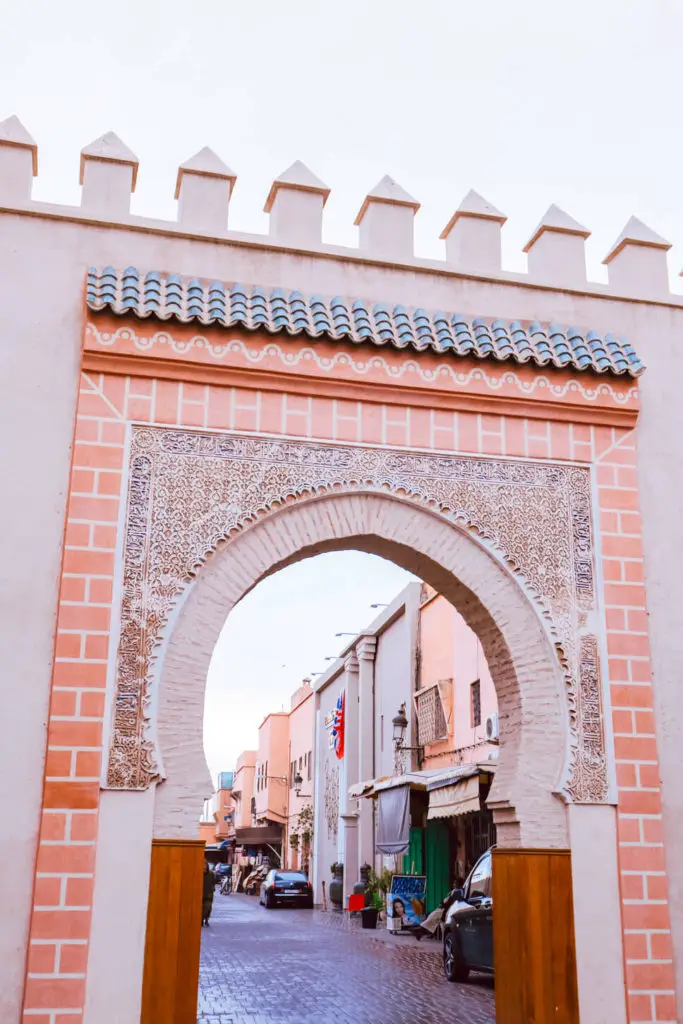
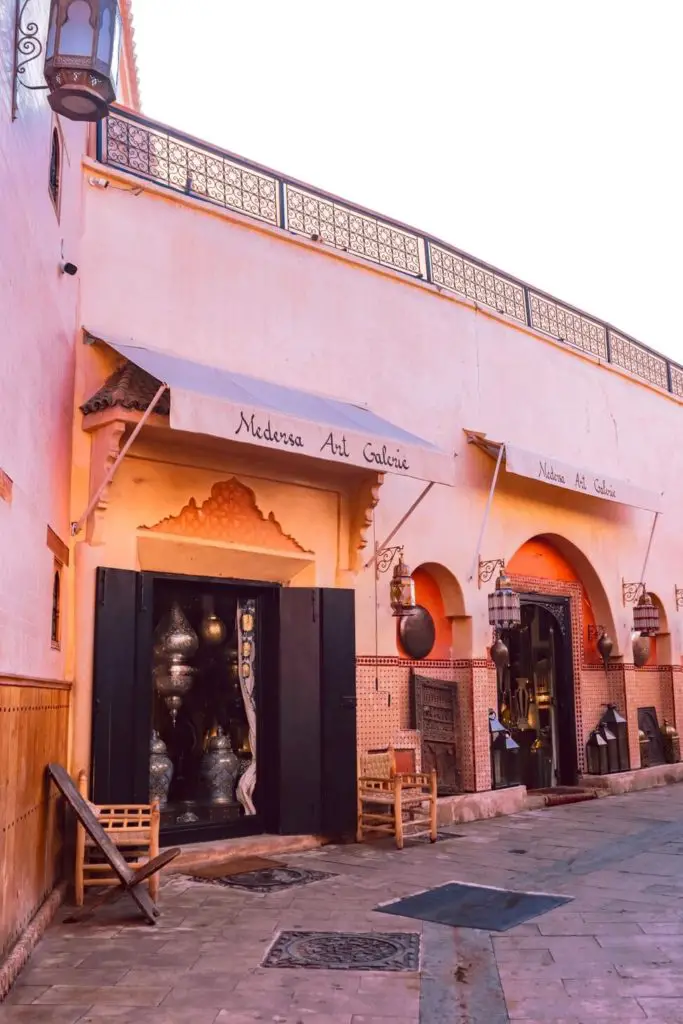
I suggest, then, withdrawing money at the first available opportunity and always carrying cash. Although some places accept euros, pay attention to the exchange rate, as it is rarely favourable.
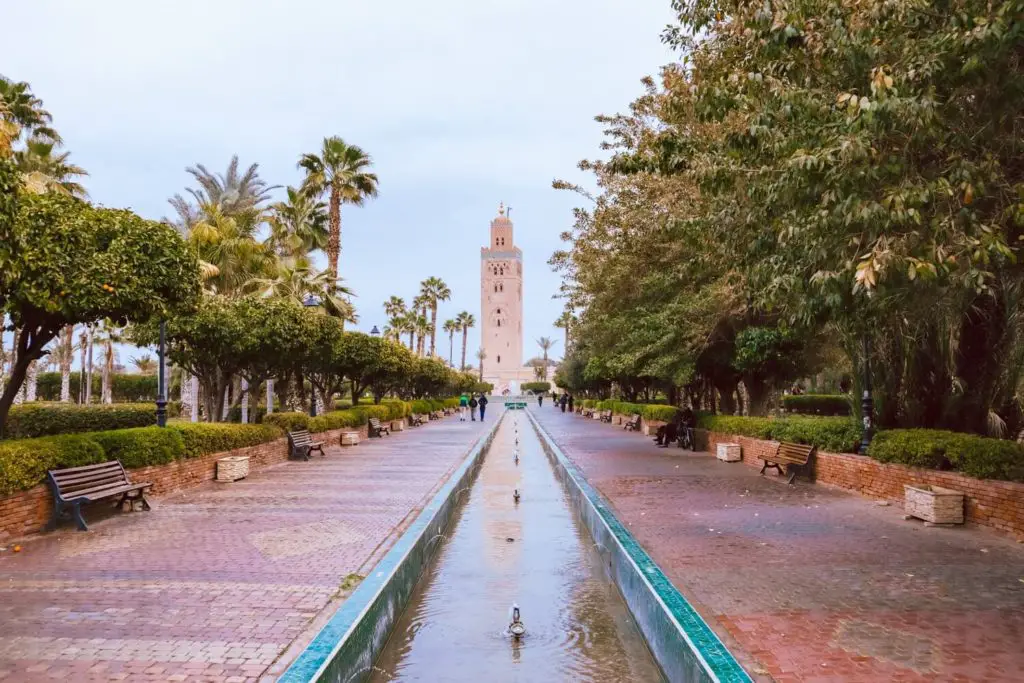
To avoid paying fees when withdrawing money or paying with a card in a currency other than your own, I suggest you use the Revolut card. This card has become my best friend while travelling, saving me a lot of money on fees whenever I travel to countries with currencies other than the Euro.
💡 EXTRA TIP: Read more about Revolut’s main advantages and how it works.
I didn’t pay any fees when withdrawing money with my Revolut card at Al Barid Bank (January 2023). You’ll find at least three of their ATMs conveniently located around Jemaa el-Fna Square.
How to have internet in Marrakech?
If you would like to have internet access at all times during your trip to Marrakech, I suggest you buy a local SIM card. Right at Marrakech airport, you’ll find two companies selling SIM cards: Orange and Inwi.
In both companies, they asked for 20€ (in cash) for 20 GB (prices in January 2023). There is also a more expensive 30 GB option.
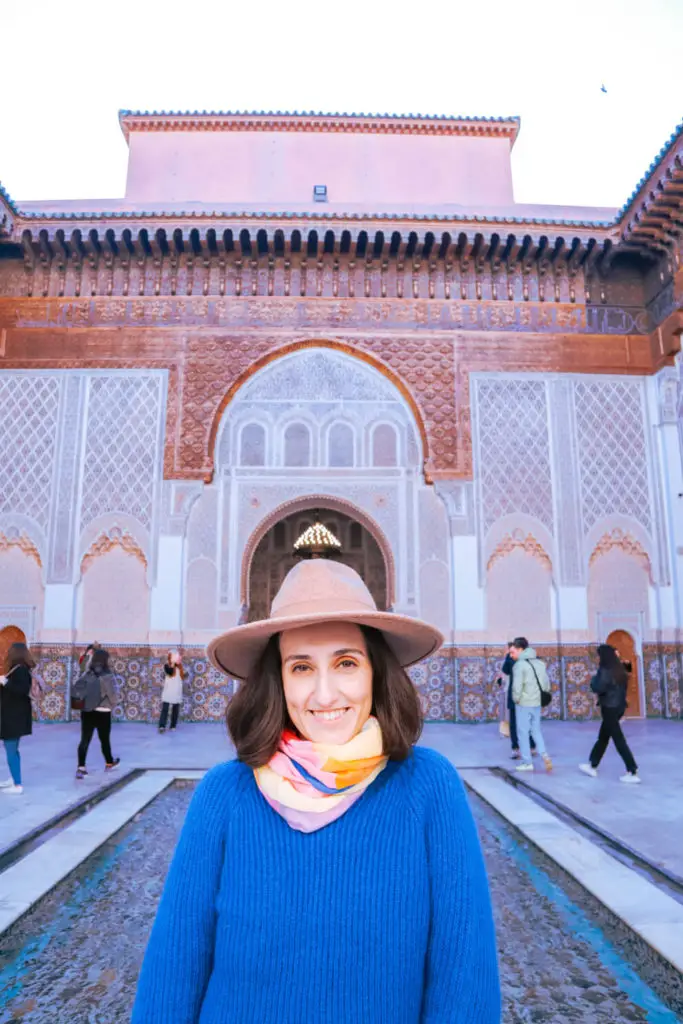
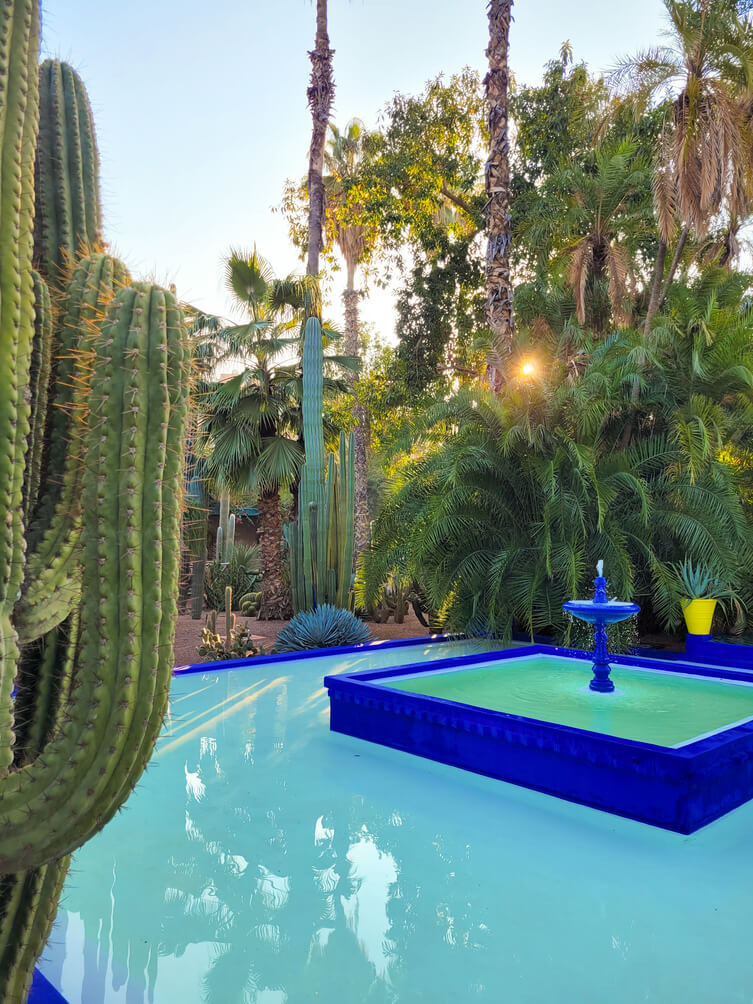
Is it safe to visit Marrakech?
I read and heard so many things about safety in Marrakech before my trip. However, to be completely honest, I didn’t feel any more insecure than I would in Portugal on some specific occasions (e.g. empty and dark streets at night).
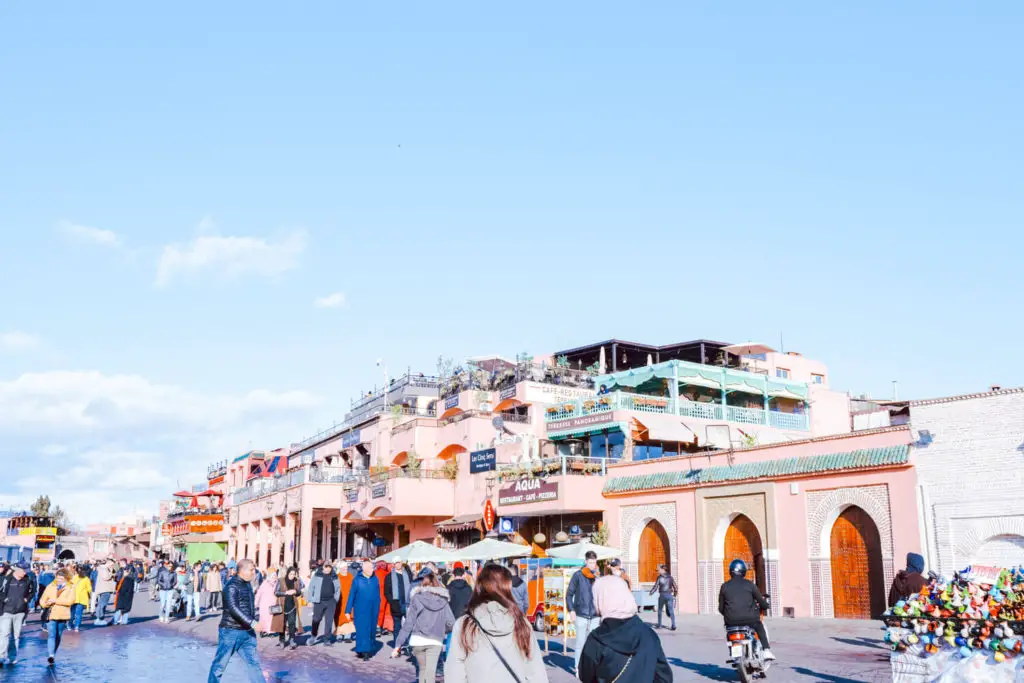
The truth is that I didn’t travel alone, which may have helped partially. However, I found it to be a quite safe city. It is very chaotic and we can be more easily tricked/stolen, but as long as we are alert, there’s nothing to fear 😉.
💡 EXTRA TIP: Some streets can get extremely crowded, making it easier for pickpocketing to occur. Stay extra vigilant with your belongings in these areas. Additionally, it’s common for locals to approach you, claiming you’re heading in the wrong direction, often as a way to lead you to a friend or family member’s shop. In such cases, a simple “thank you” and continuing on your way is all that’s needed.
Best Day Trips from Marrakech
If you have more days in the city, you can explore some incredible places nearby that are perfect for a day trip from Marrakech. These destinations offer a chance to experience Morocco’s diverse landscapes, from stunning waterfalls to historic towns.
I personally visited the Ouzoud Waterfalls on a day trip and loved it! The breathtaking waterfall, lush surroundings, and peaceful atmosphere made it an unforgettable experience.
Here are some of the best day trips you can take from Marrakech:
- Ouzoud Waterfalls (150 km / ~2.5 hours): A stunning natural escape with waterfalls and lush greenery (book a full-day tour to Ouzoud Waterfalls).
- Essaouira (190 km / ~3 hours): A charming coastal town known for its laid-back vibe, historic medina, and fresh seafood (book your full-day trip to Essaouira from Marrakech)
- Aït Ben Haddou (180 km / ~3.5 hours): A UNESCO-listed fortified village famous for its unique architecture and as a filming location for many movies (book your day trip to Aït Ben Haddou)
- Agafay Desert (40 km / ~1 hour): A rocky desert offering camel rides, quad biking, and an otherworldly landscape close to Marrakech (book a trip to Agafay Desert Sunset with Dinner and Show)
Each of these destinations offers a unique glimpse into Morocco’s beauty, making them well worth the trip!
Final Thoughts on Spending 2 Days in Marrakech
Two days in Marrakech might sound short, but they’re packed with a whirlwind of sensory delights. The city pulses with life, from the dazzling souks overflowing with treasures to the tranquil courtyards of palaces steeped in history.
Every moment, whether it’s admiring the intricate details of Bahia Palace or strolling through the colourful medina, reveals a new layer of Marrakech’s captivating charm.
This Marrakech 2-day itinerary is your key to unlocking the city’s magic, blending iconic landmarks with authentic experiences. Dive into the chaos, embrace the calm, and savour every flavour along the way.
Have you already explored Marrakech, or are you planning your first adventure here? Let me know your thoughts, tips, or even questions about this 2 days in Marrakech guide! I’d love to hear your stories or help you plan your perfect trip! 🌟
Disclaimer: this post may contain some affiliate links, which means I get a small commission if you buy something through my links. This doesn’t represent any additional cost to you and you’ll be supporting my work here on the blog😊

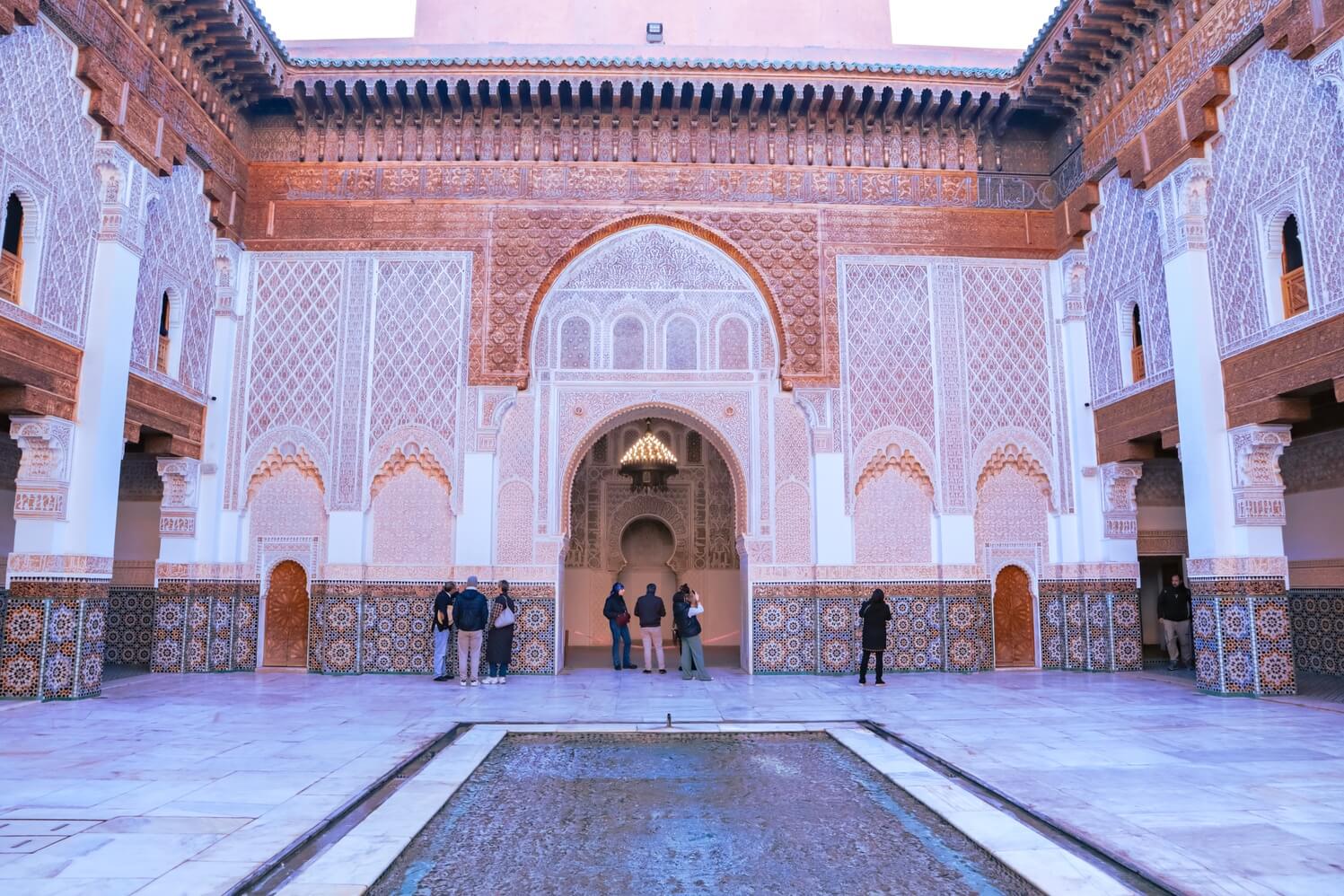
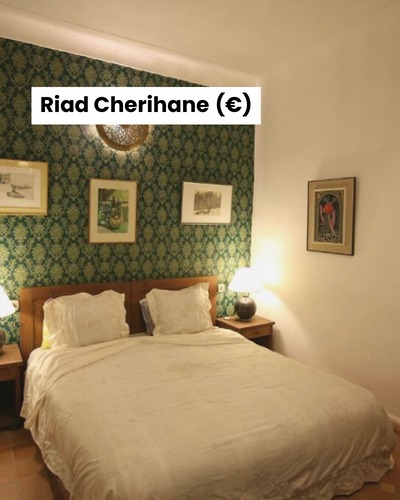
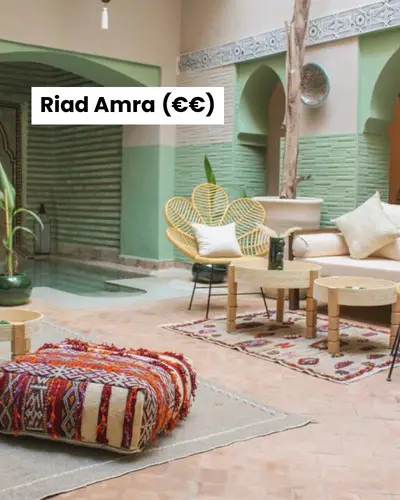
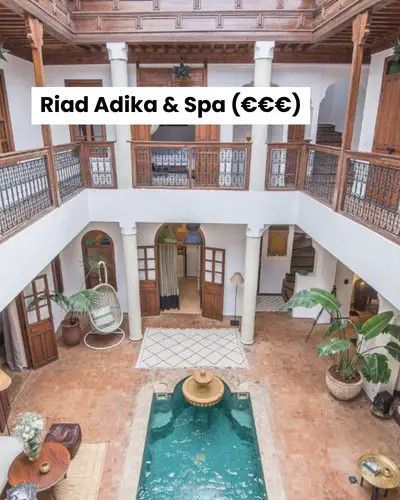





[…] Ouzoud waterfalls are the largest waterfalls in Morocco and one of the most popular day trips from Marrakech. The impressive photos I saw when I was preparing for my trip to Marrakech immediately made me want […]